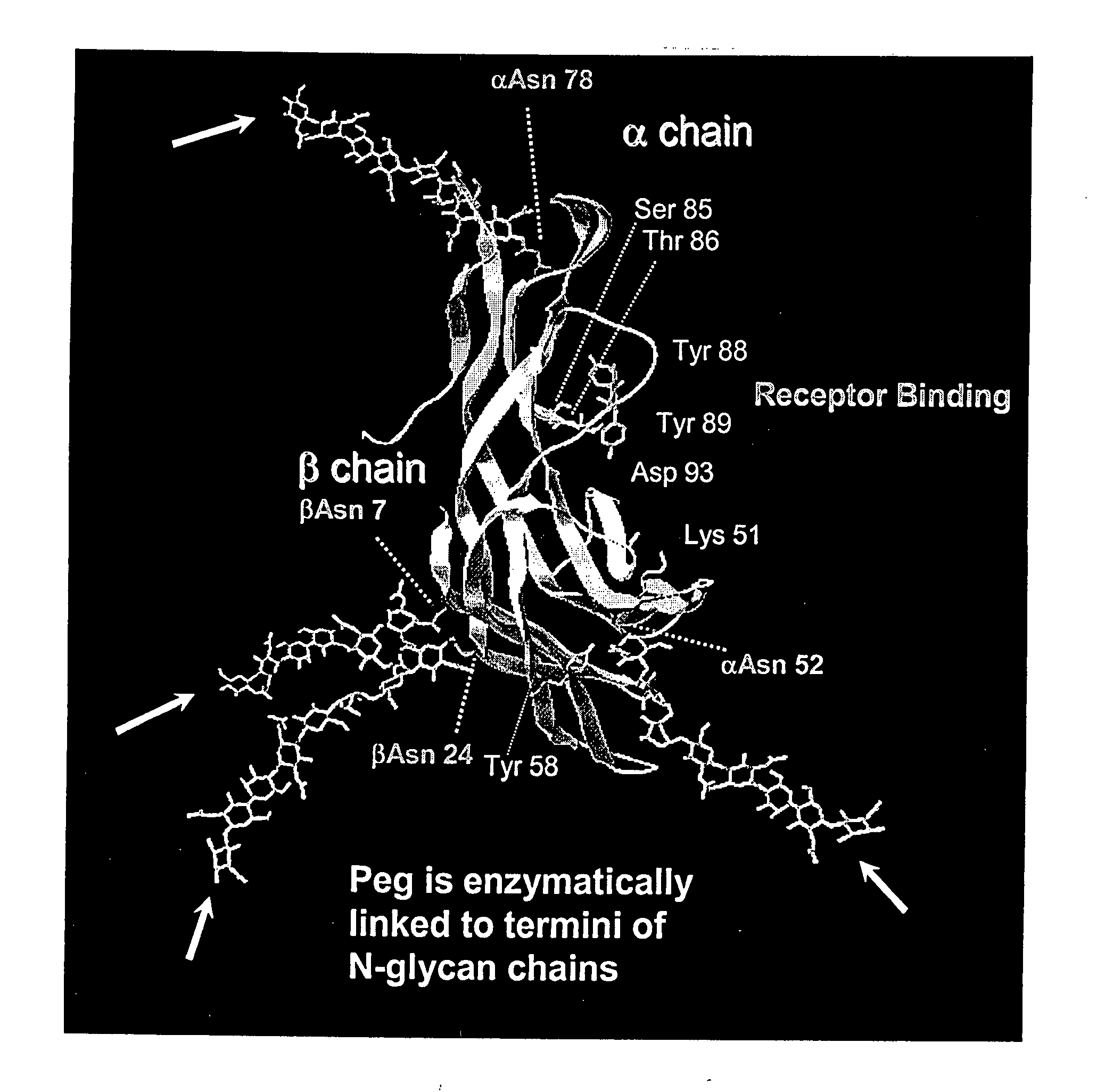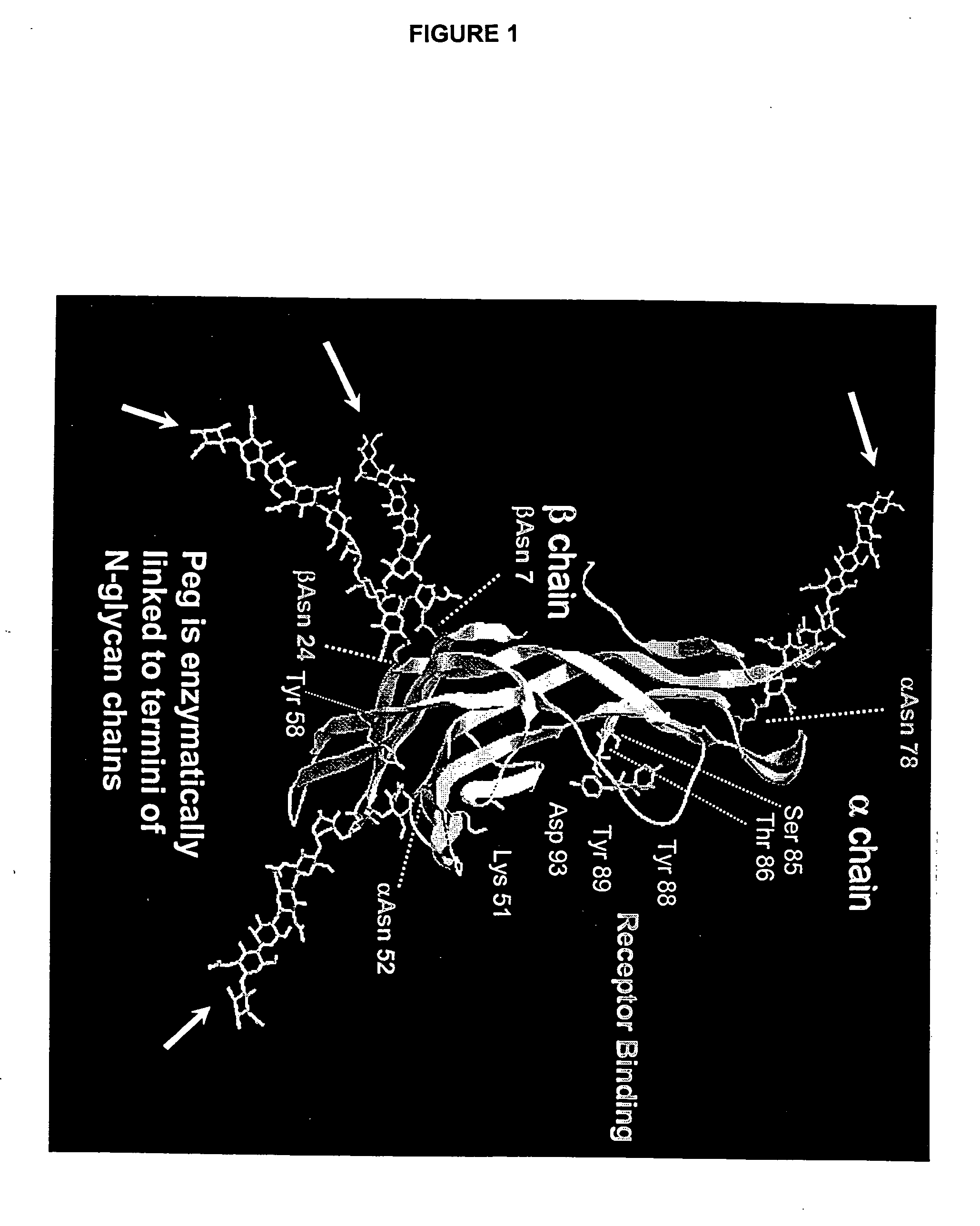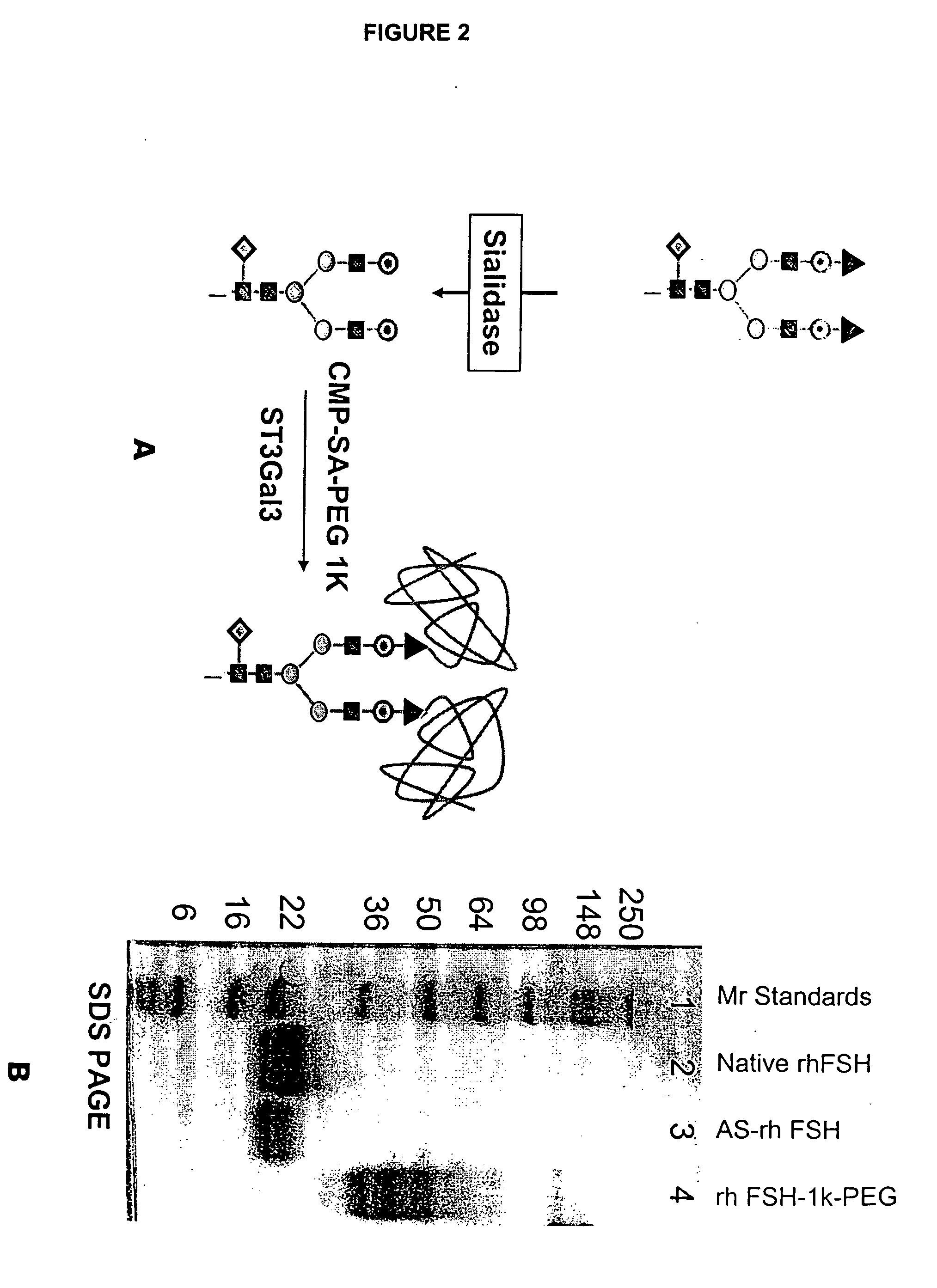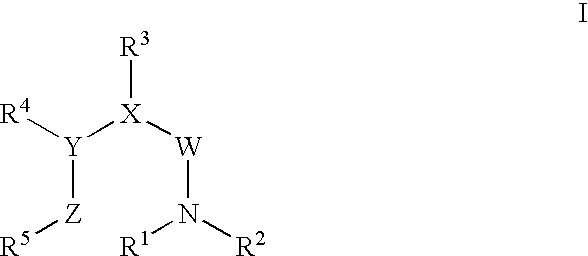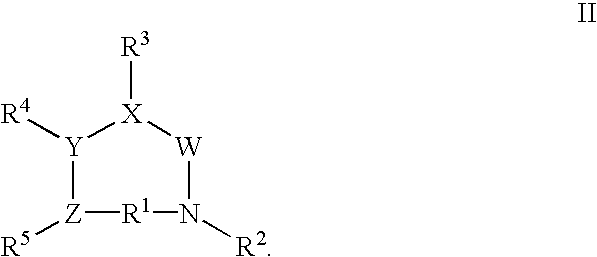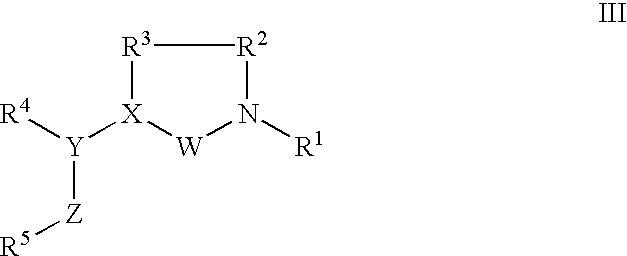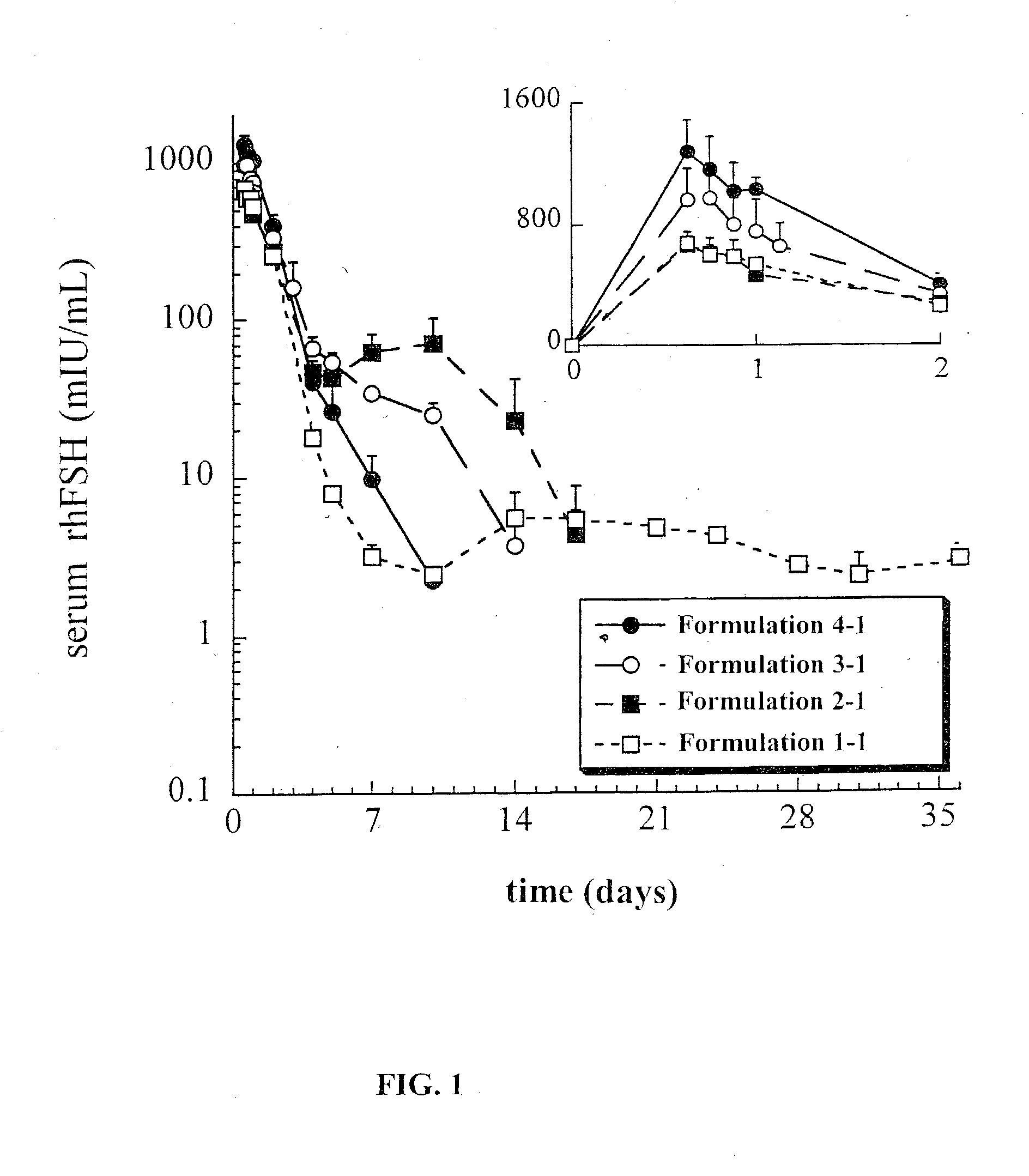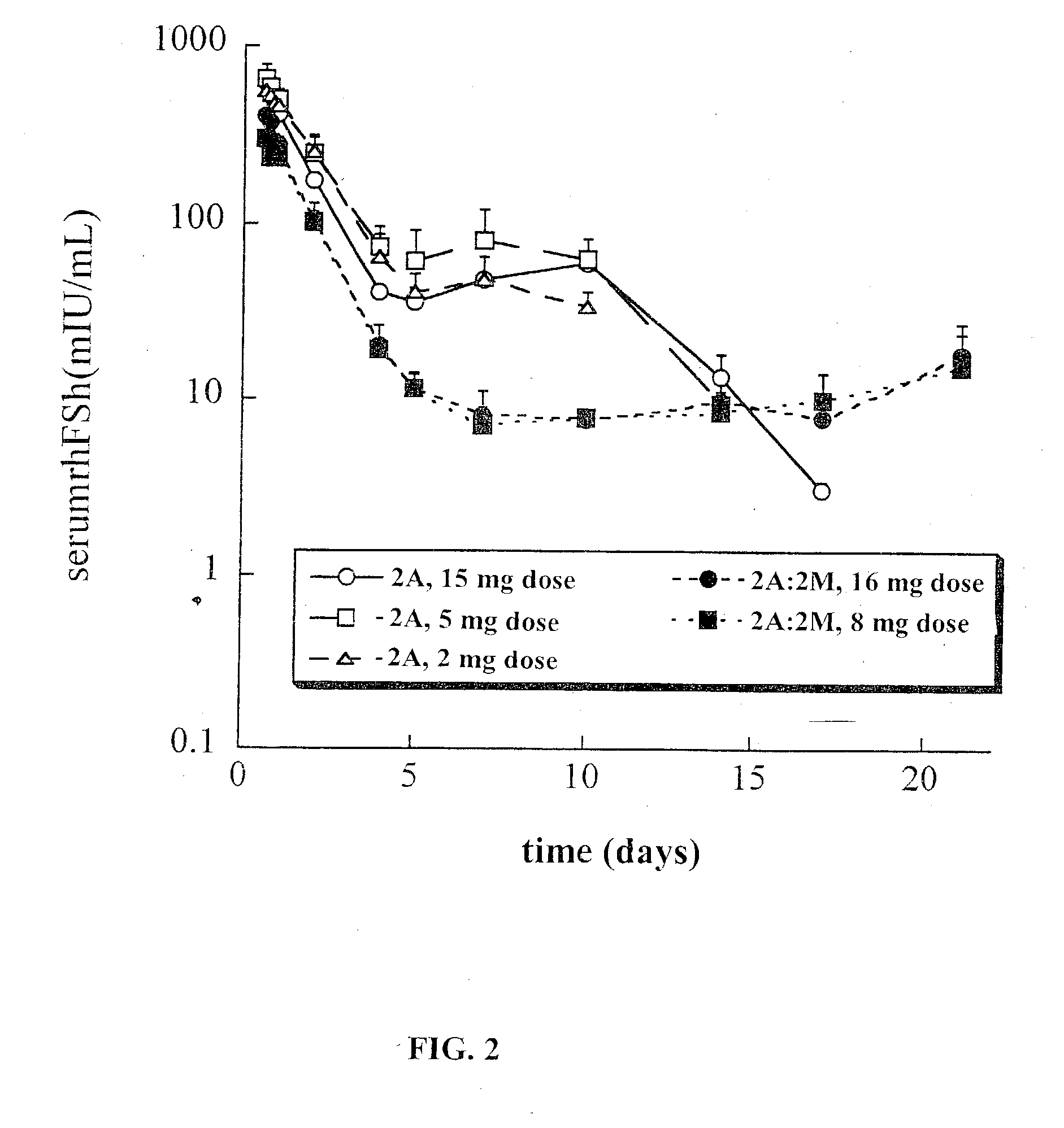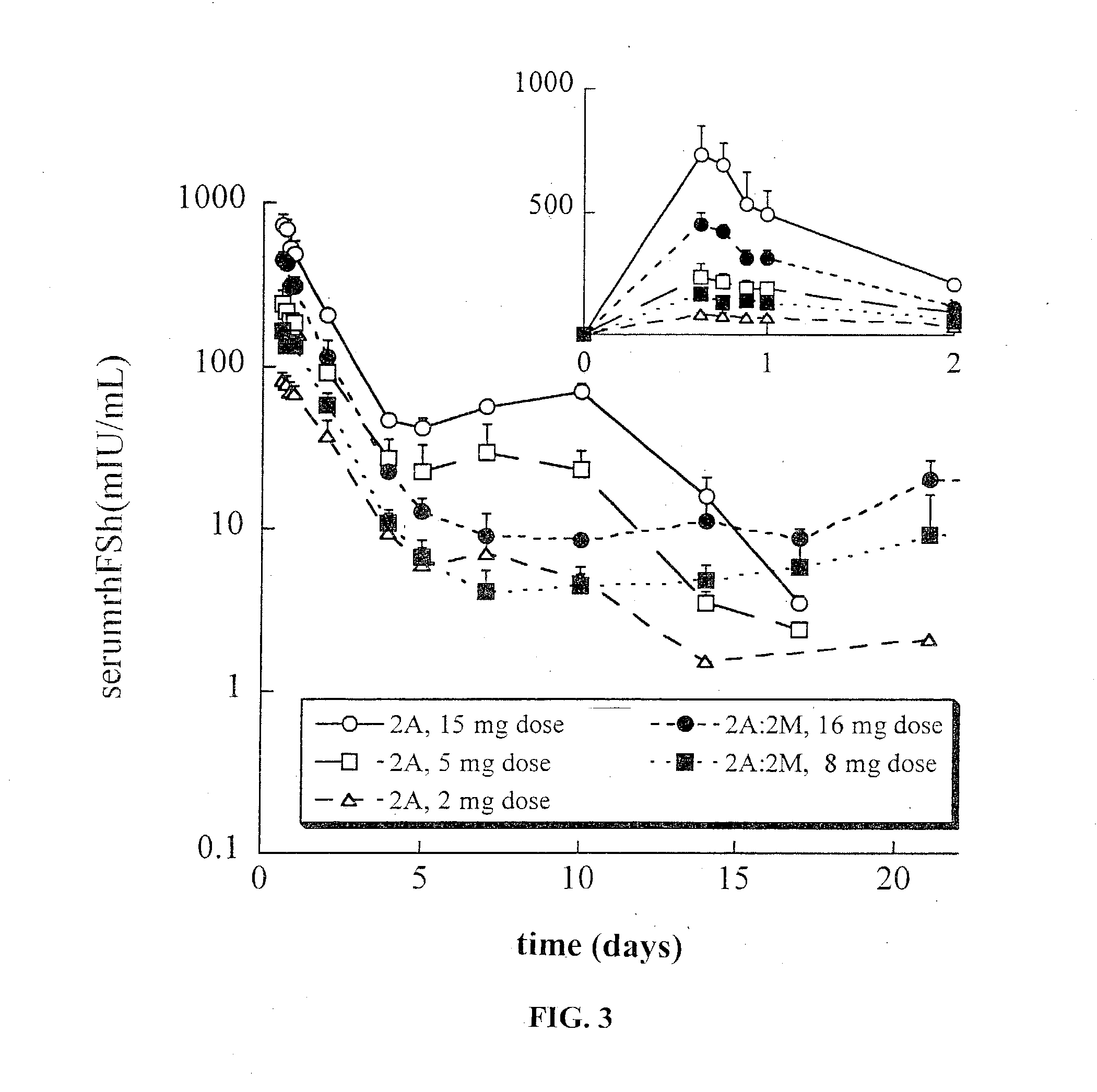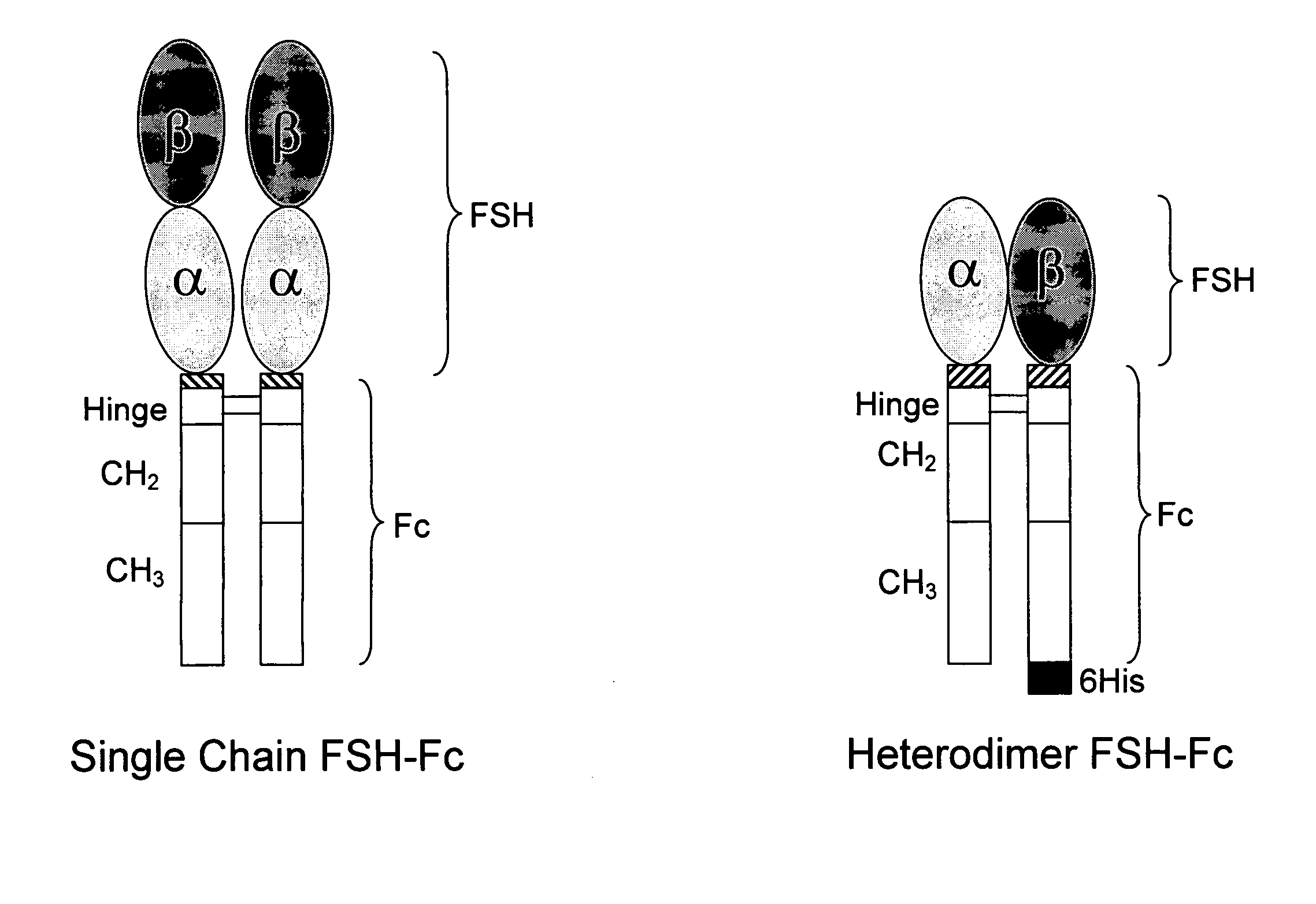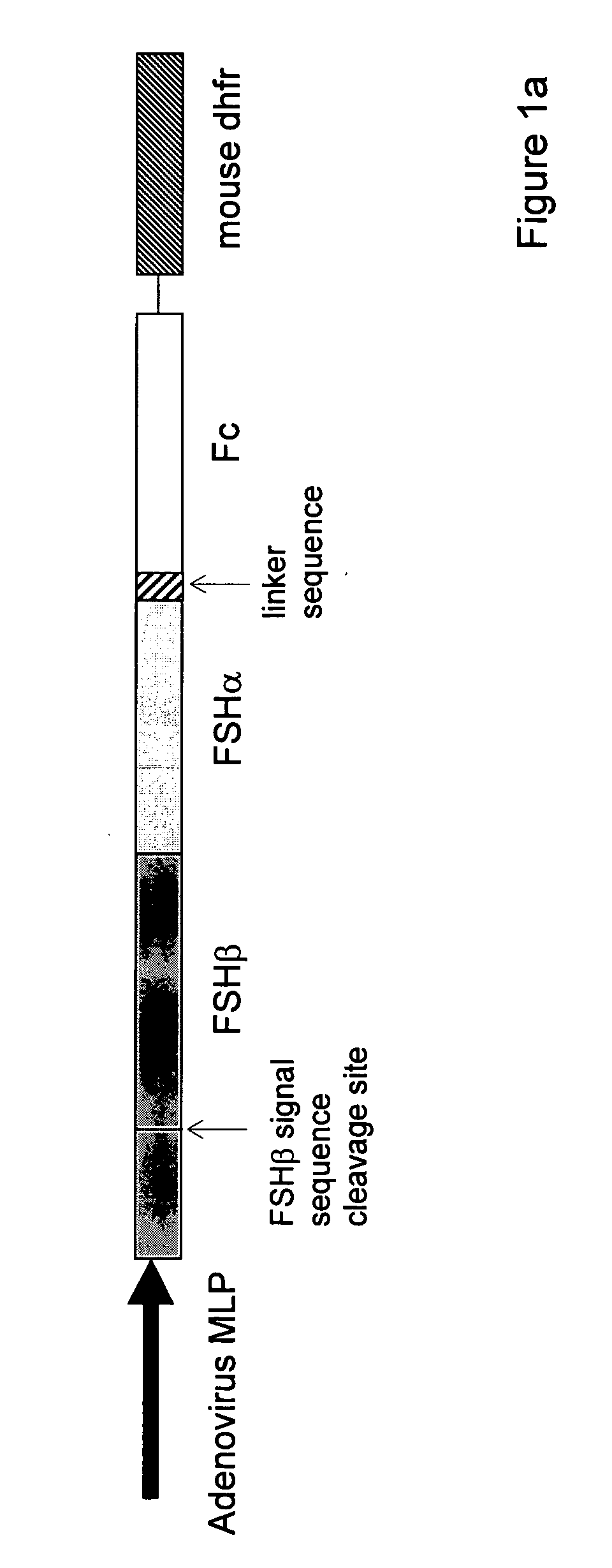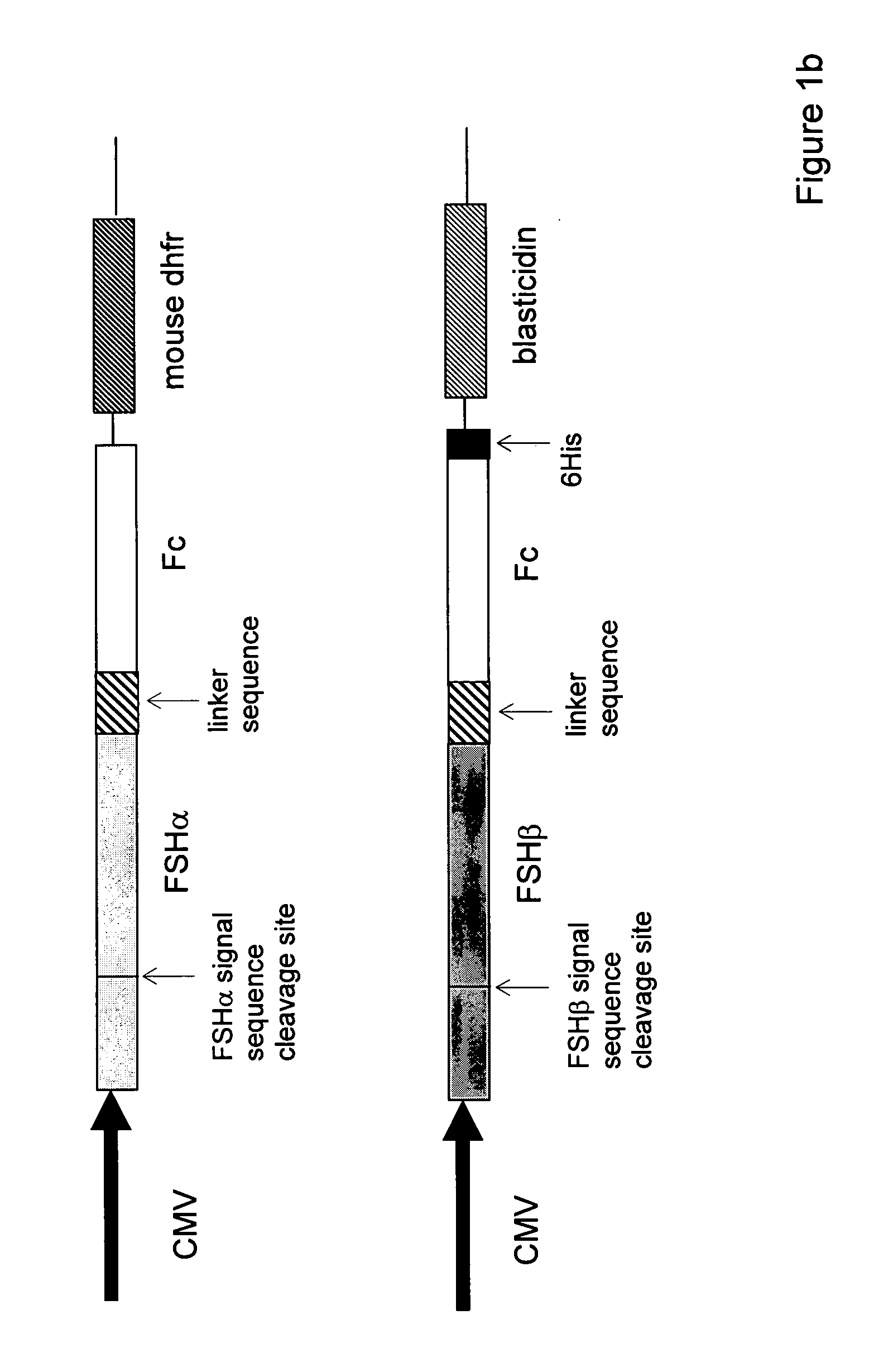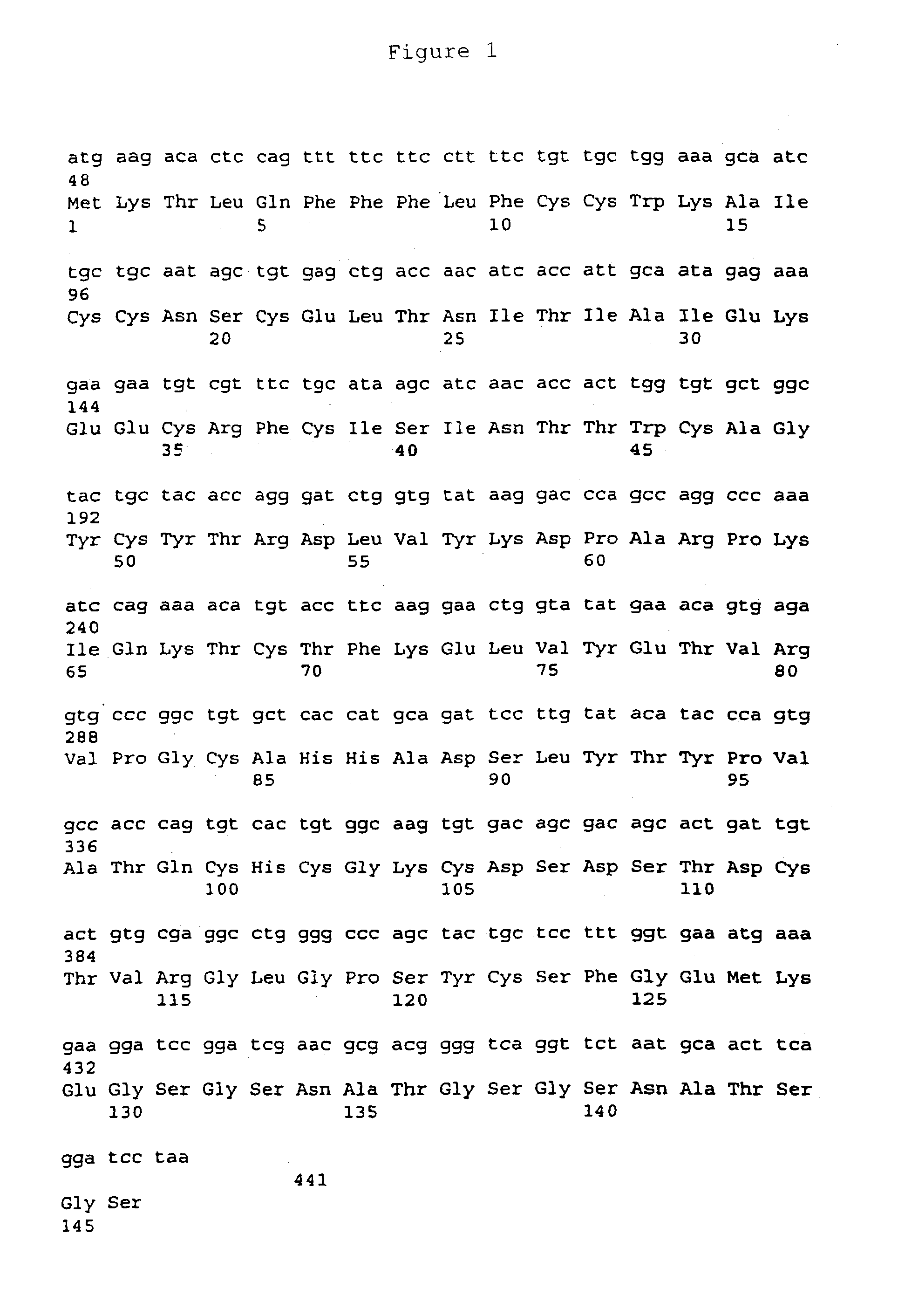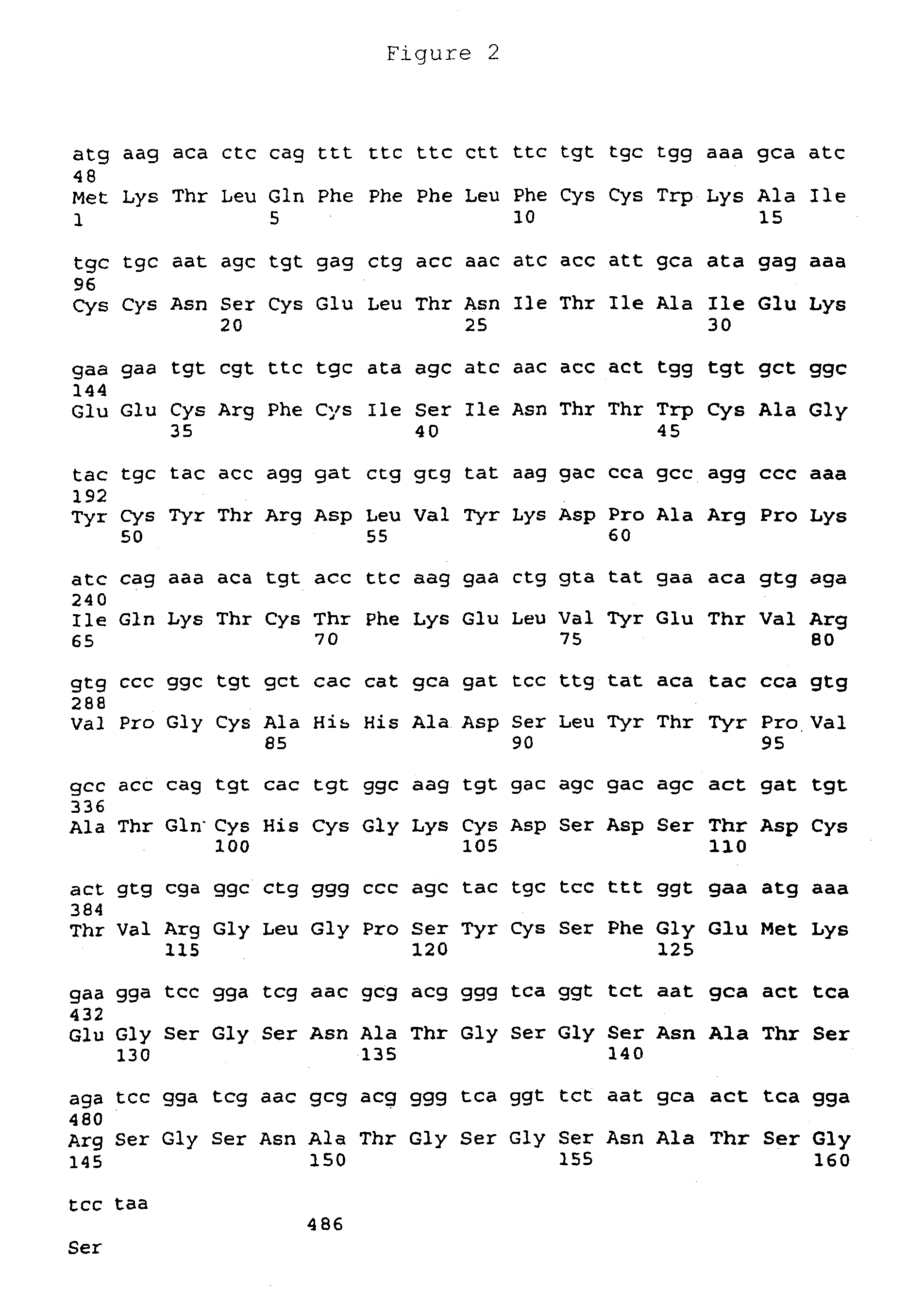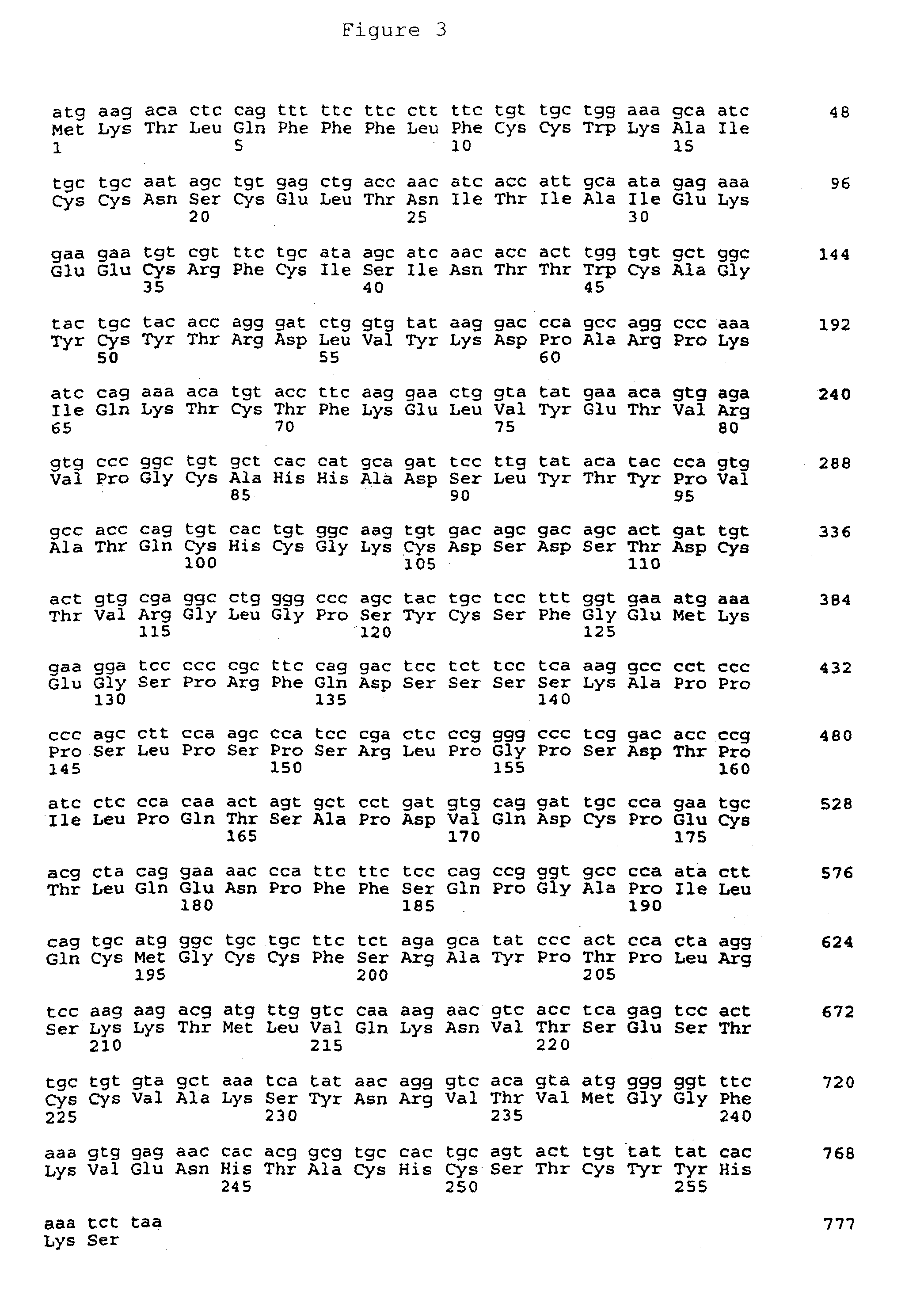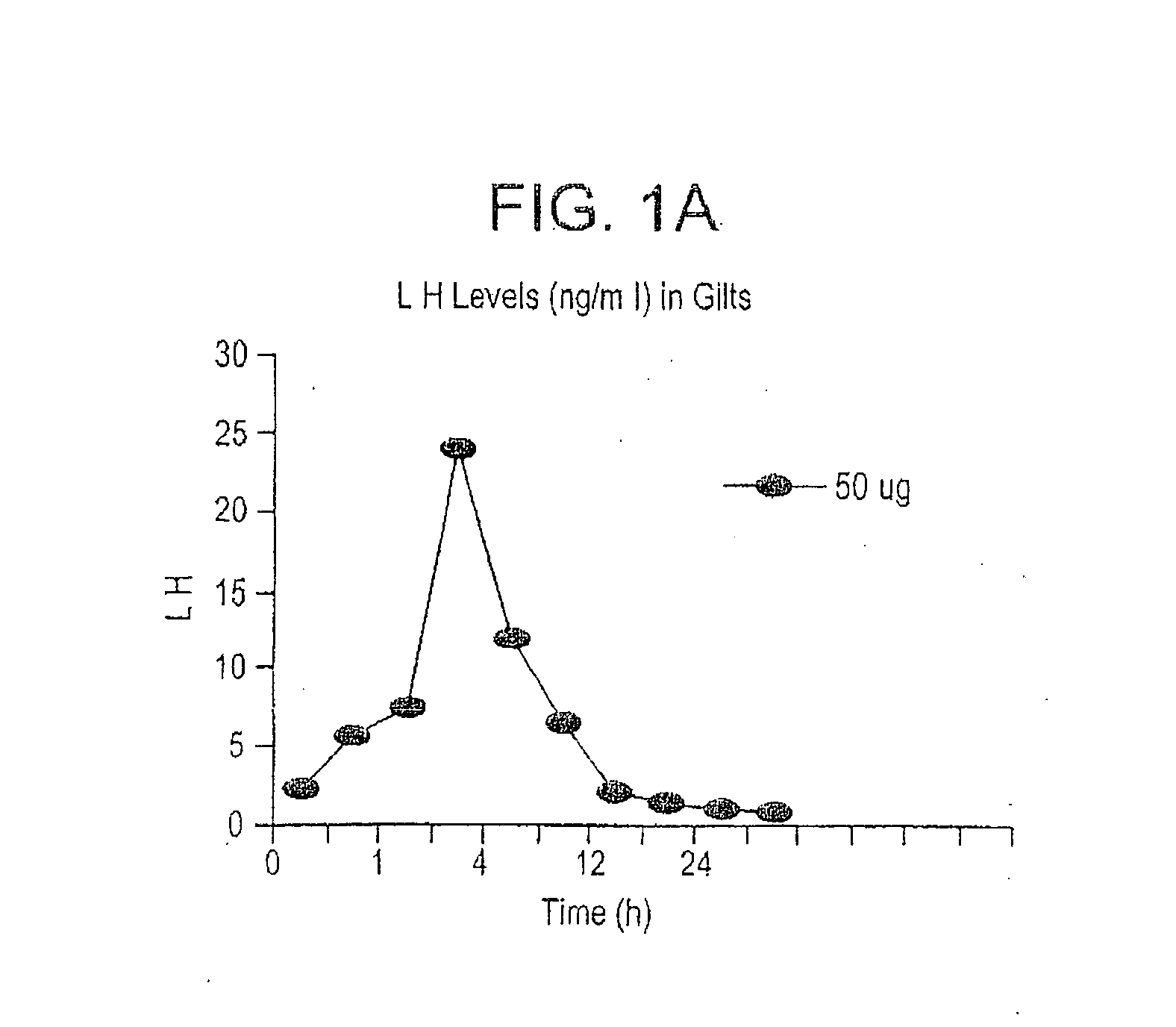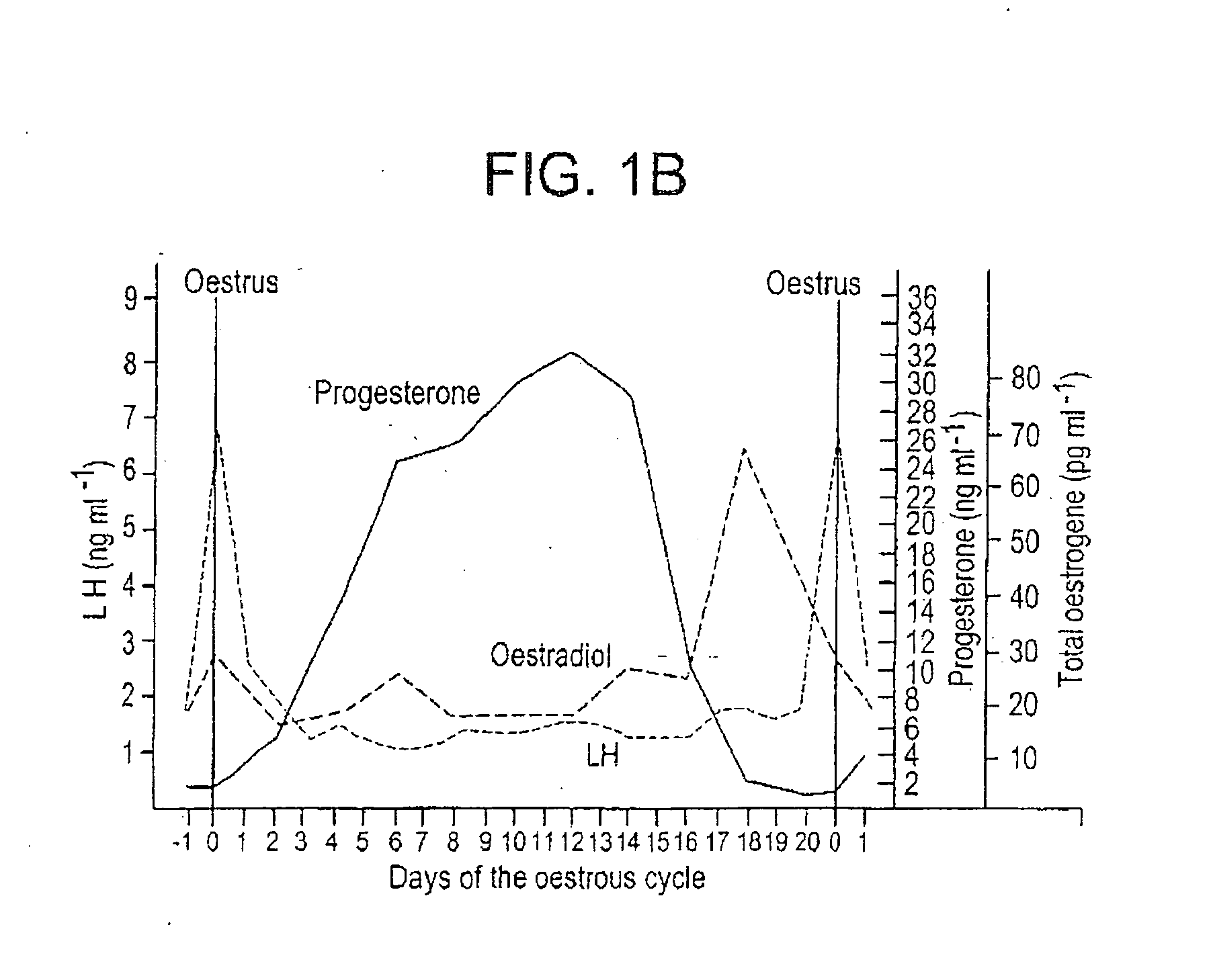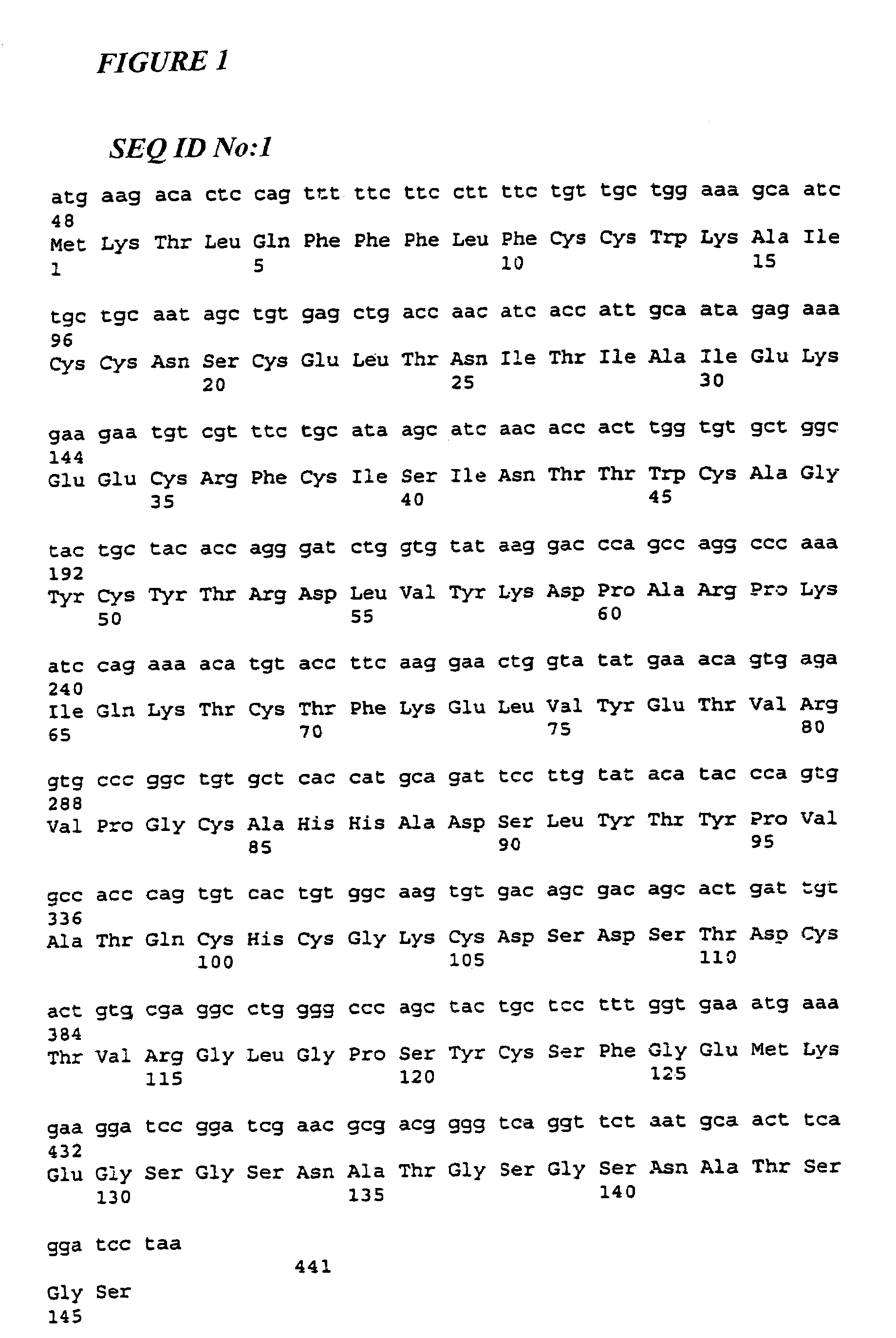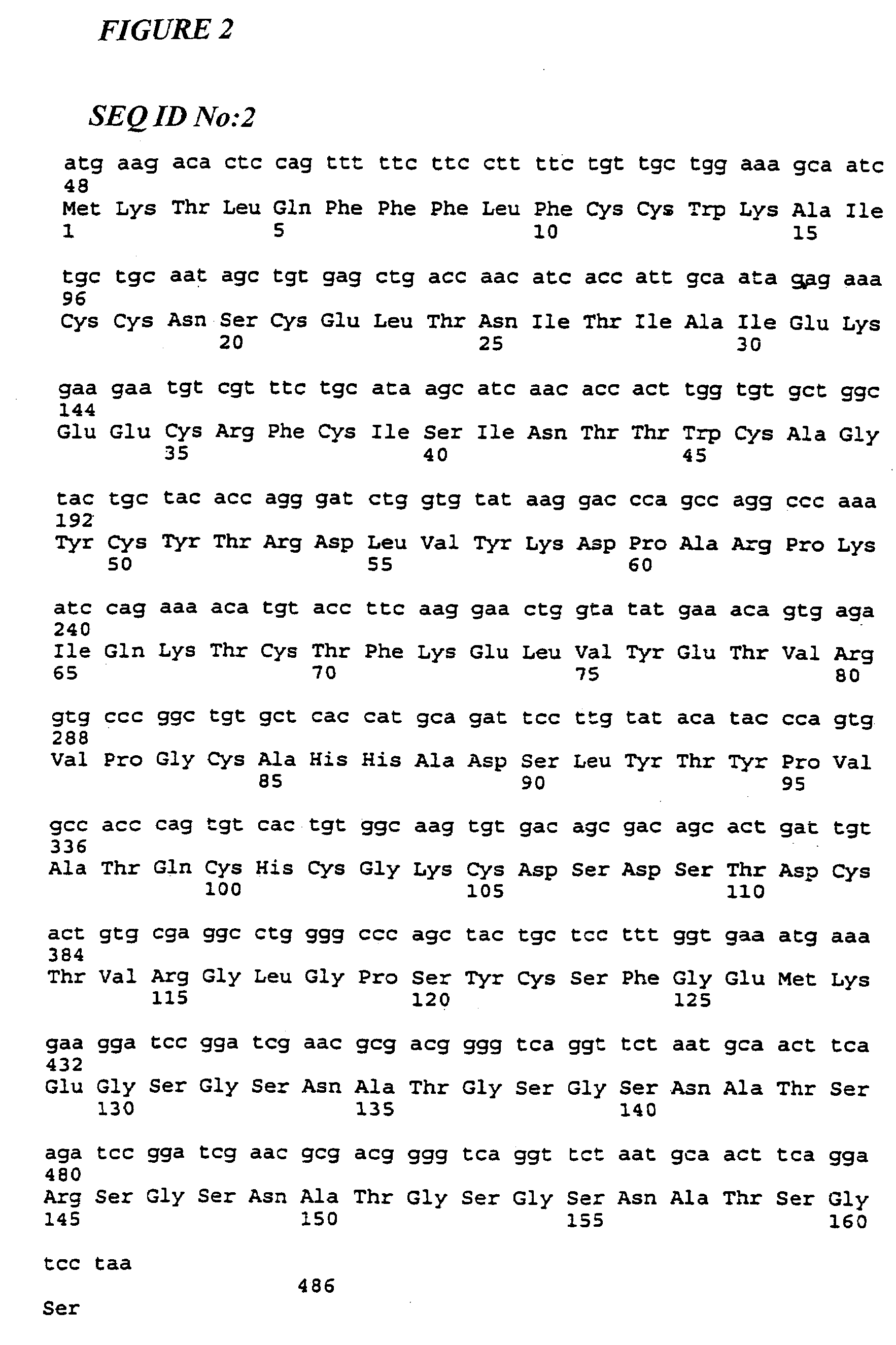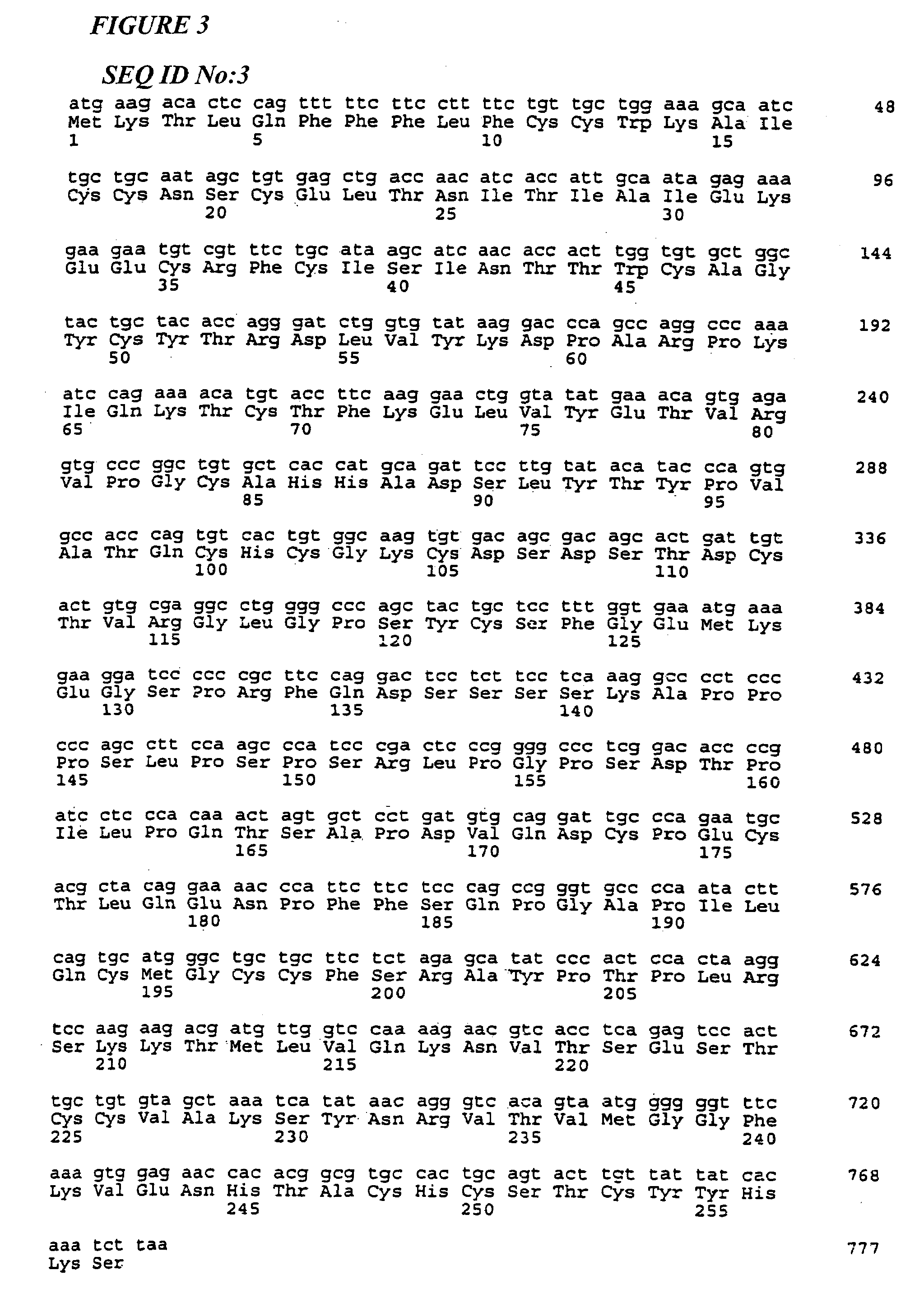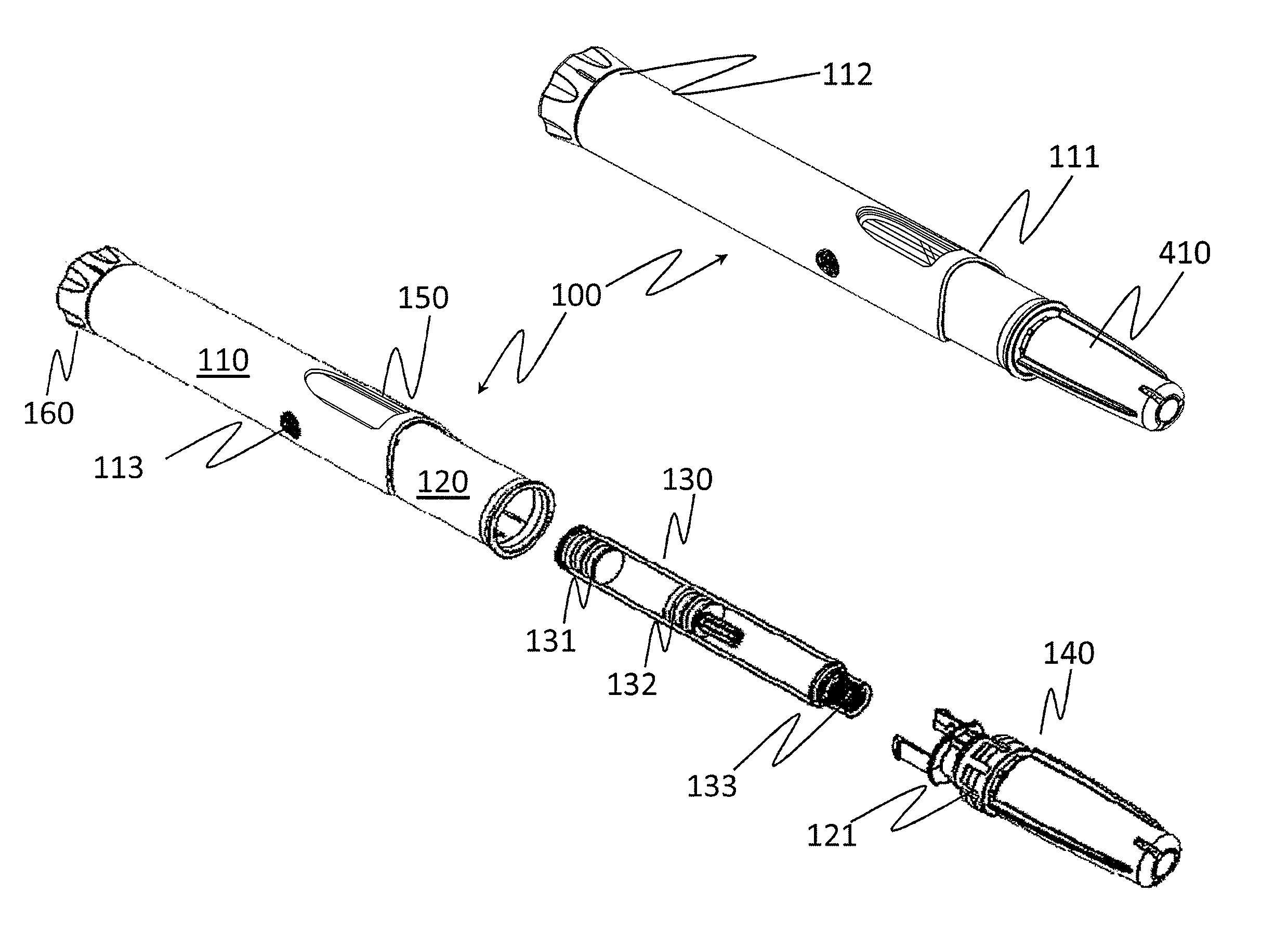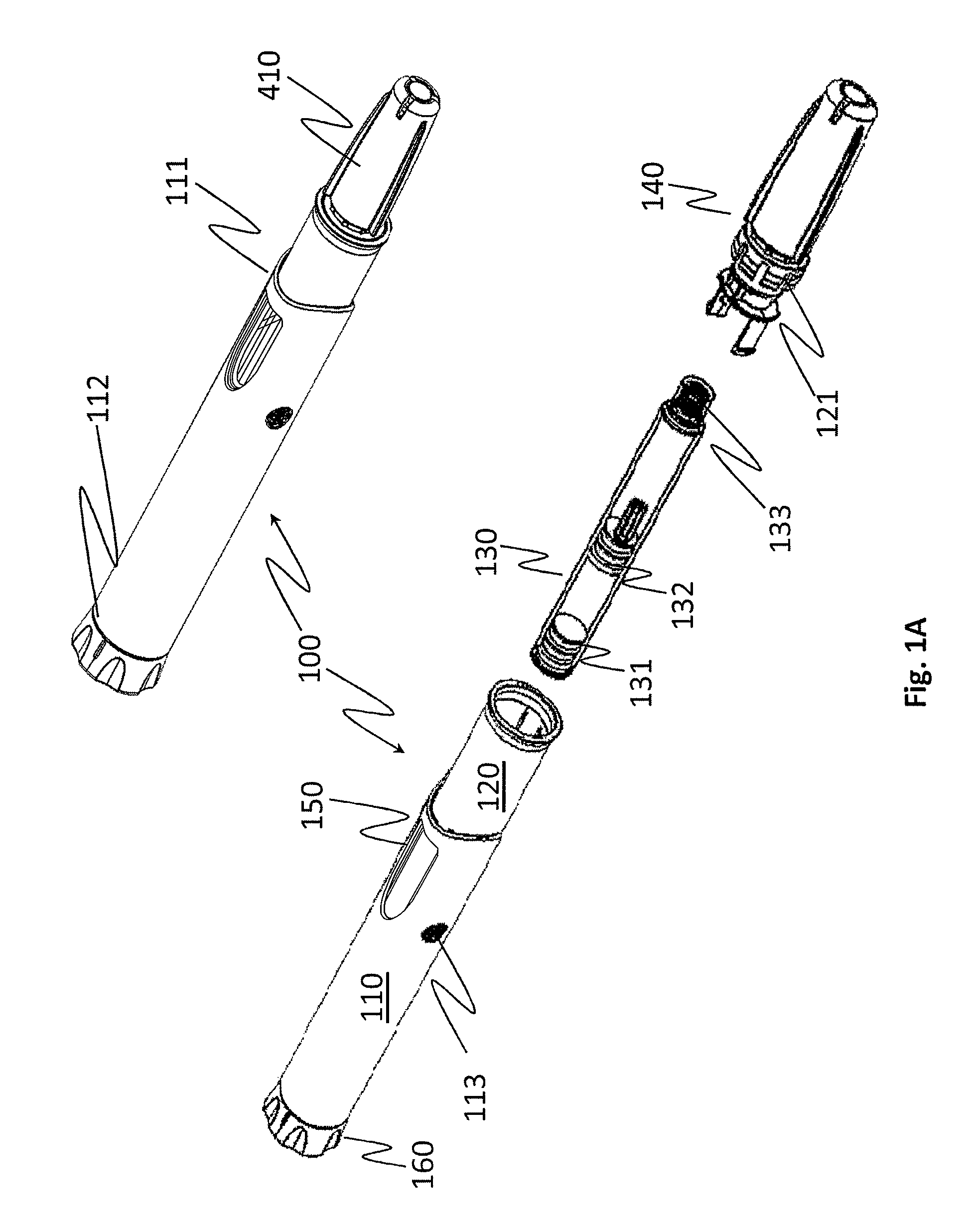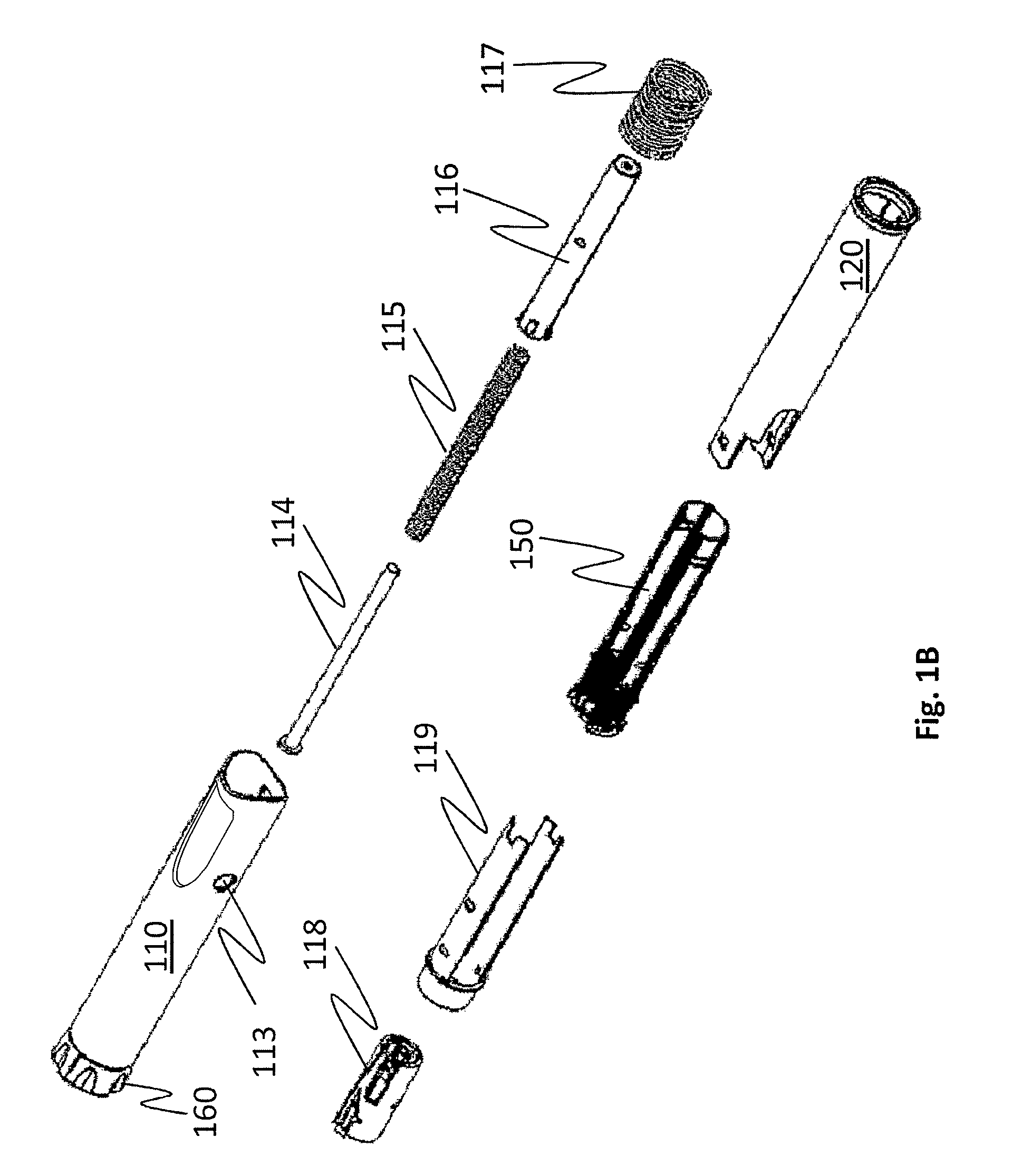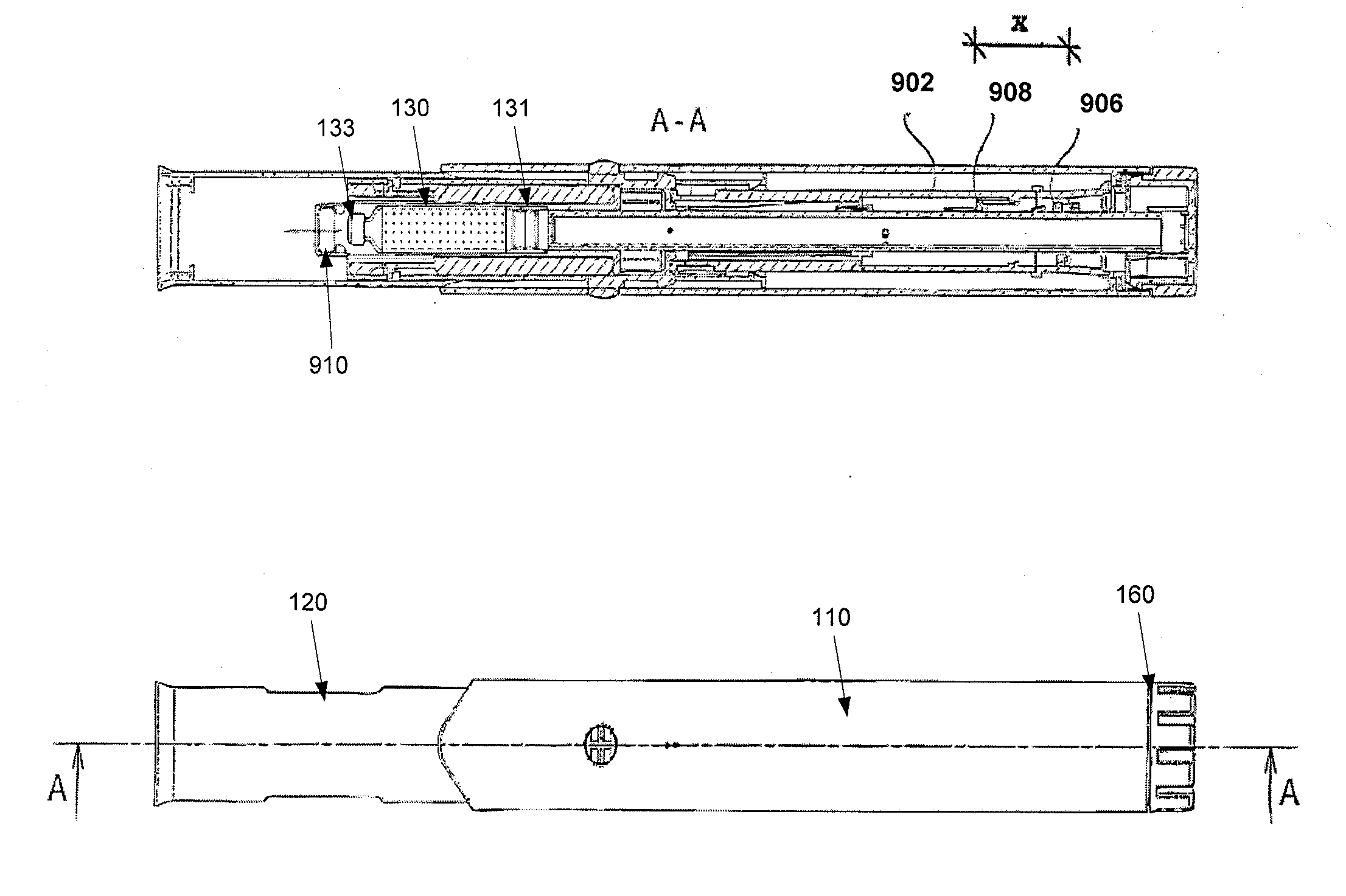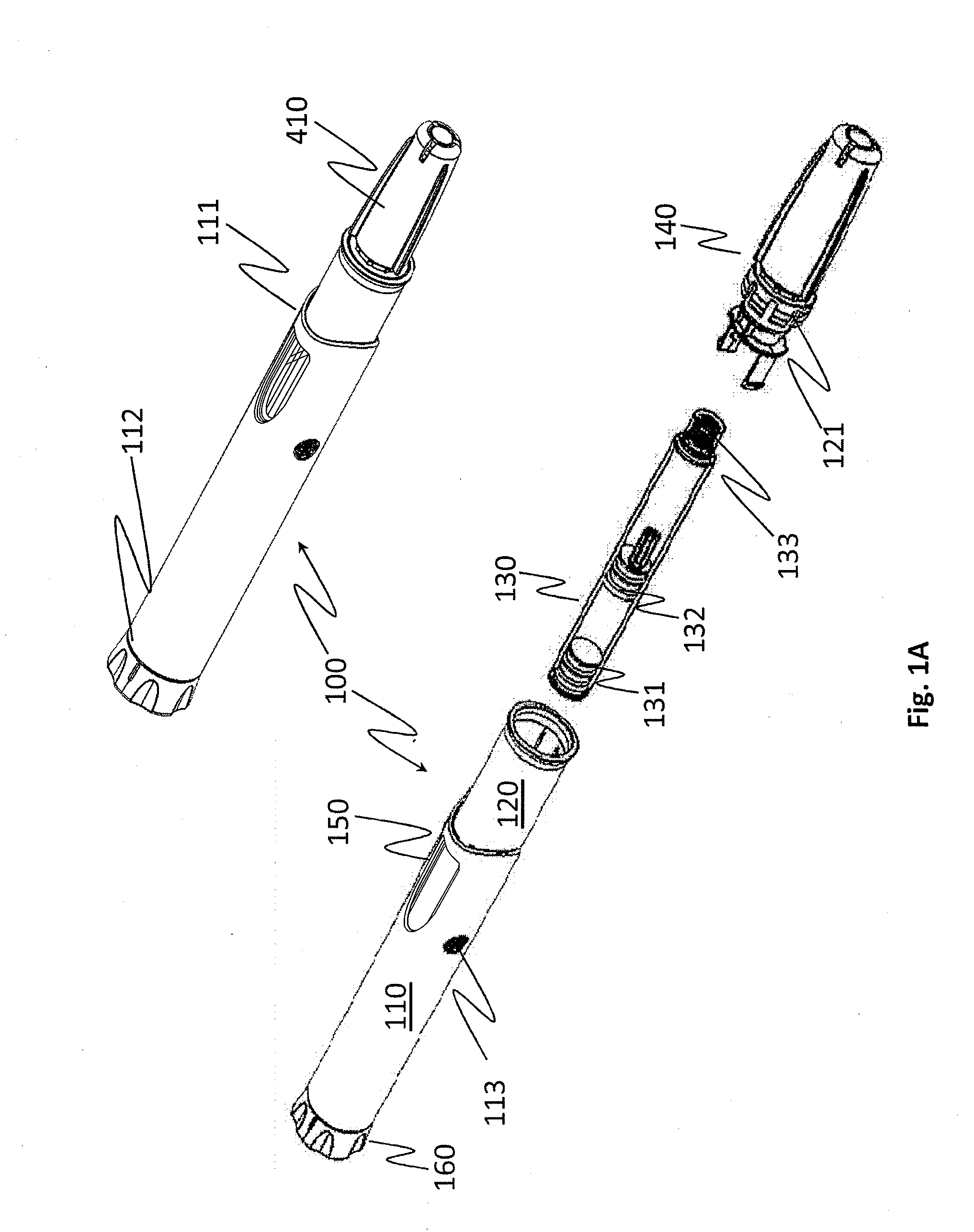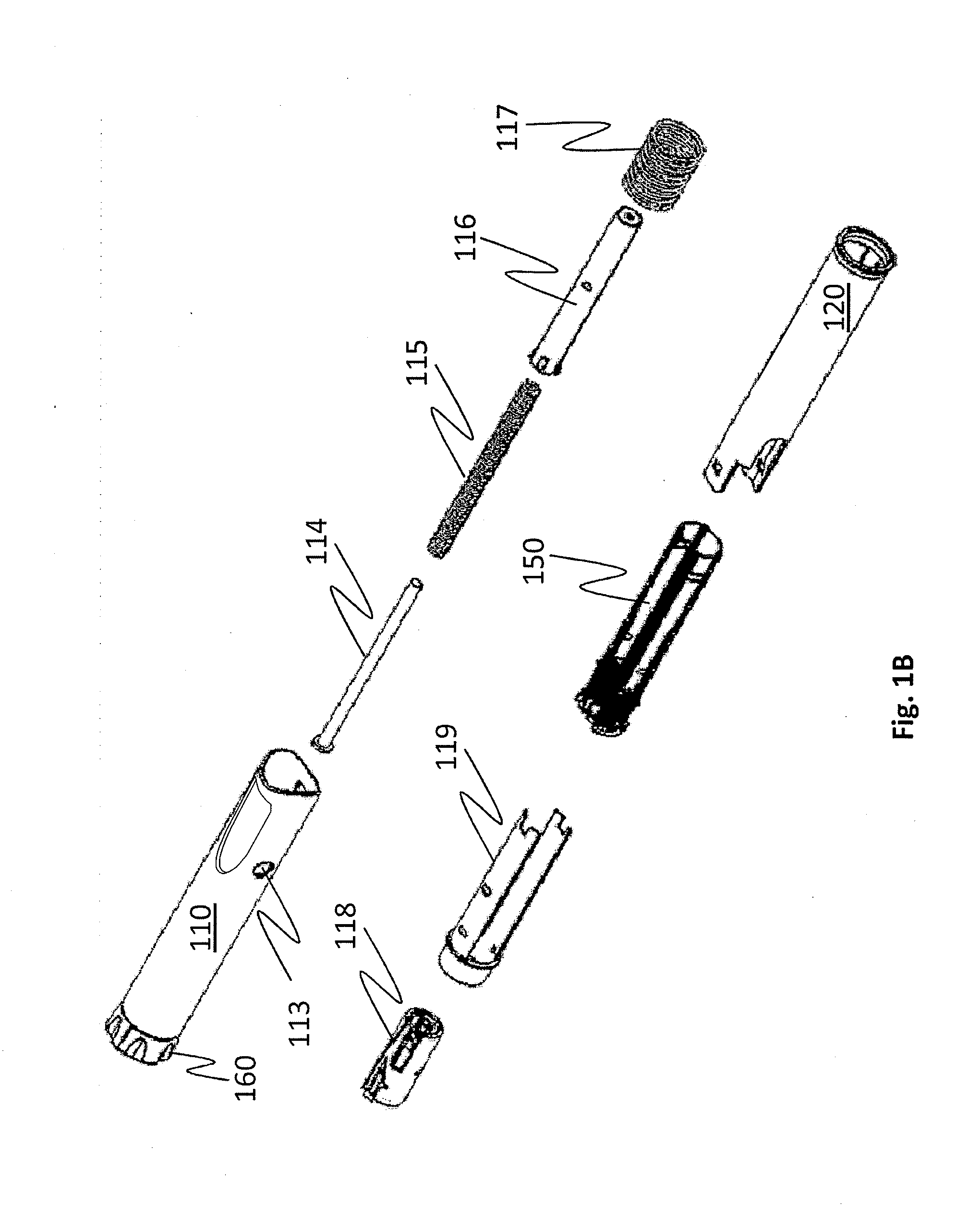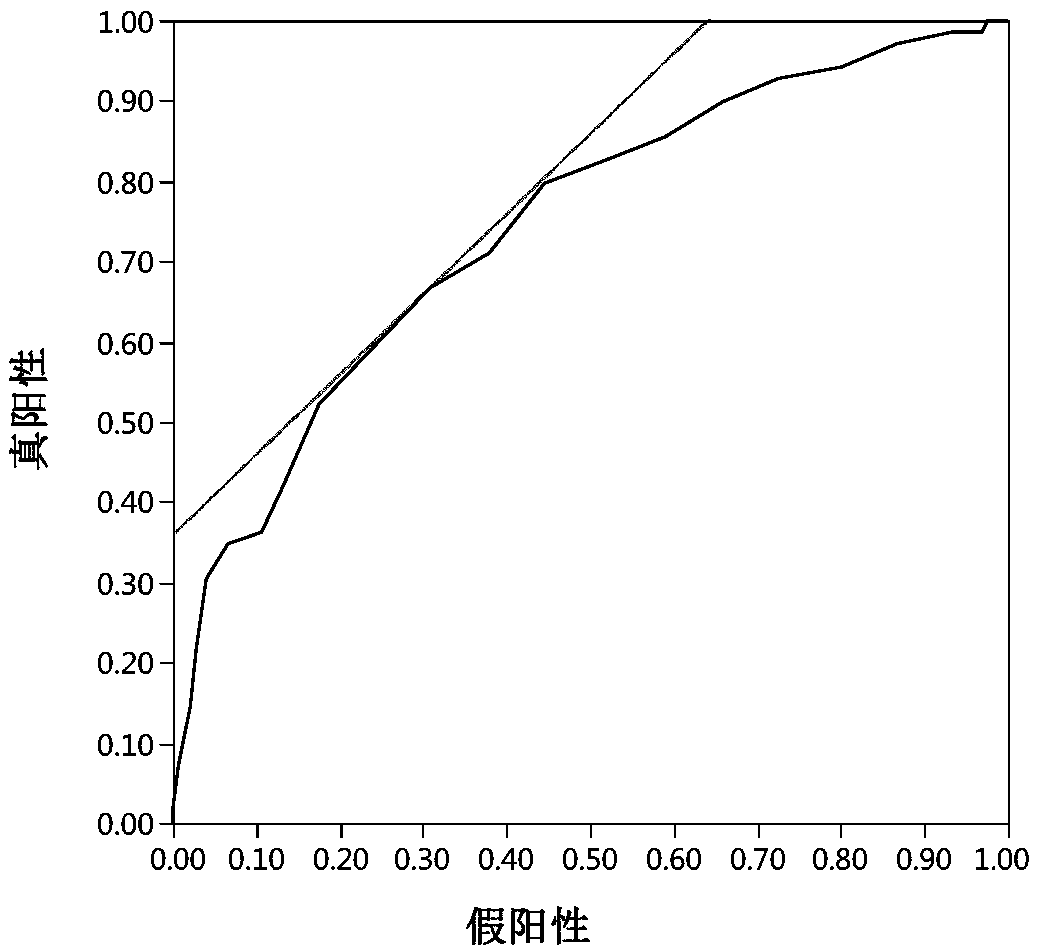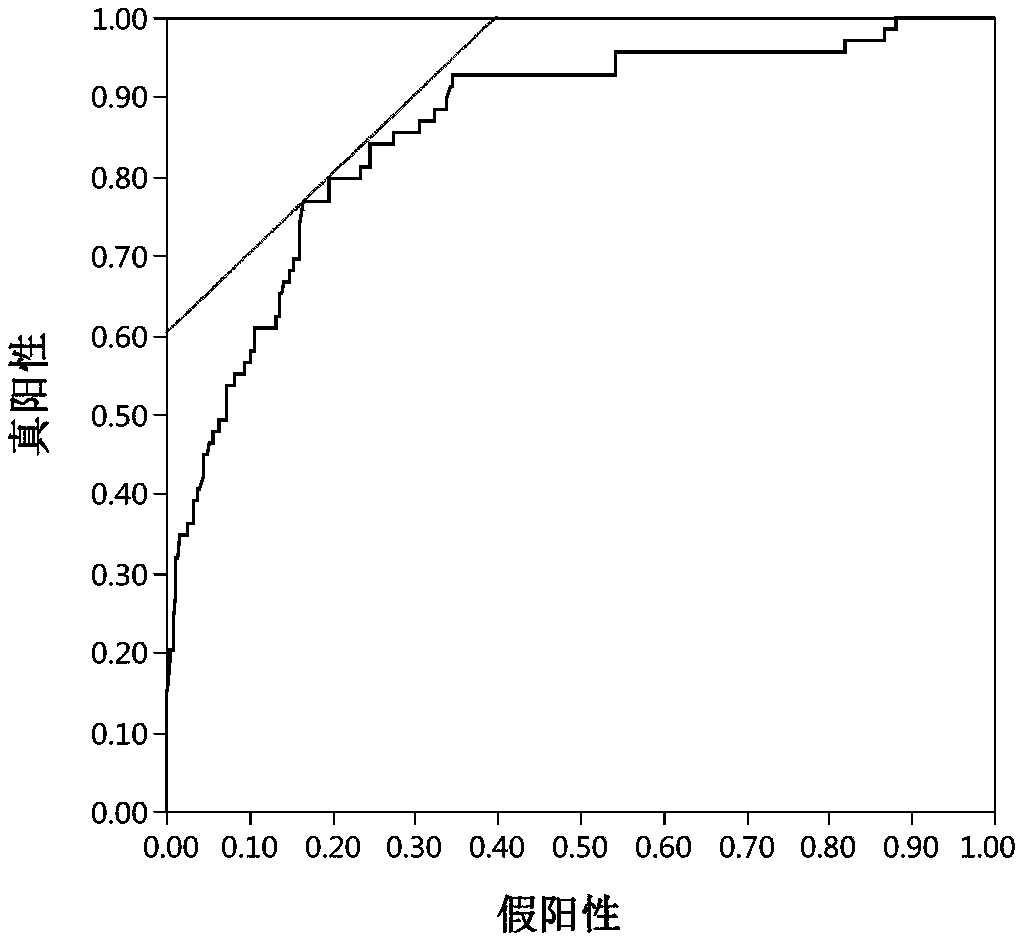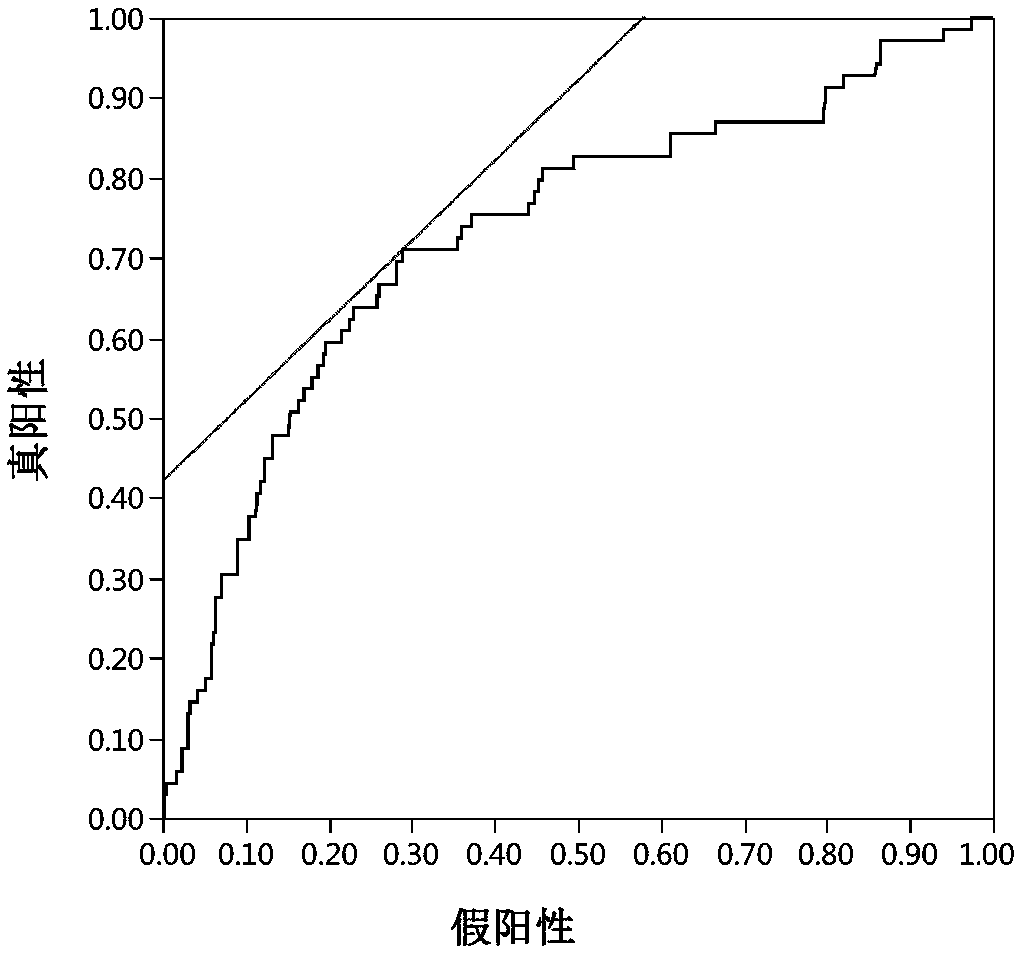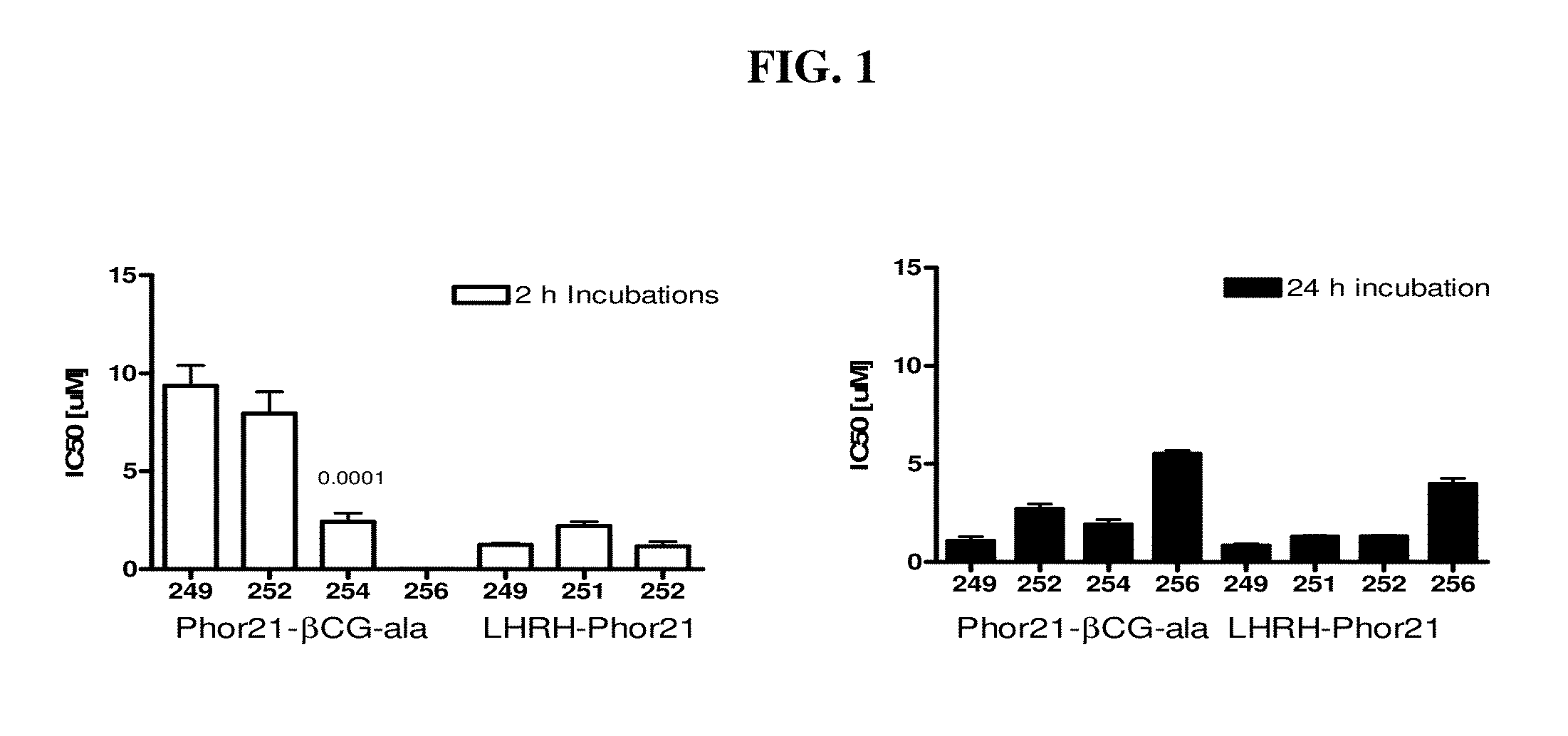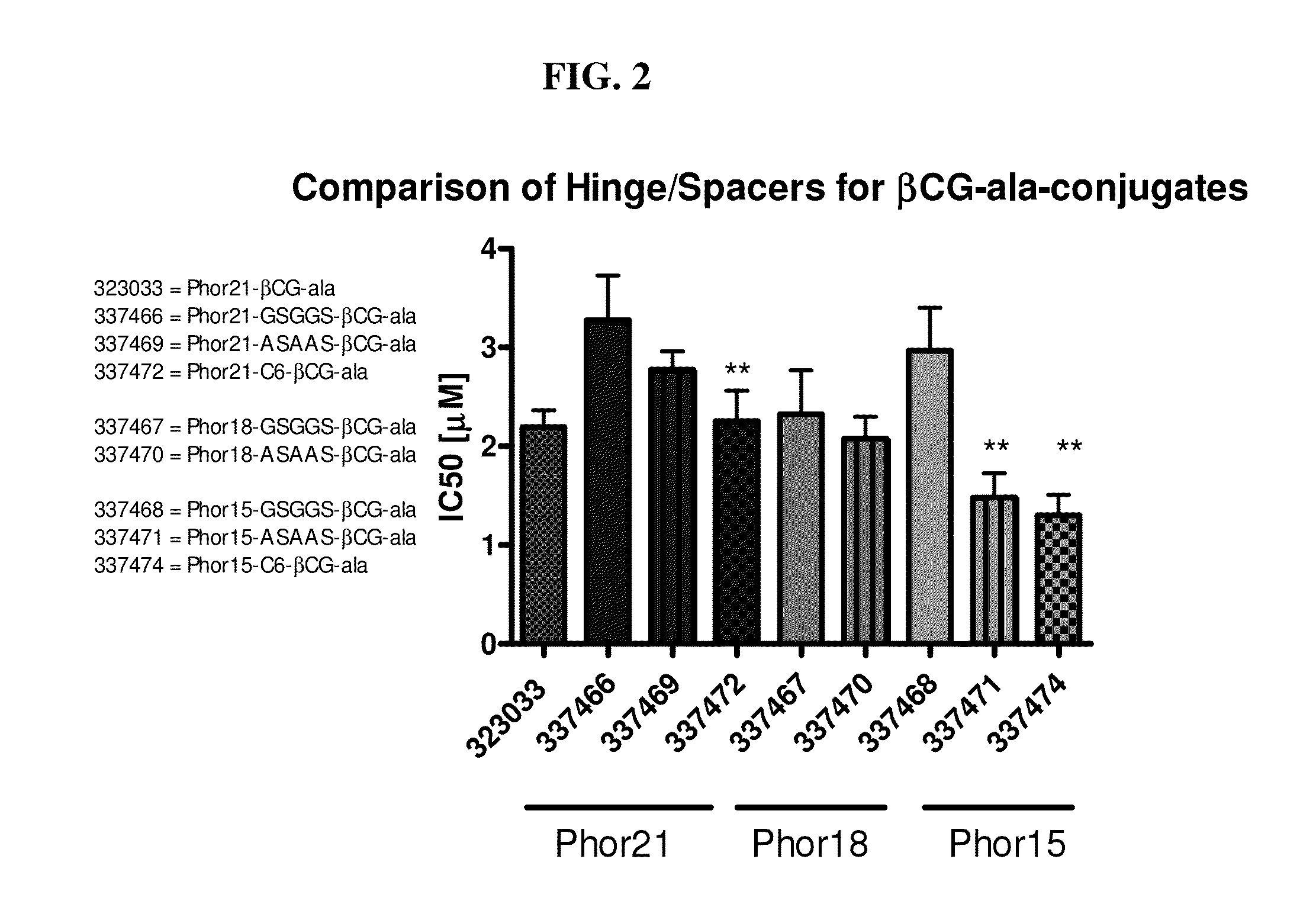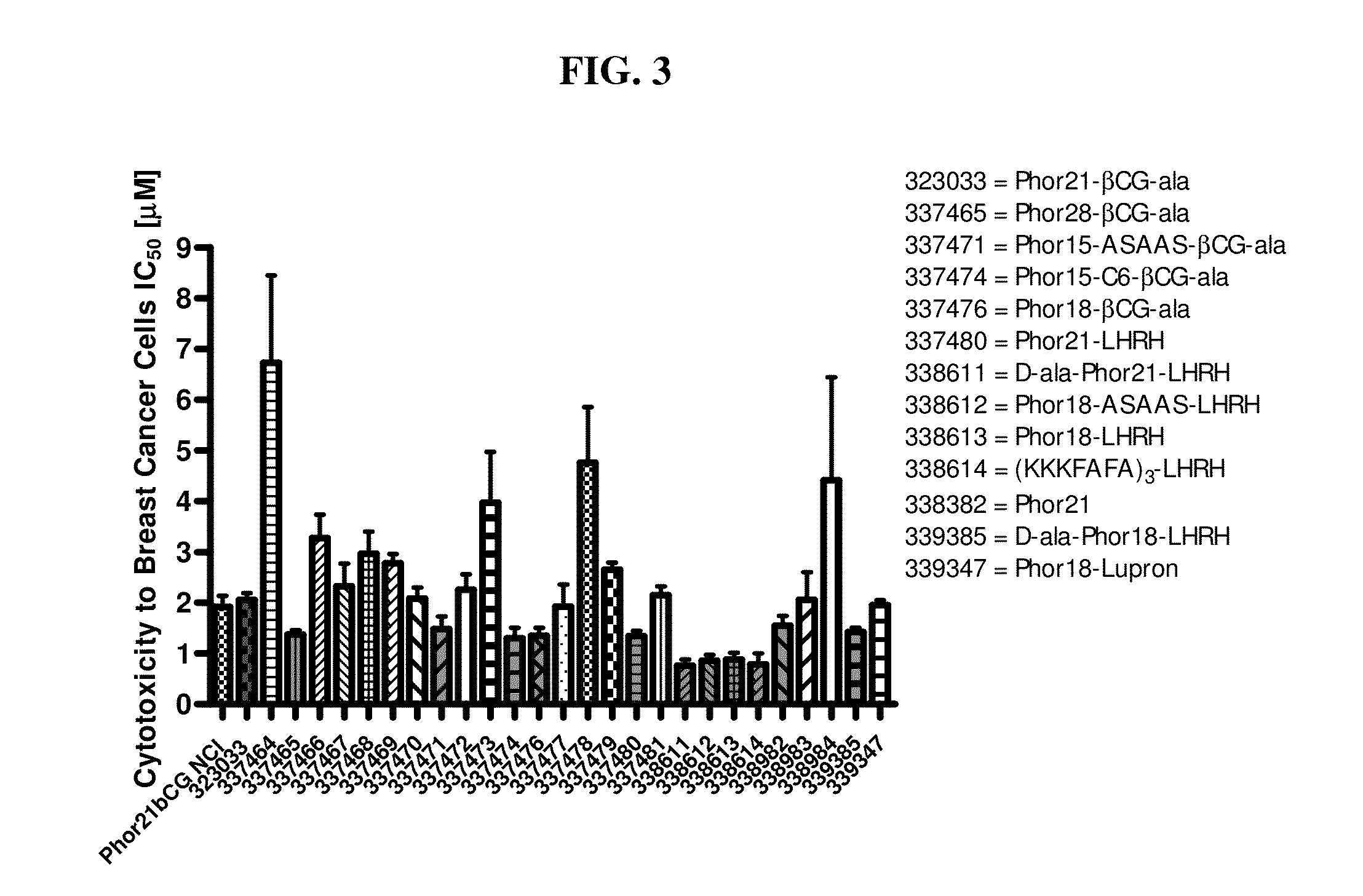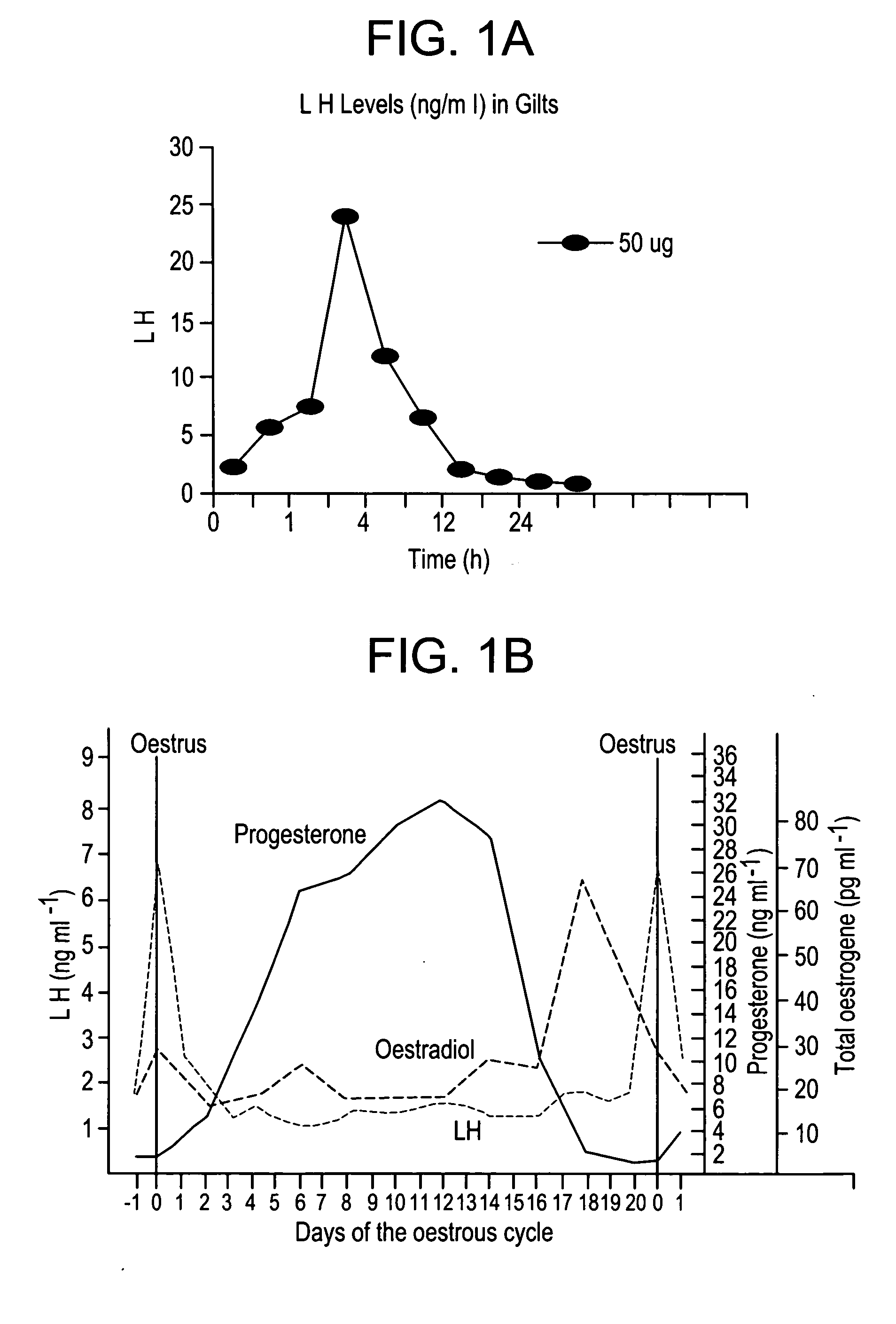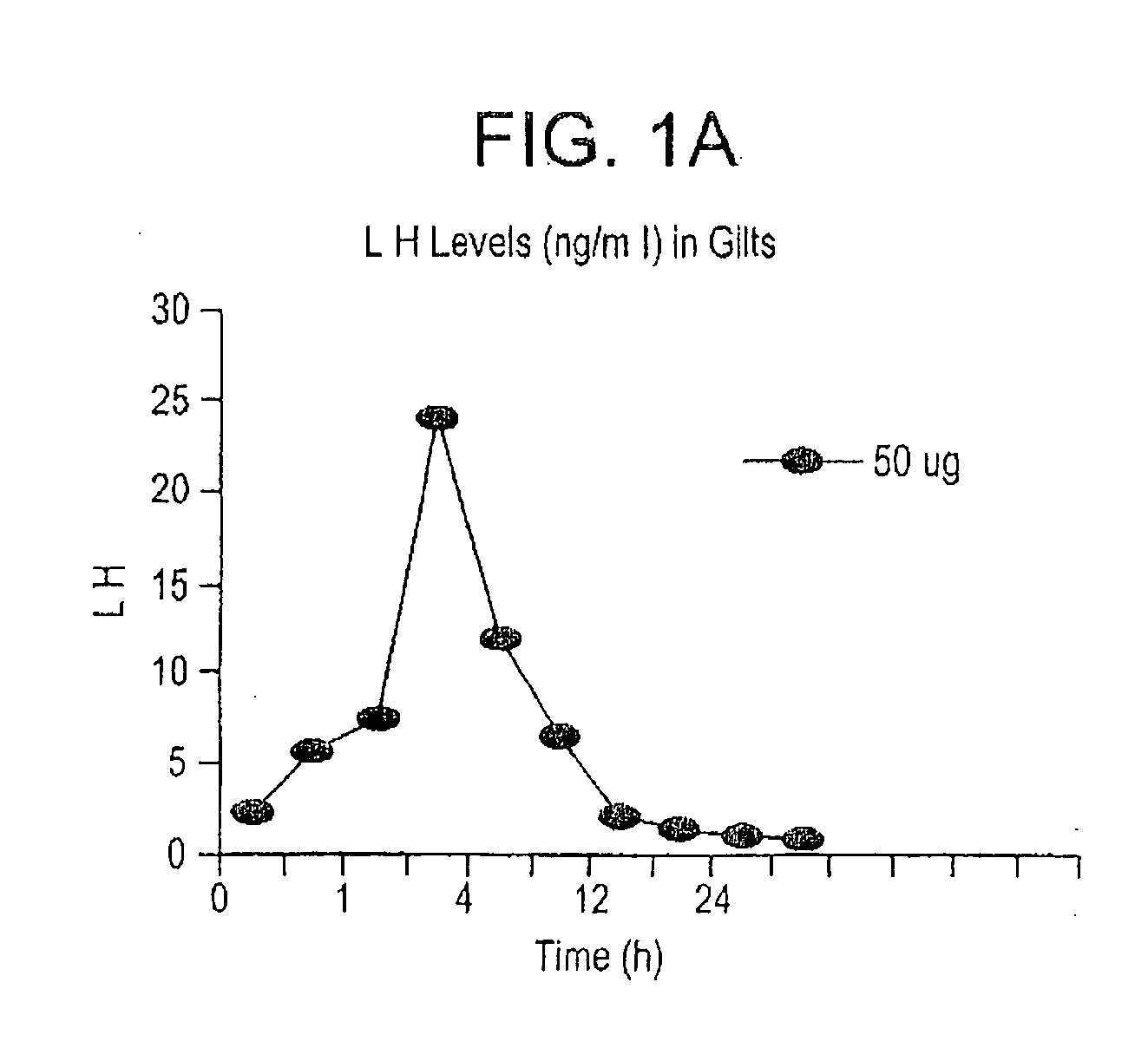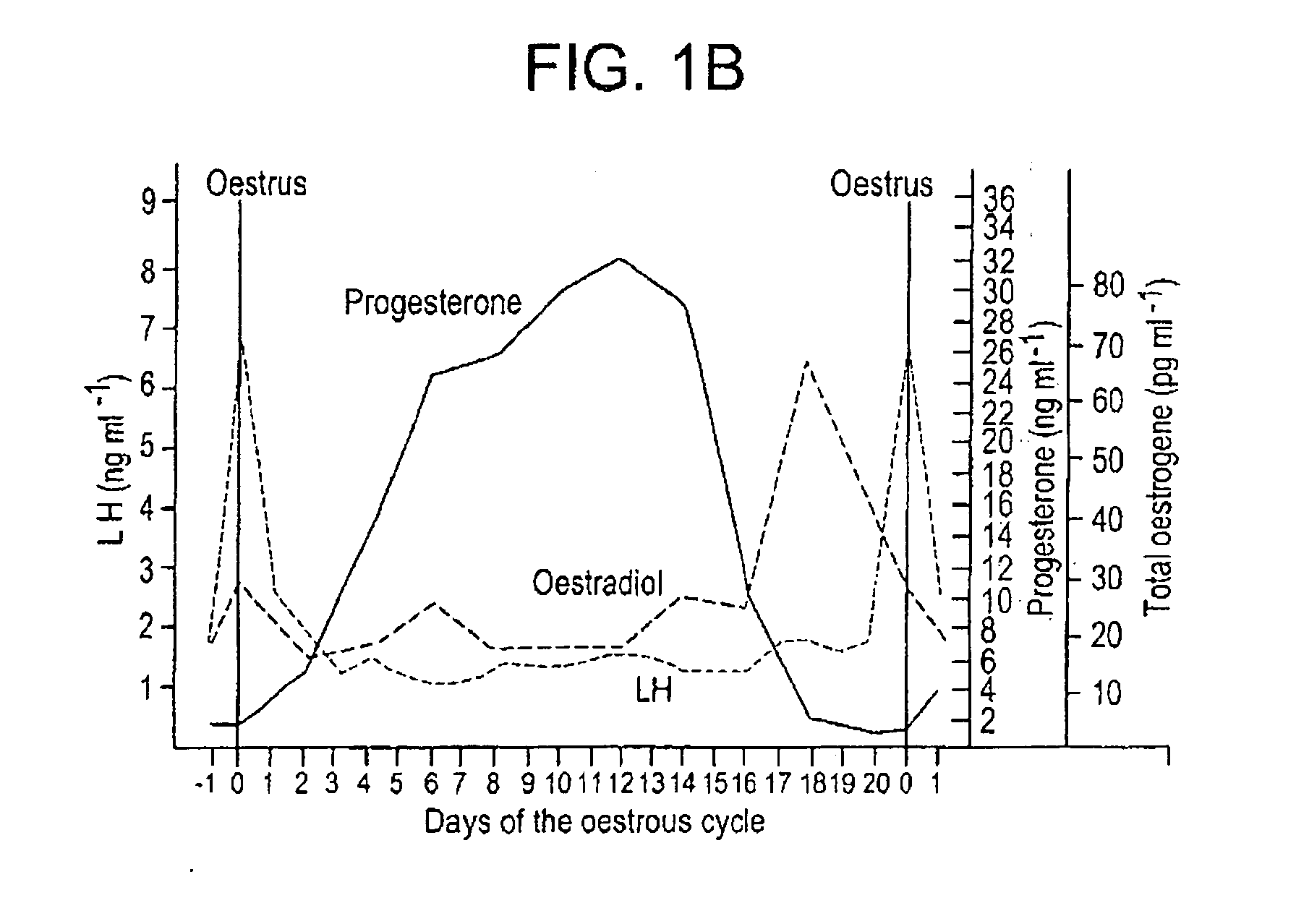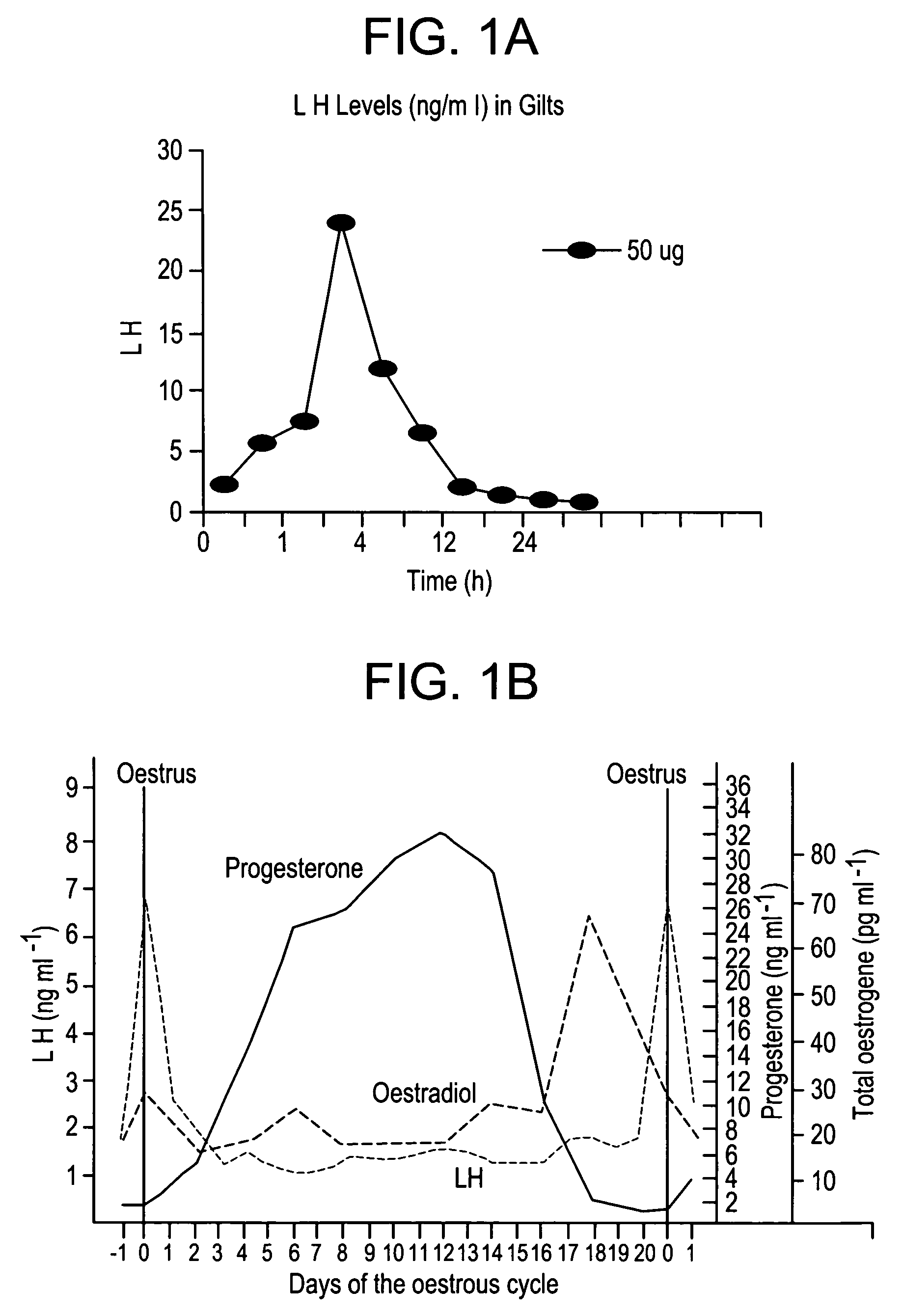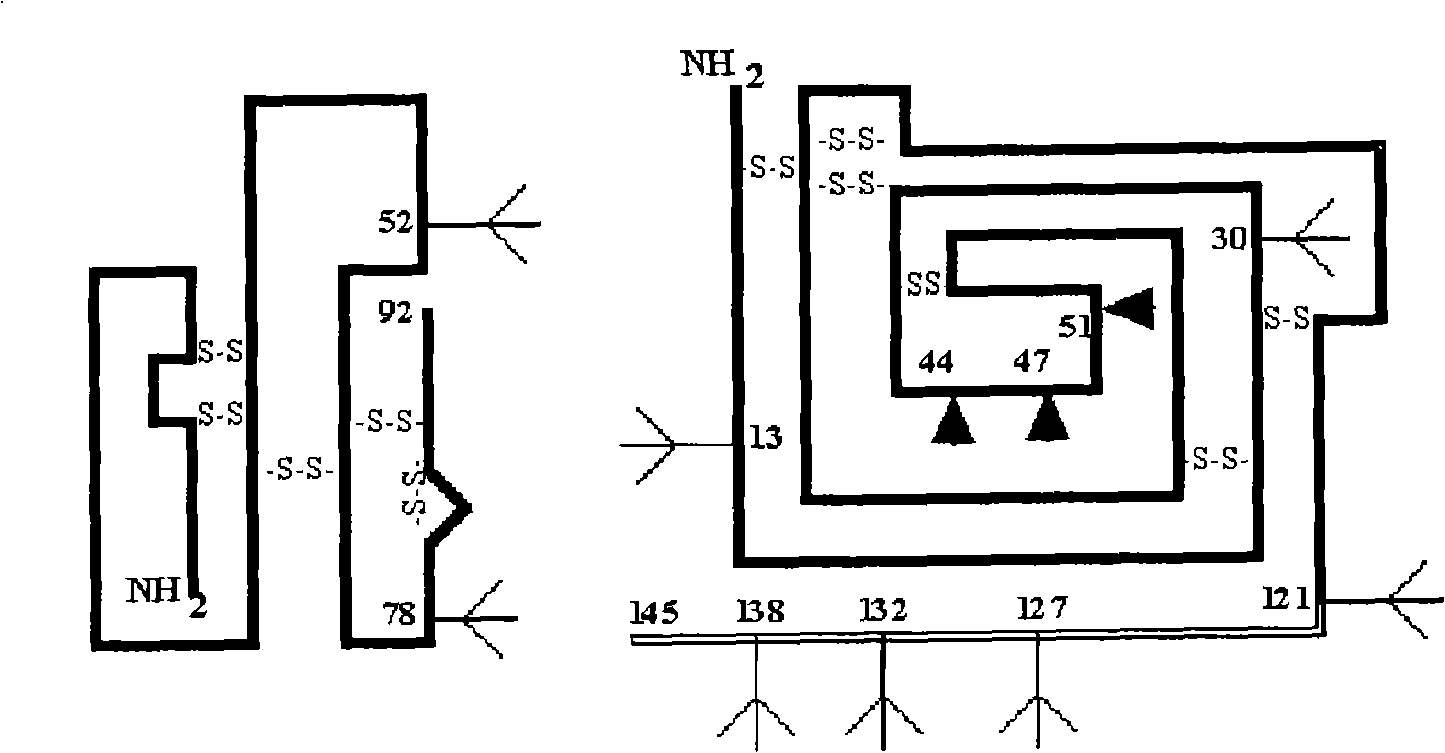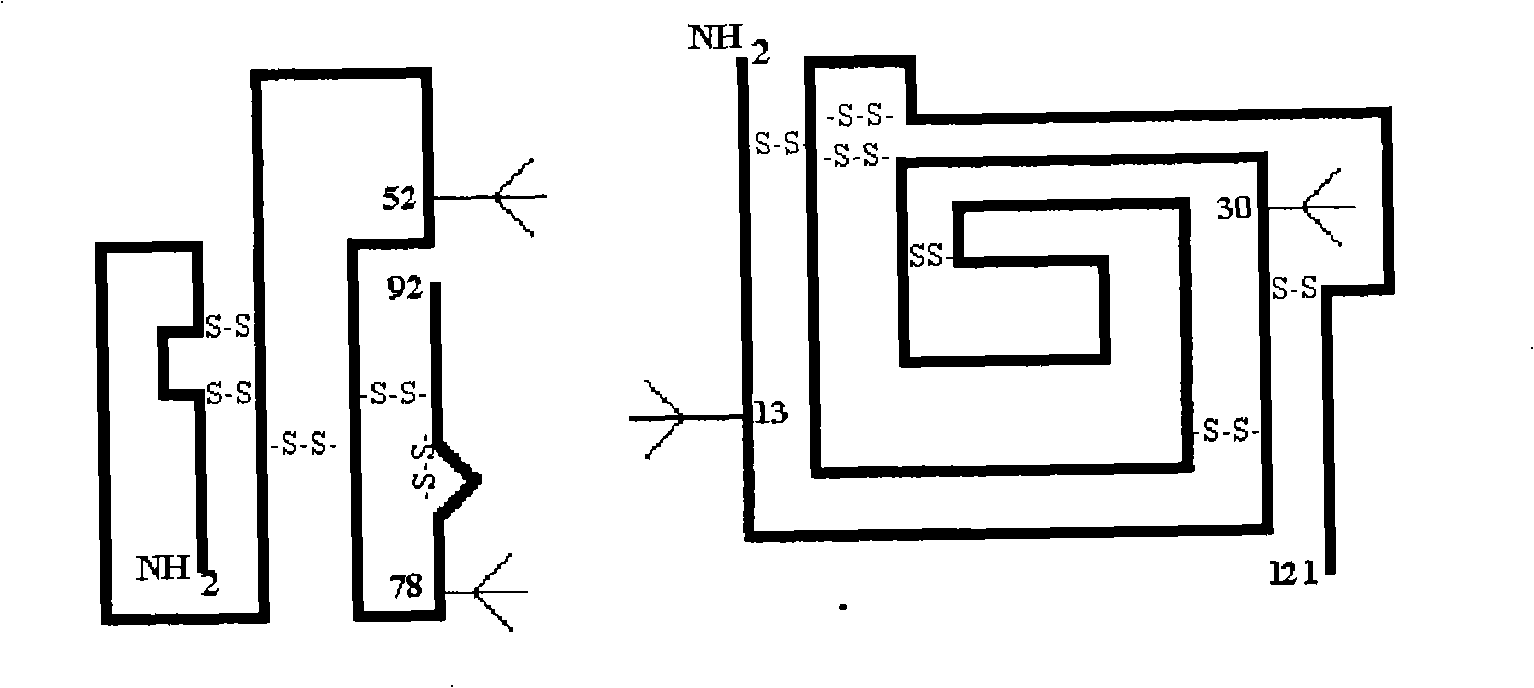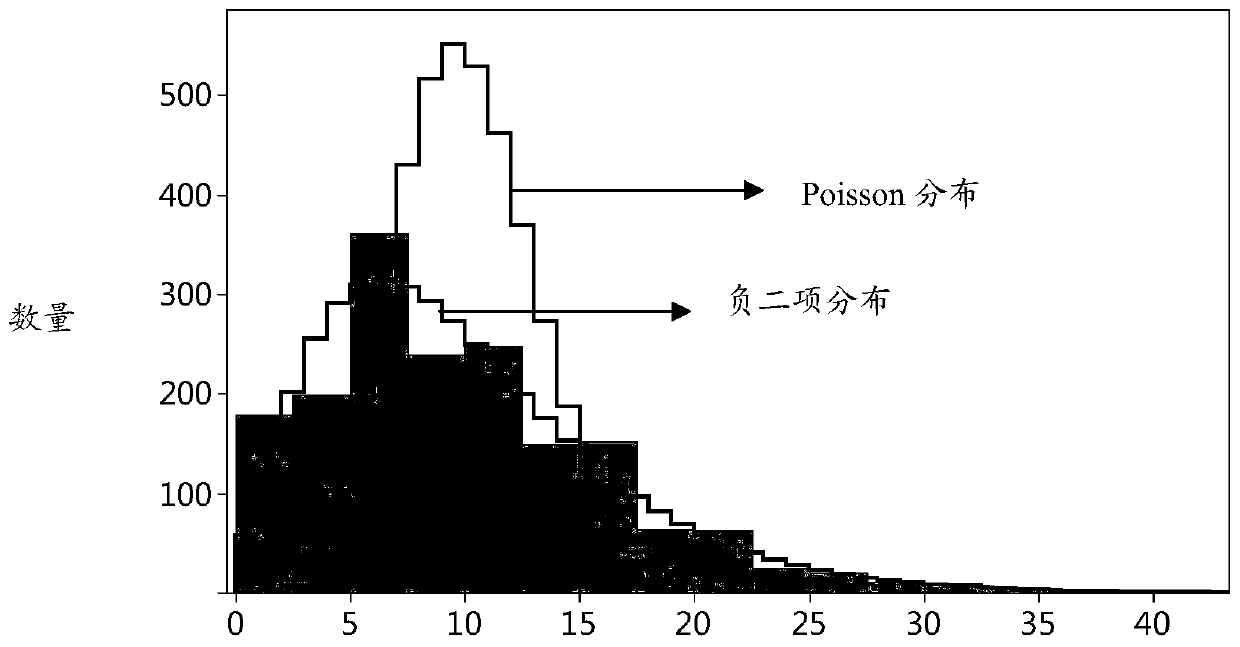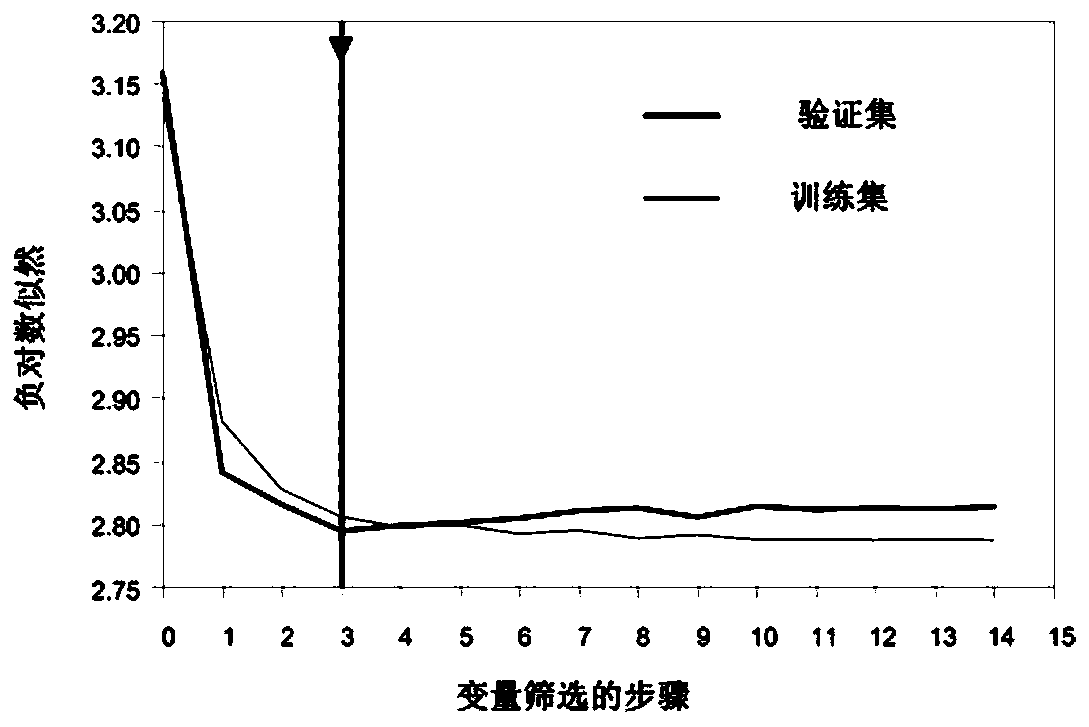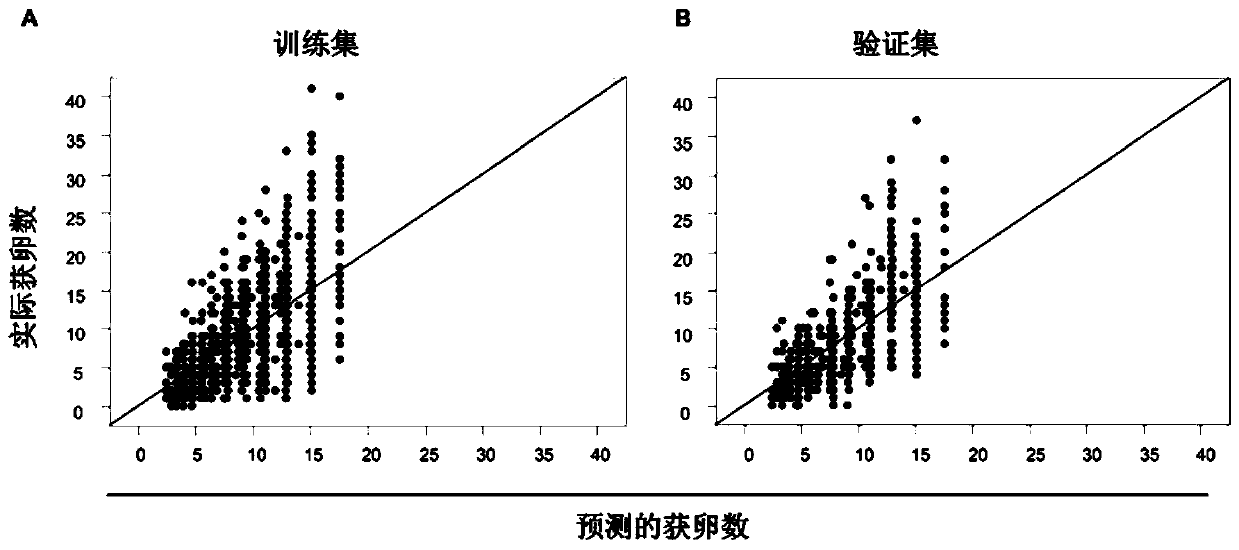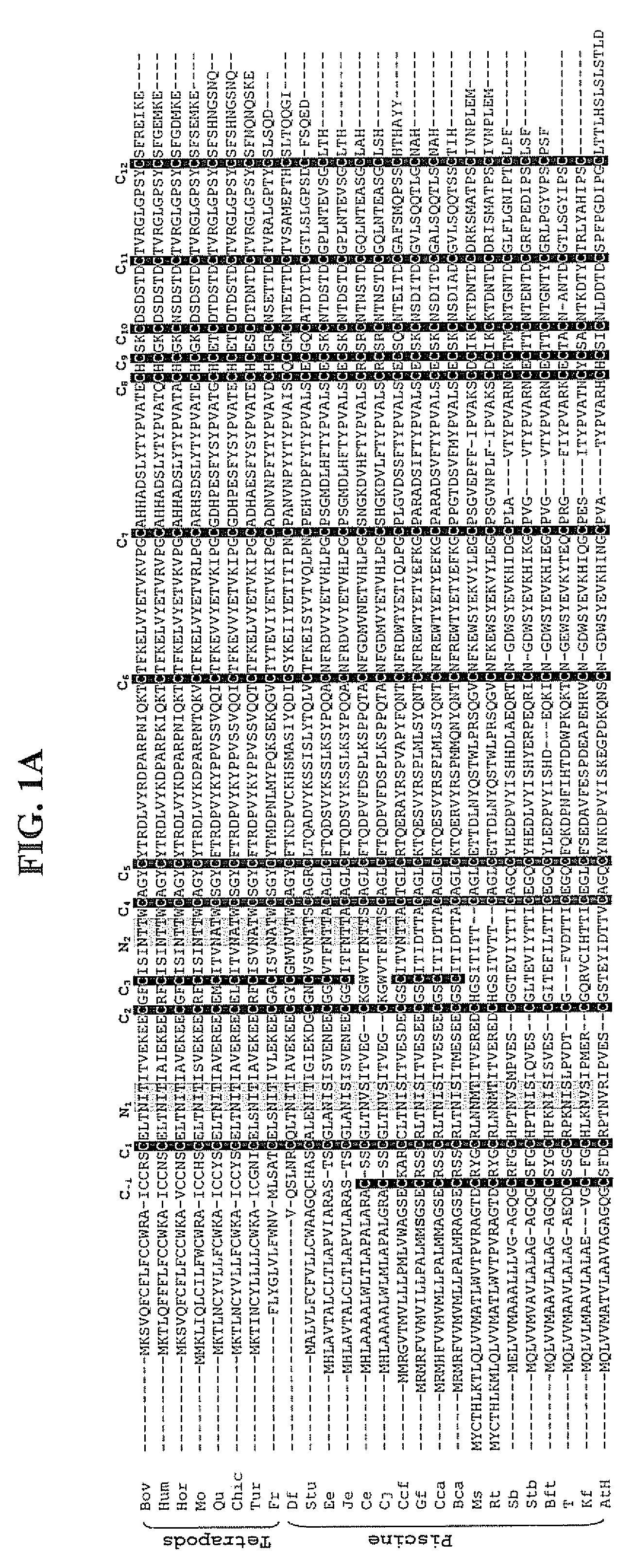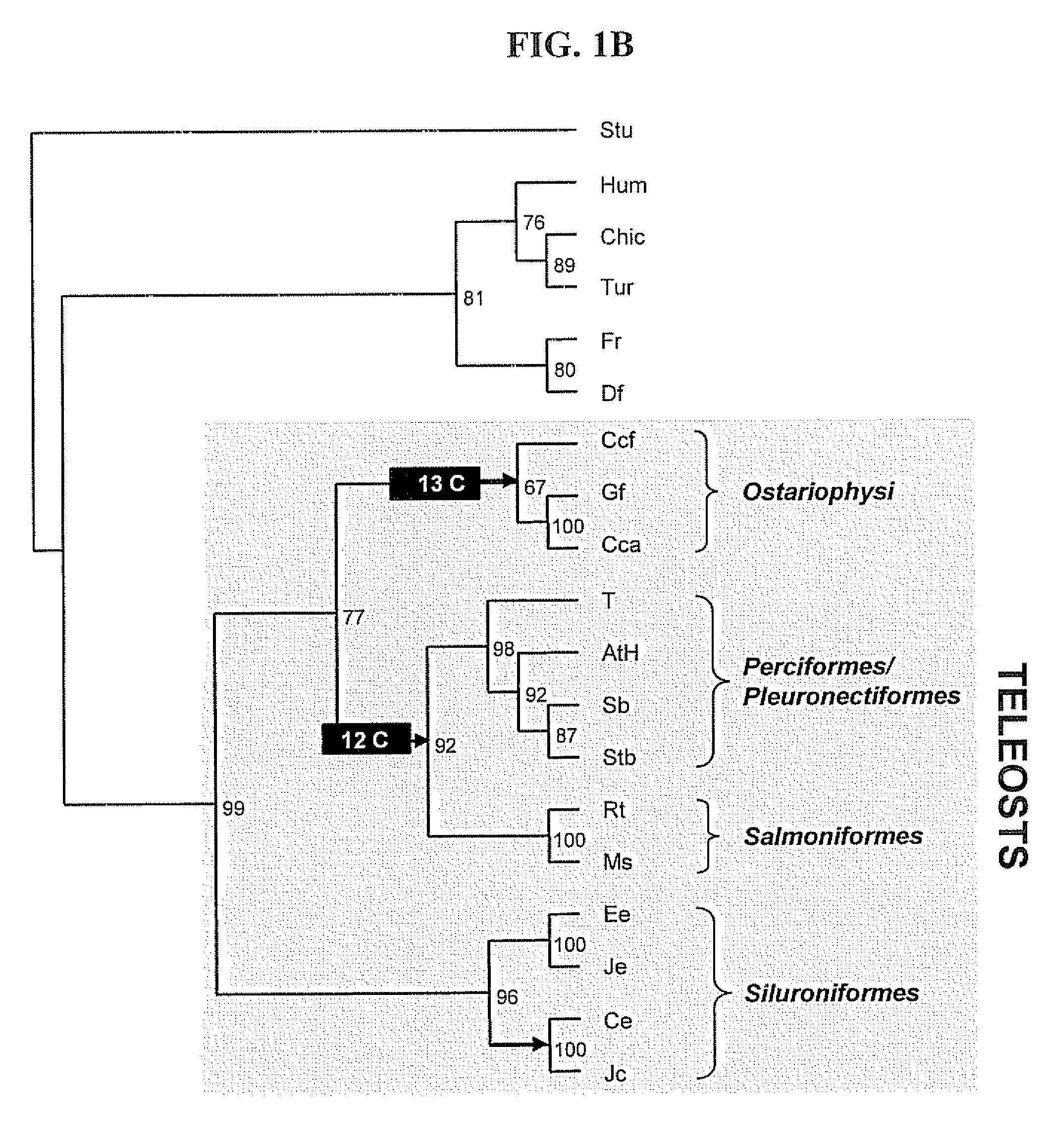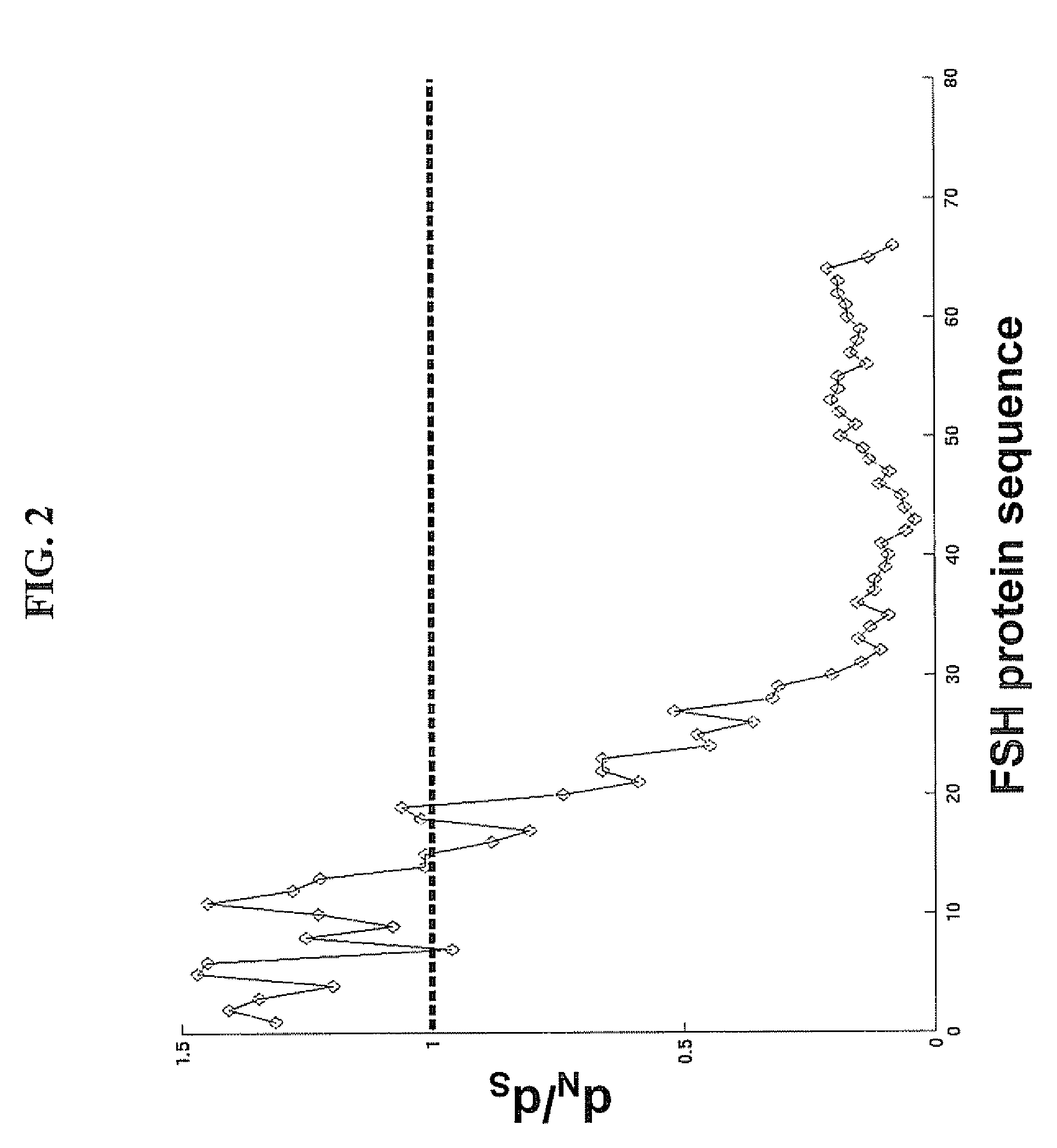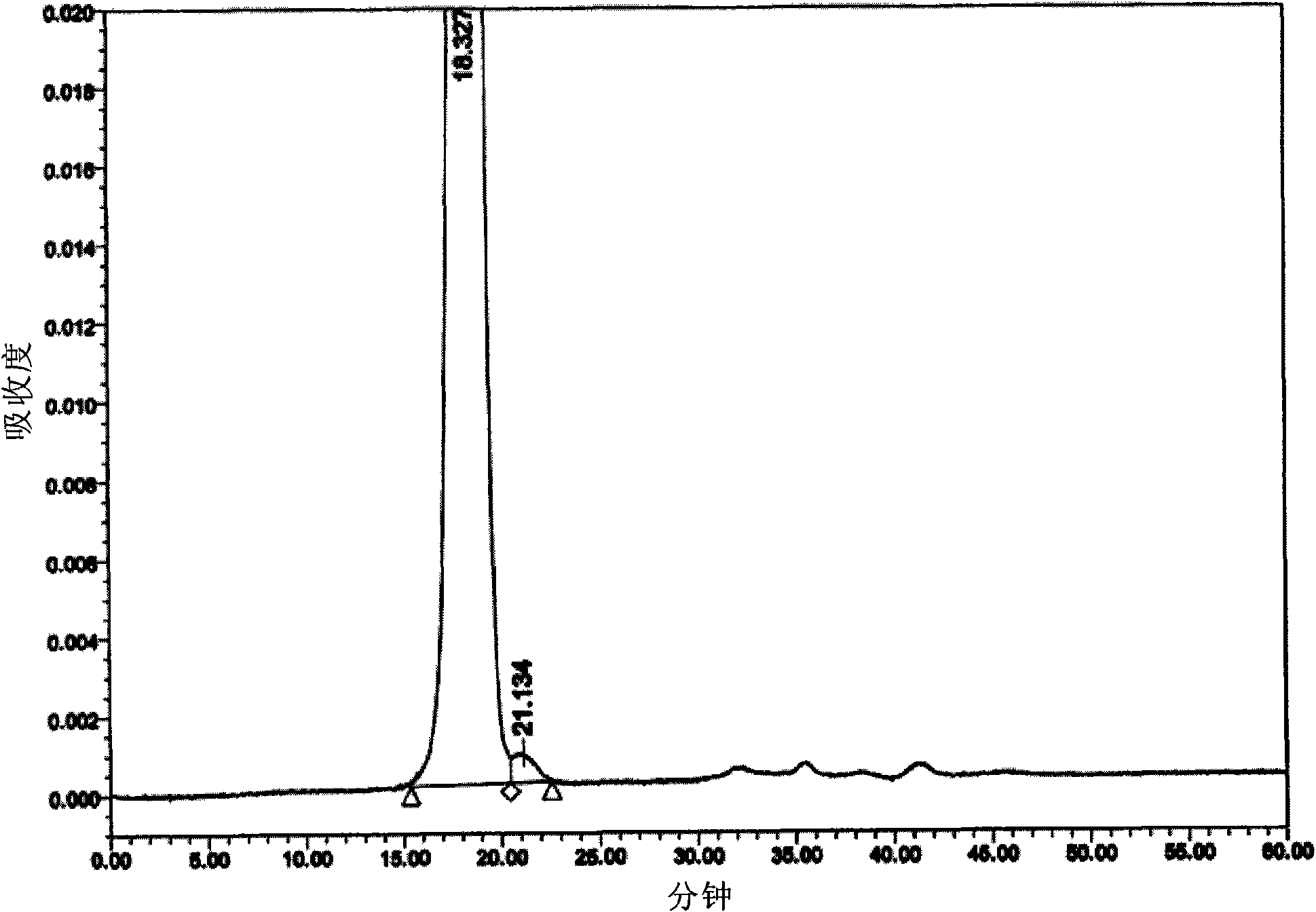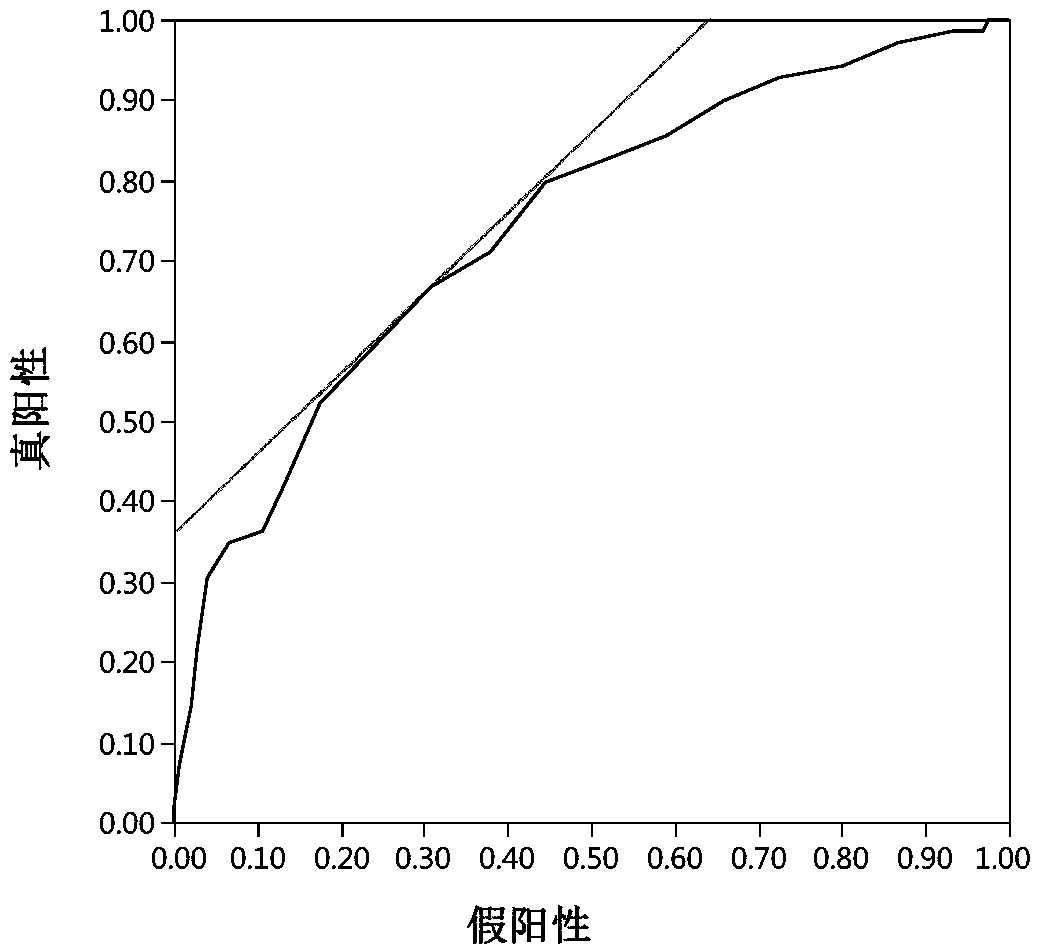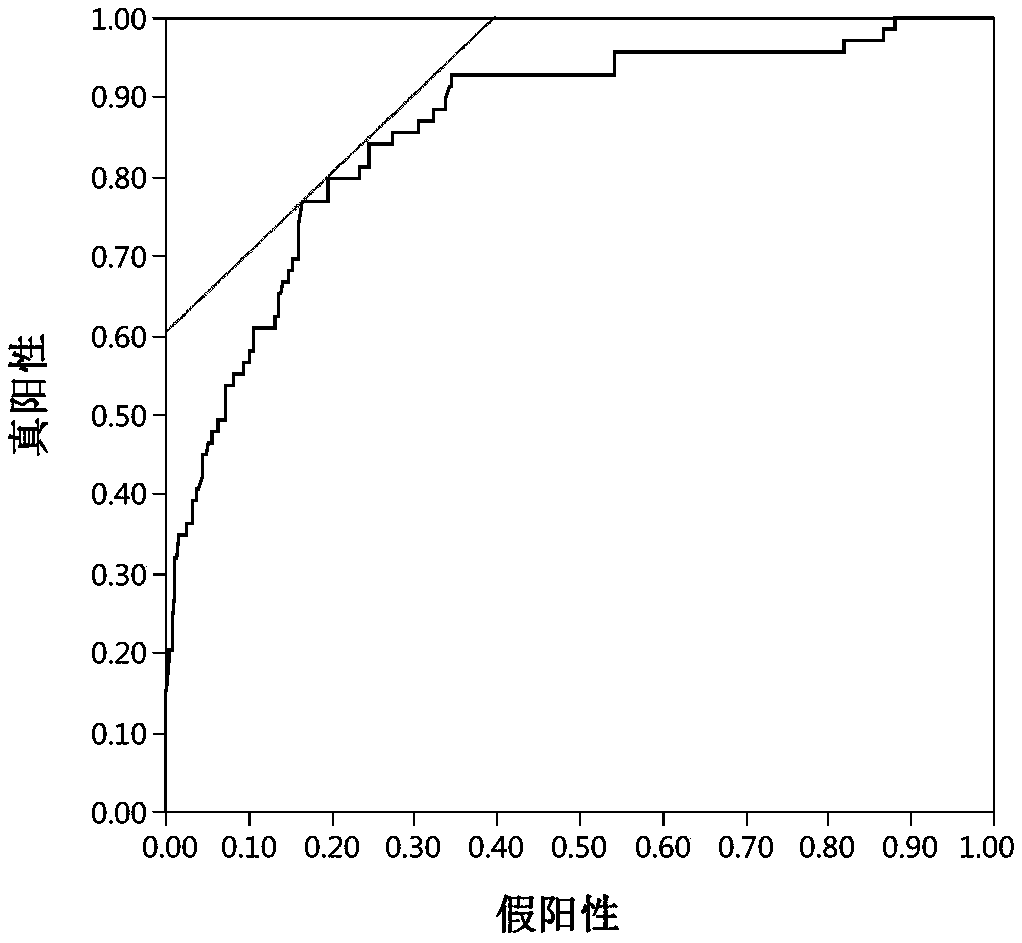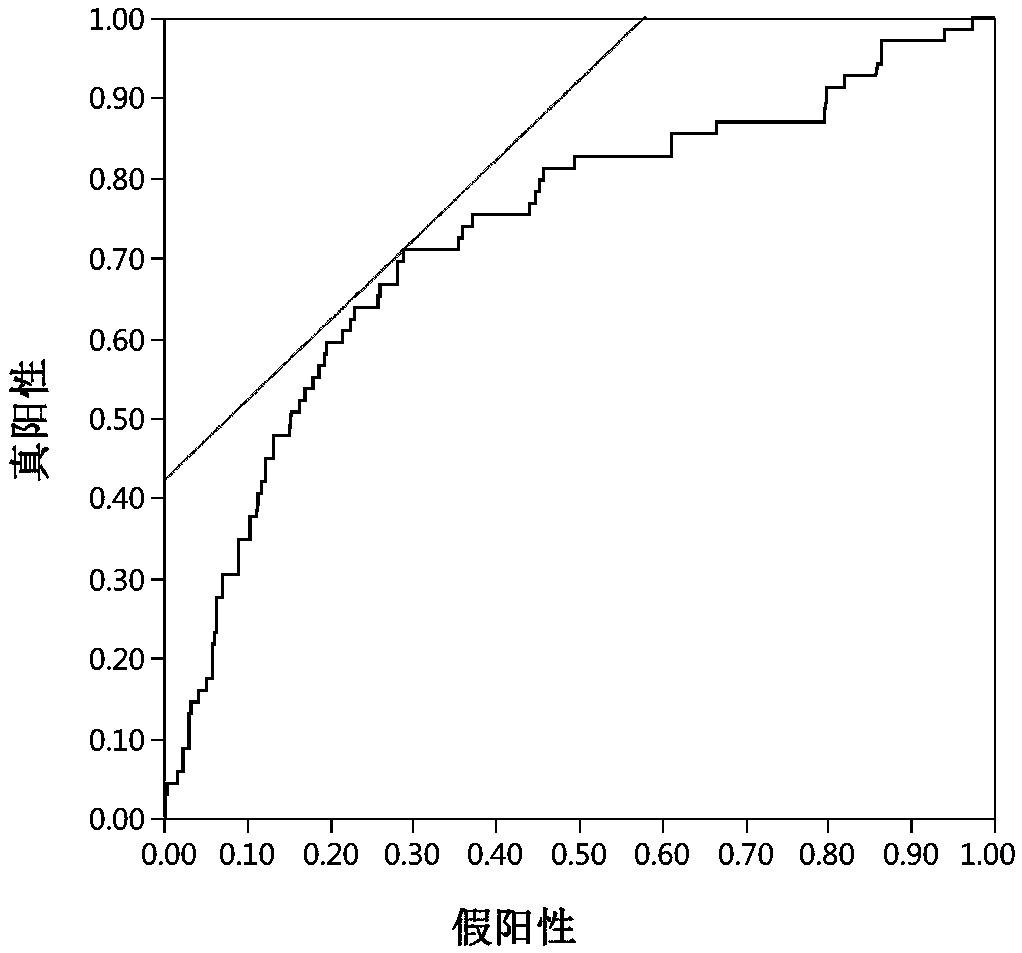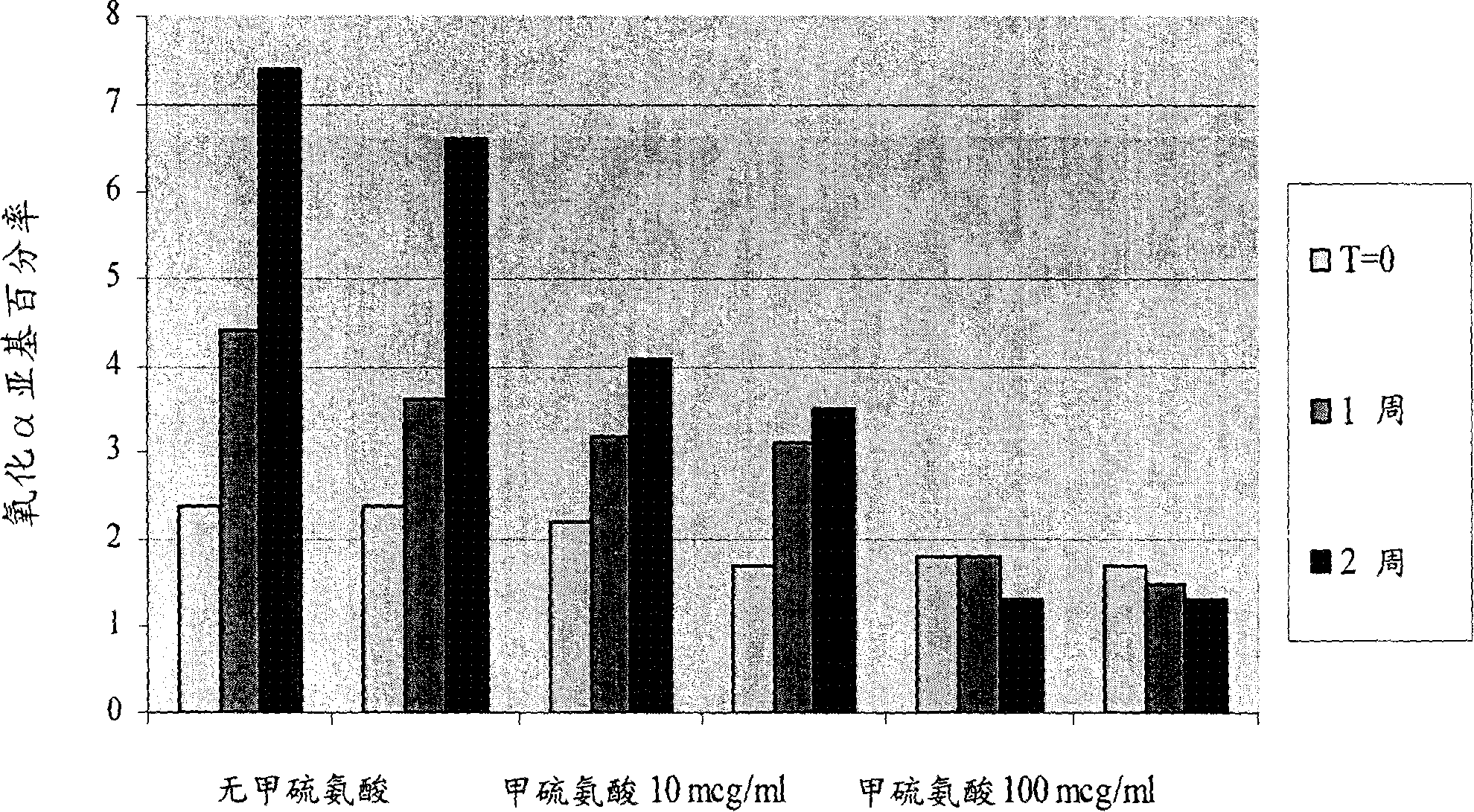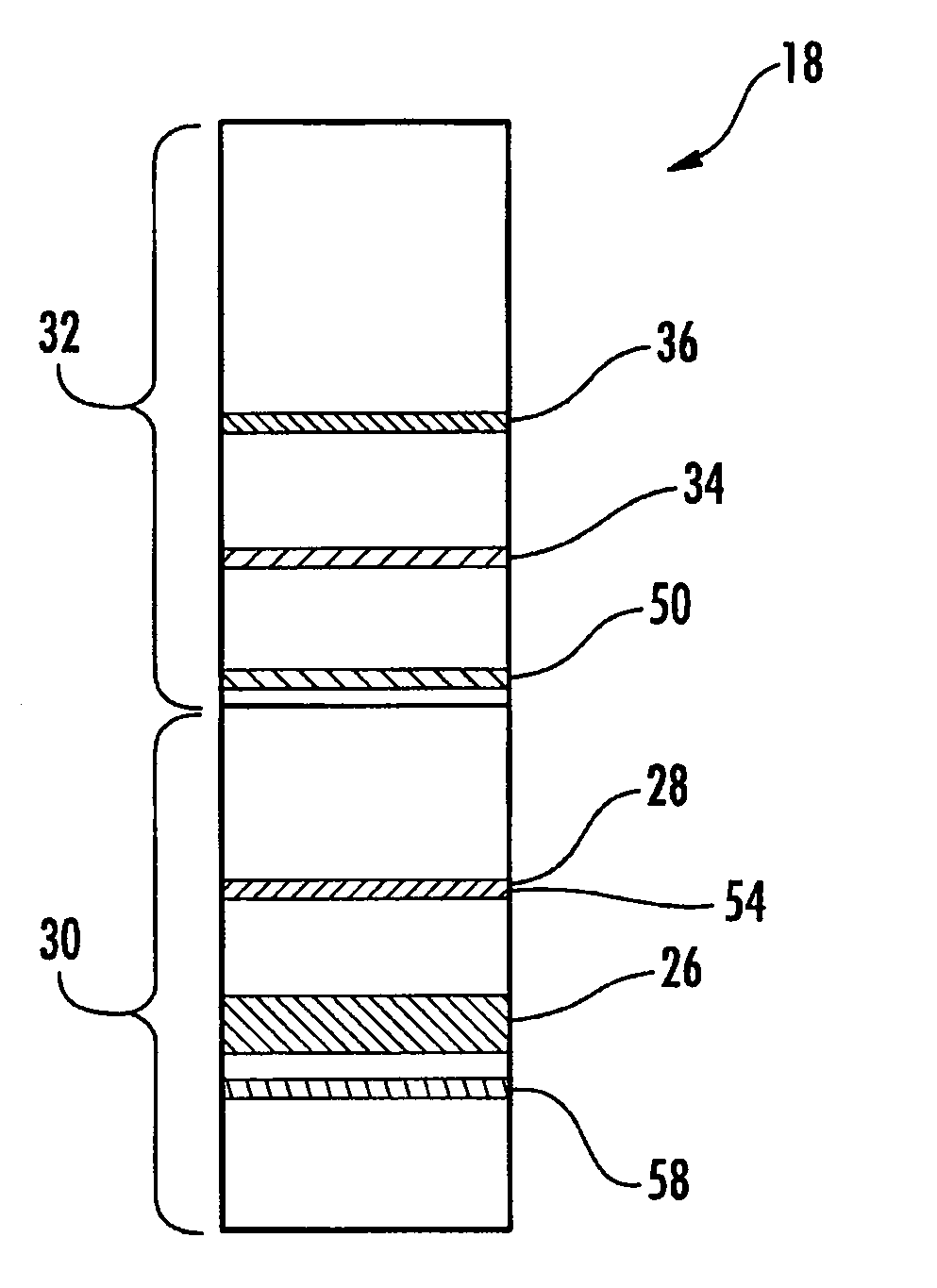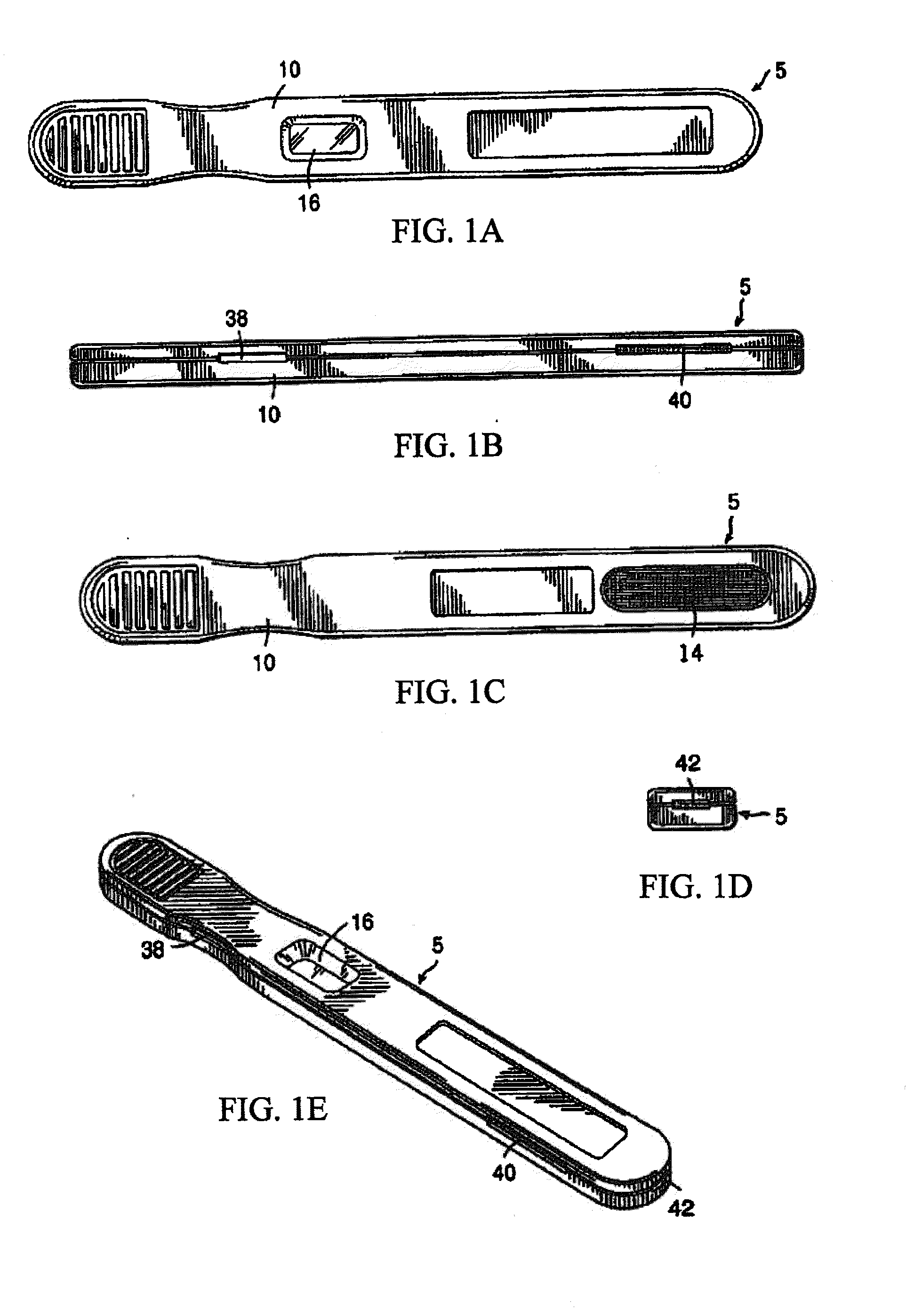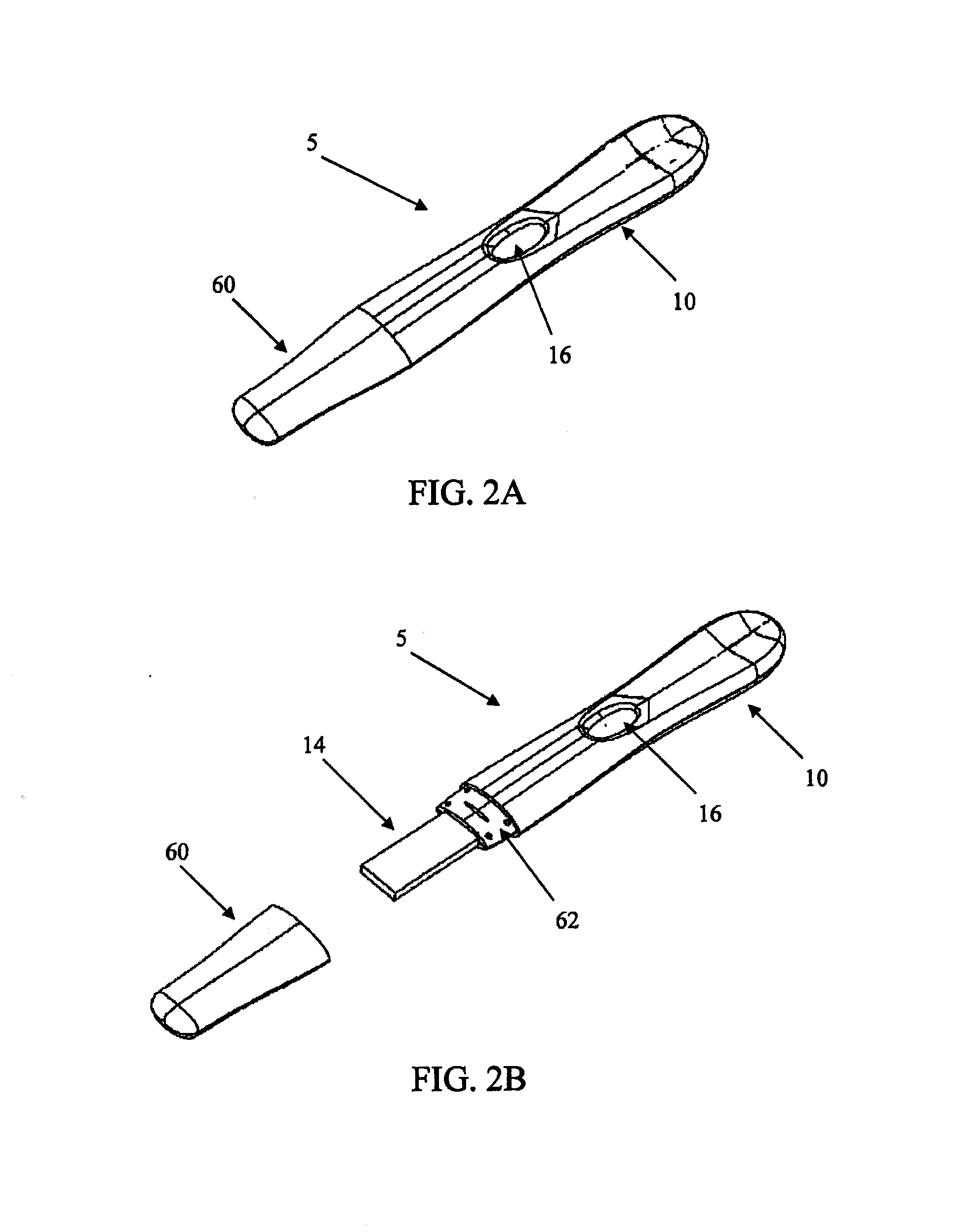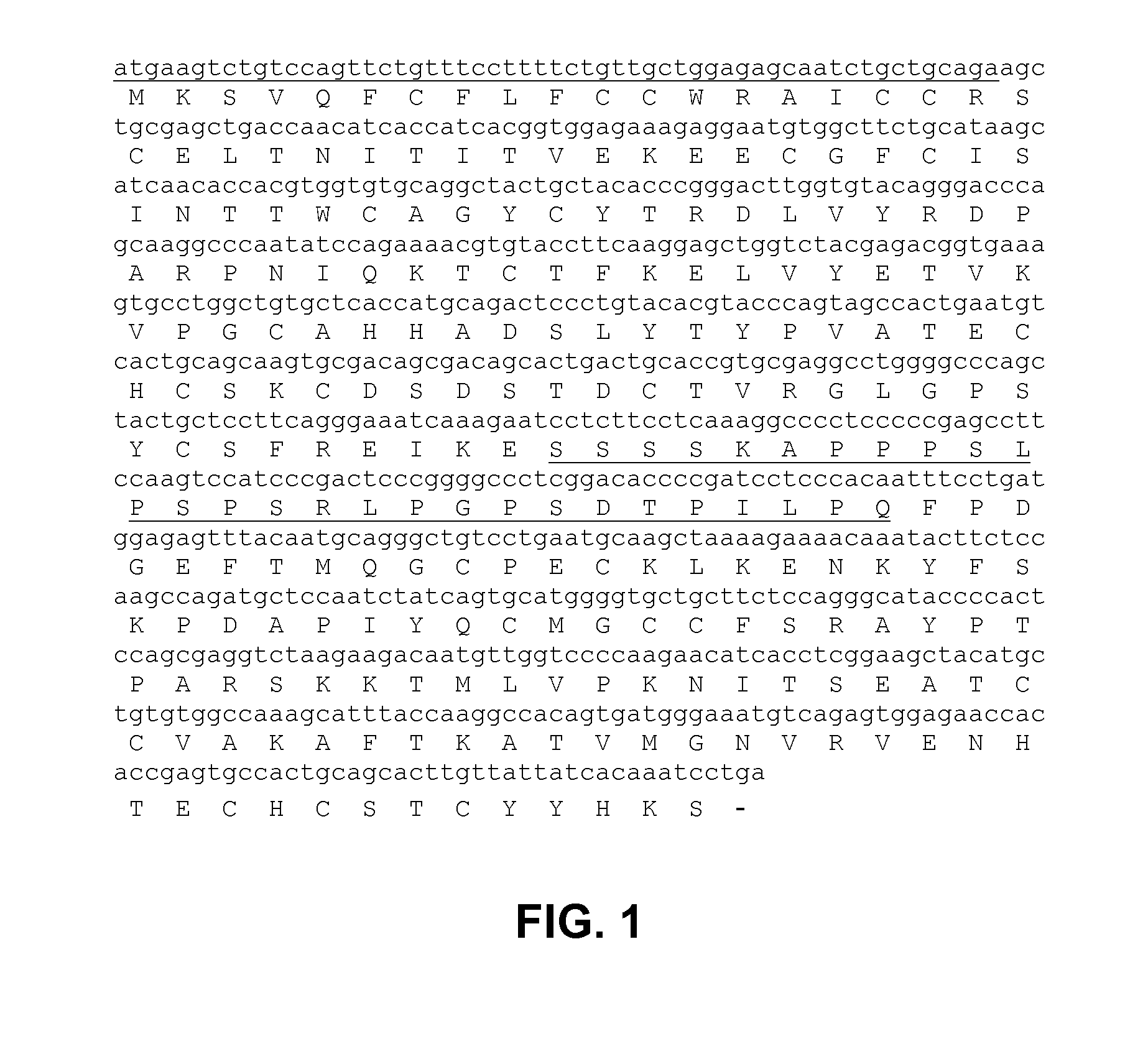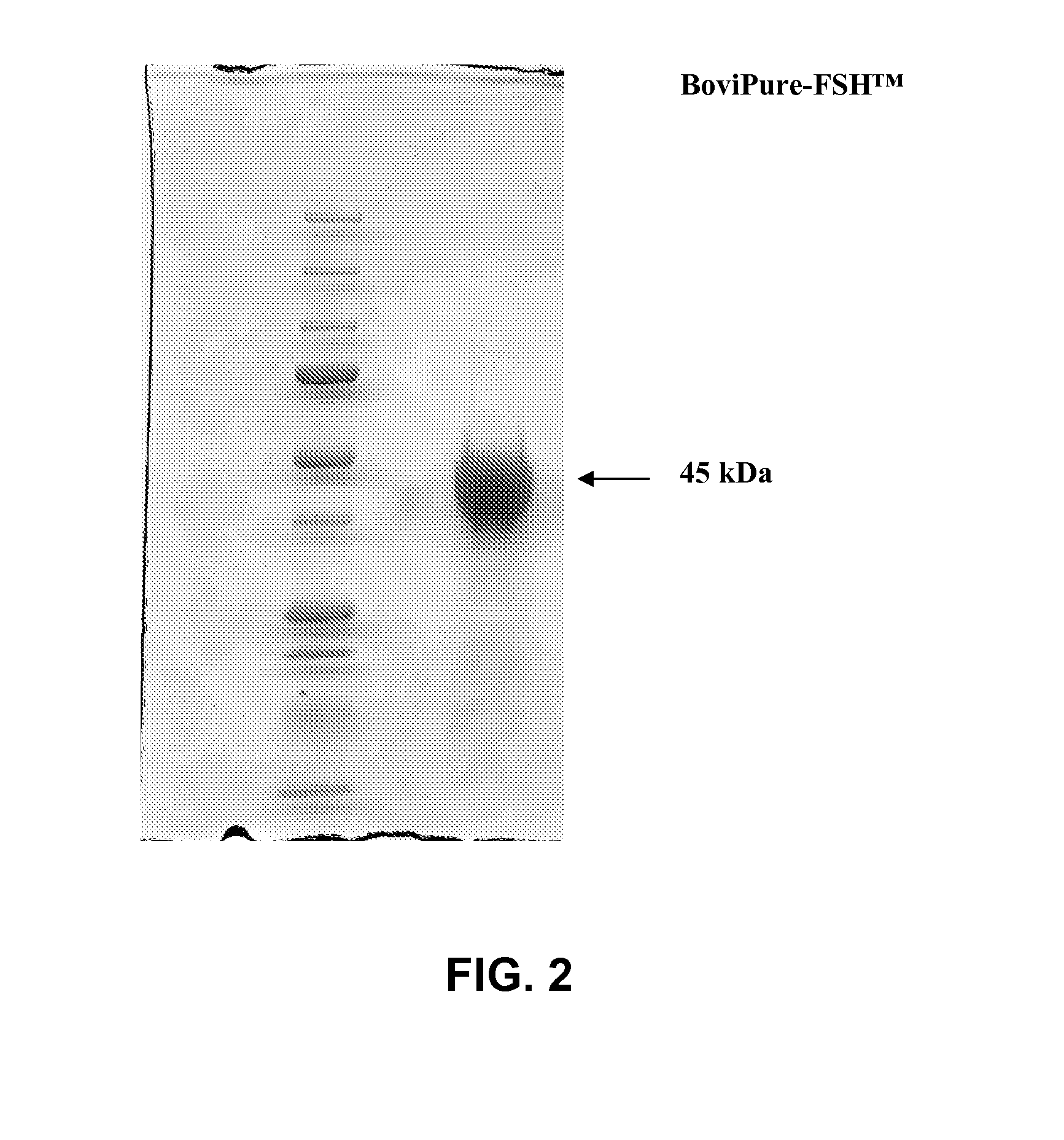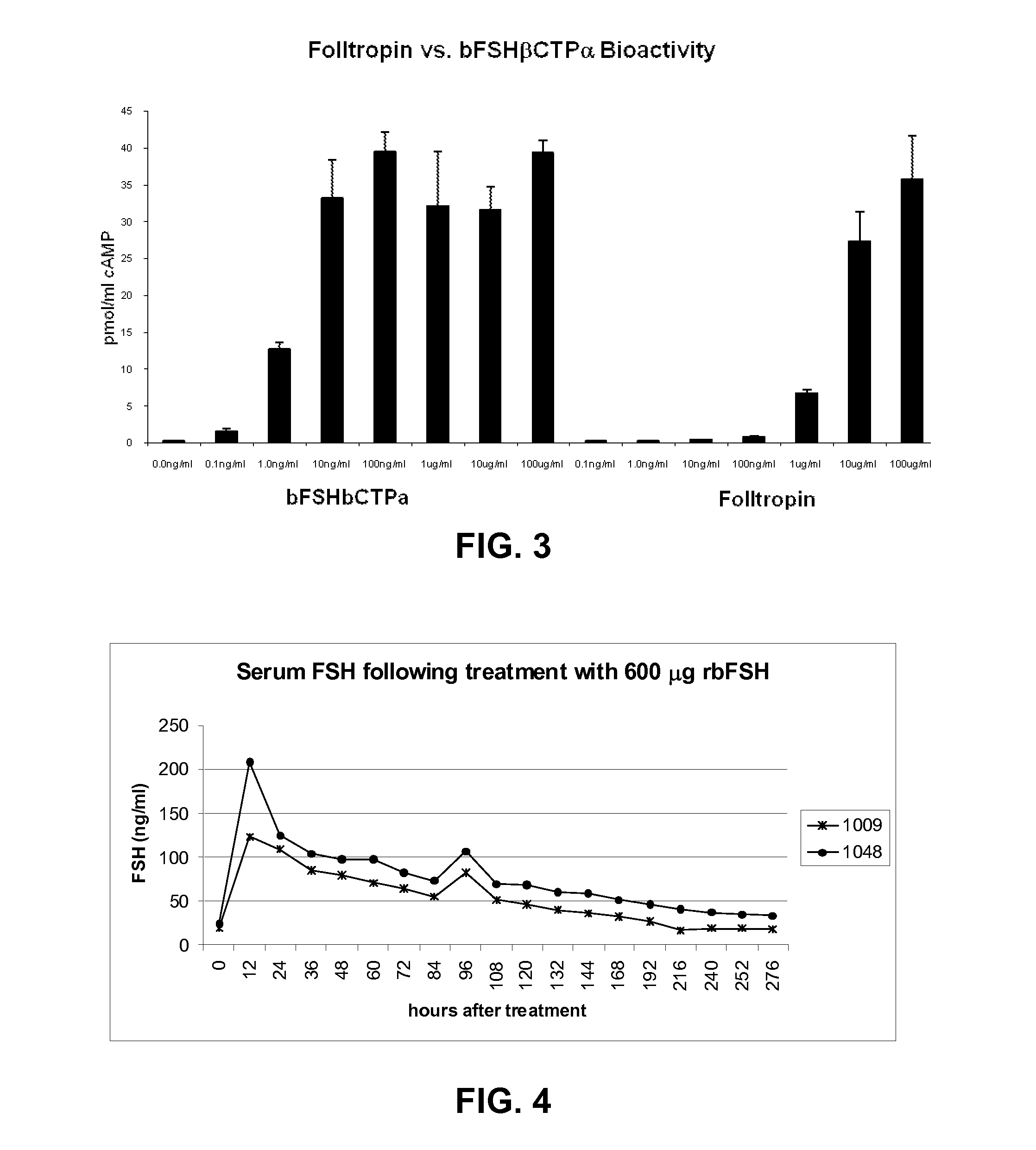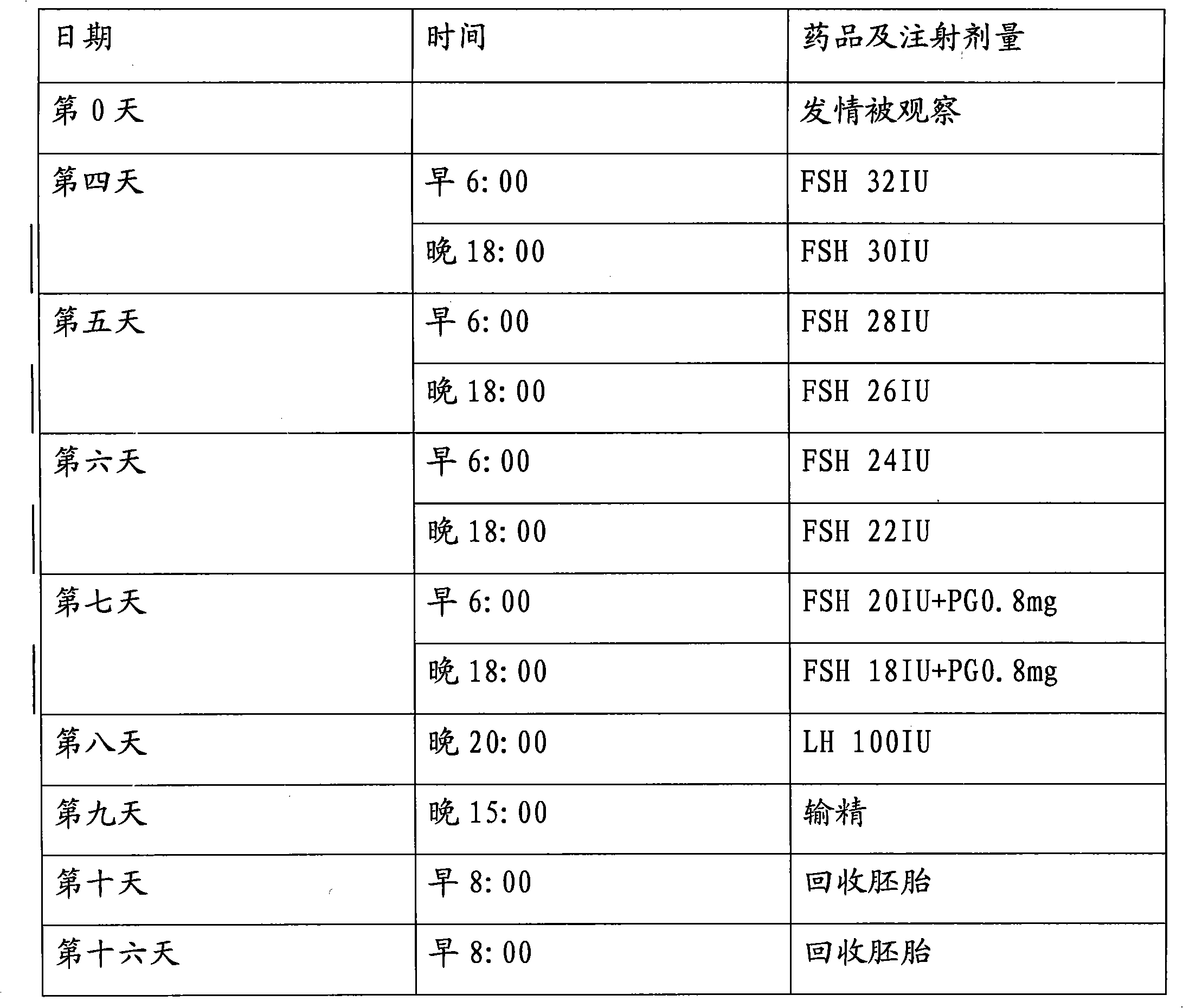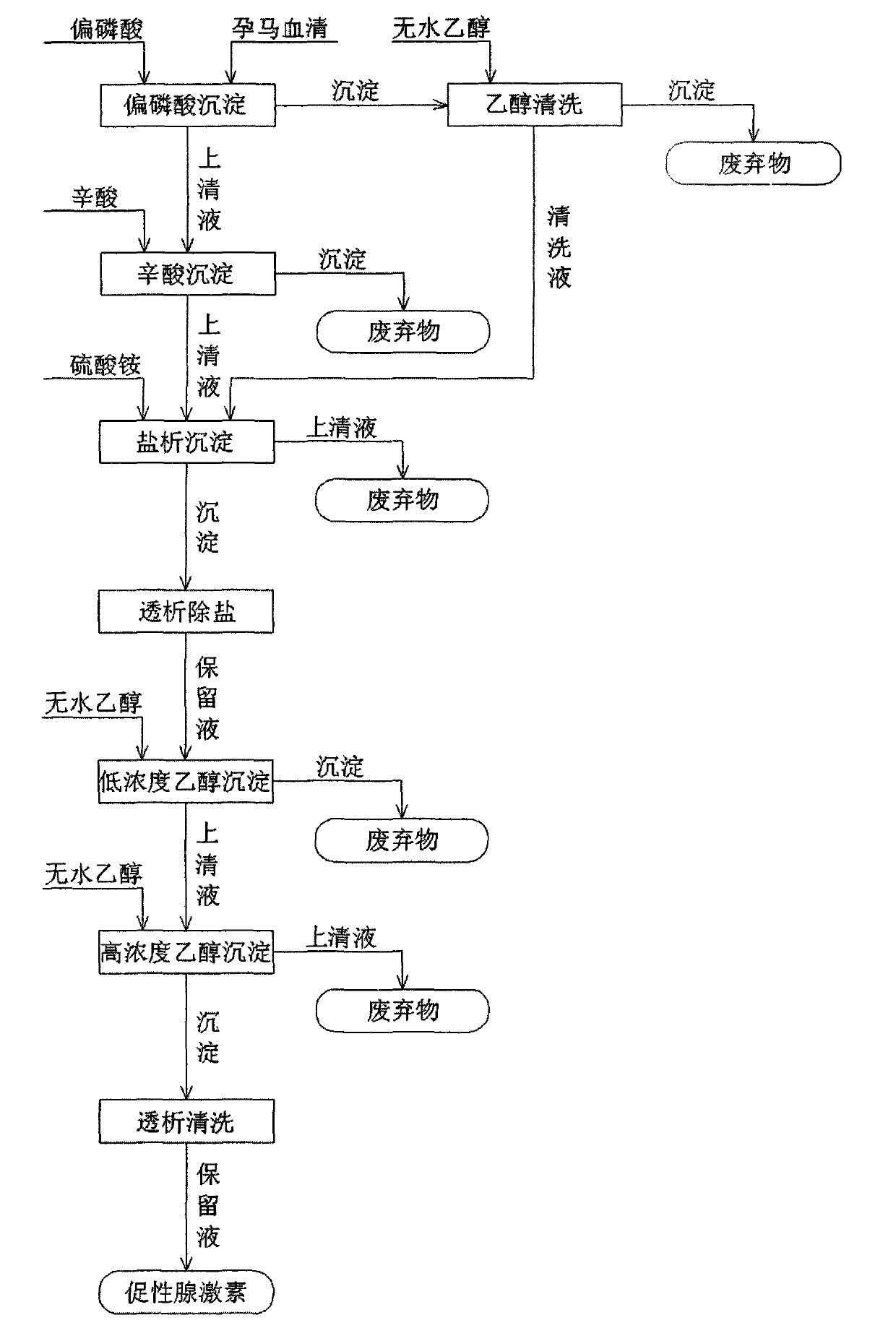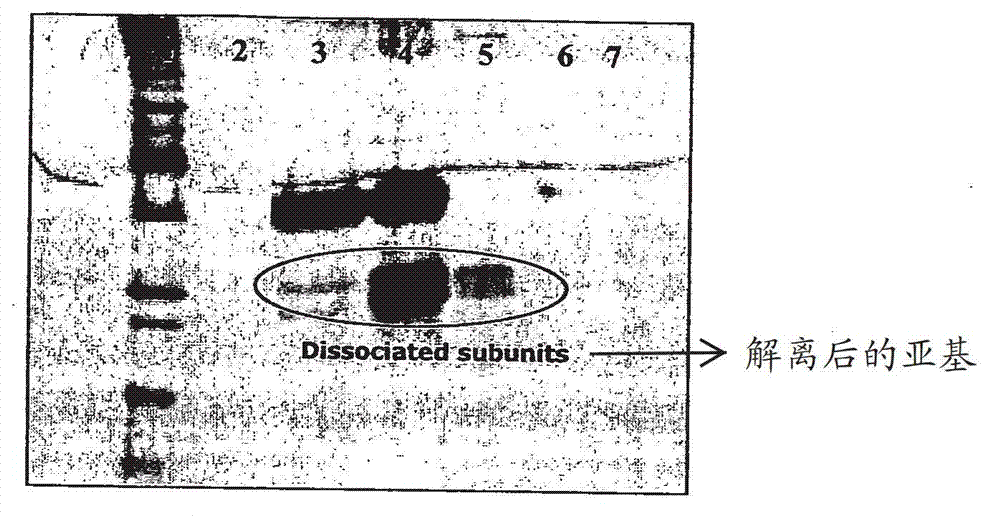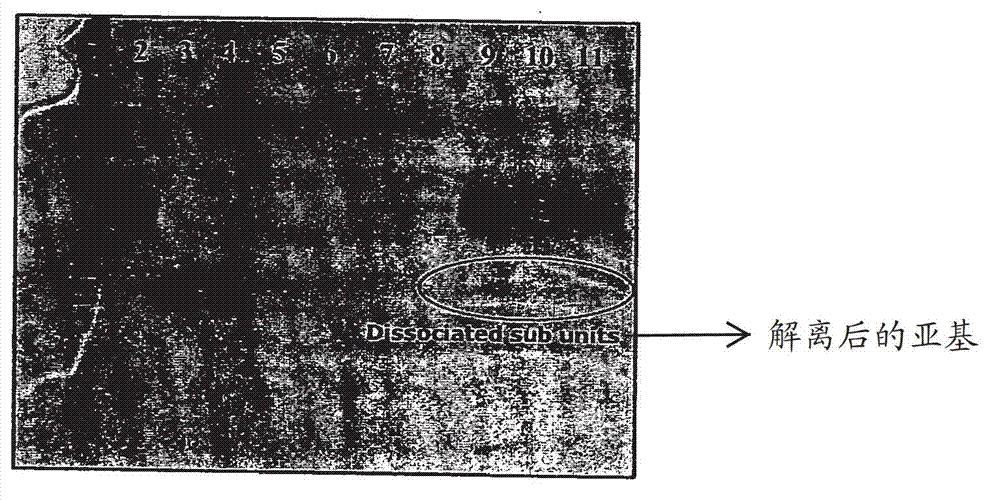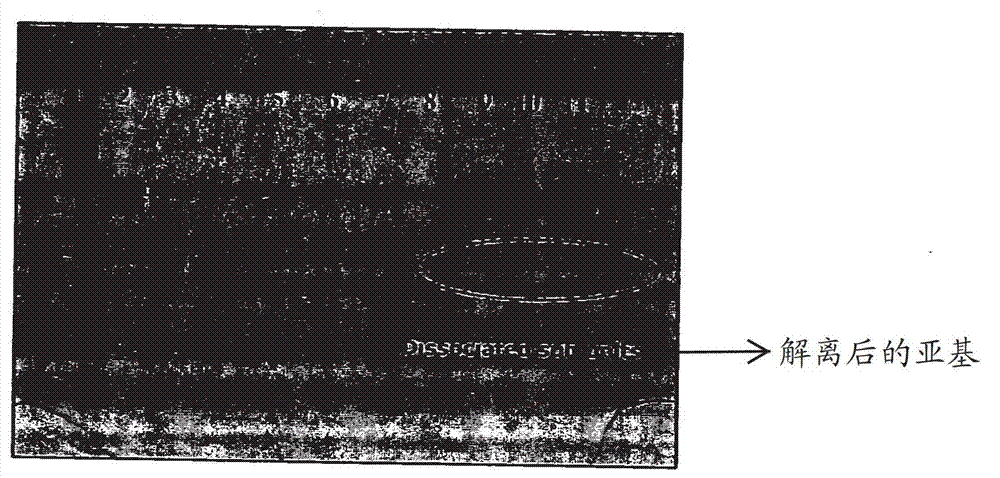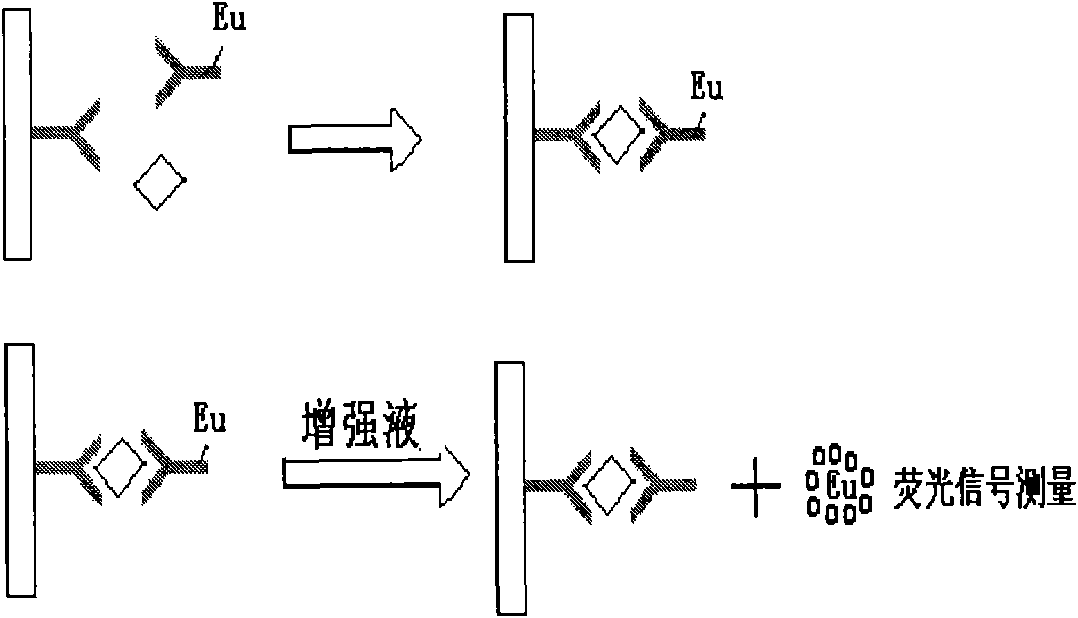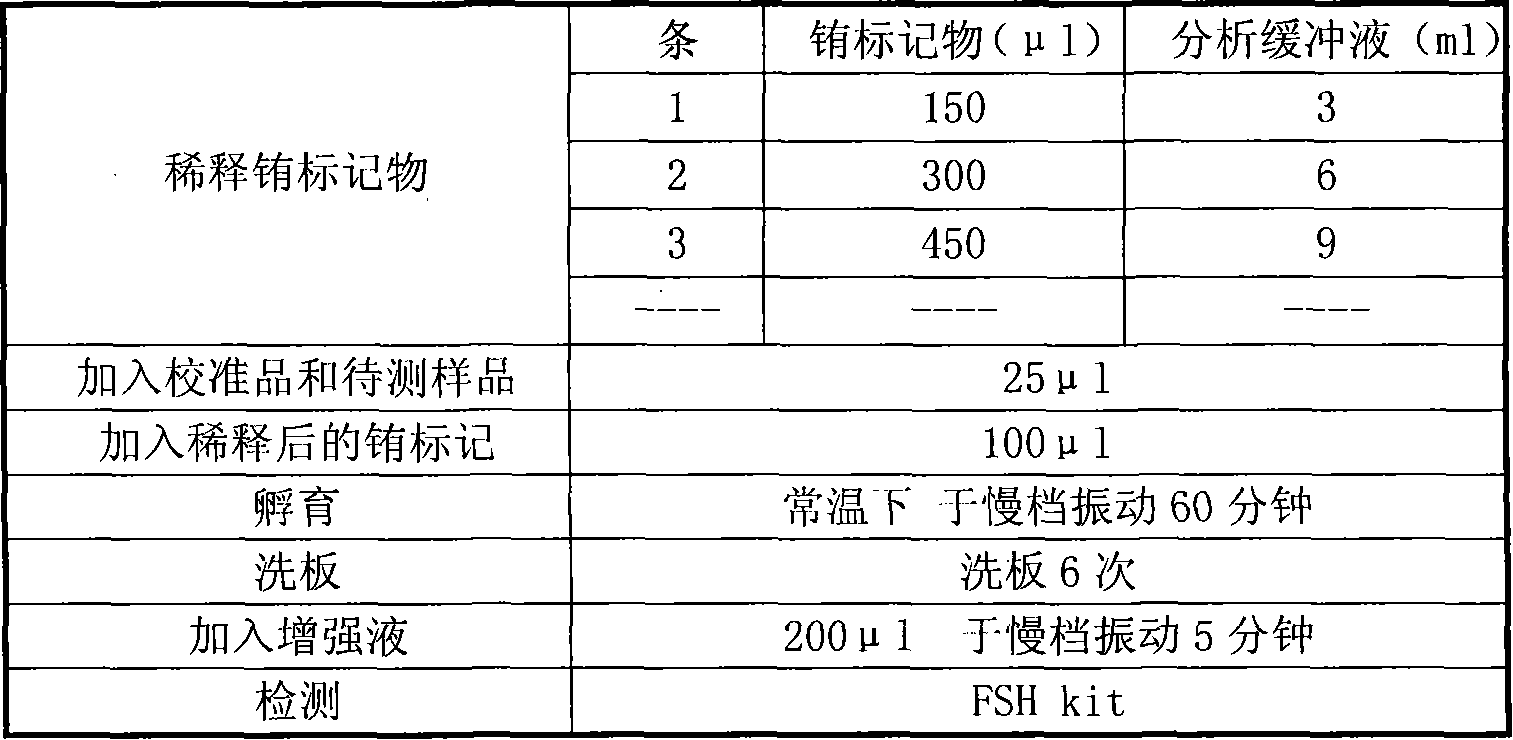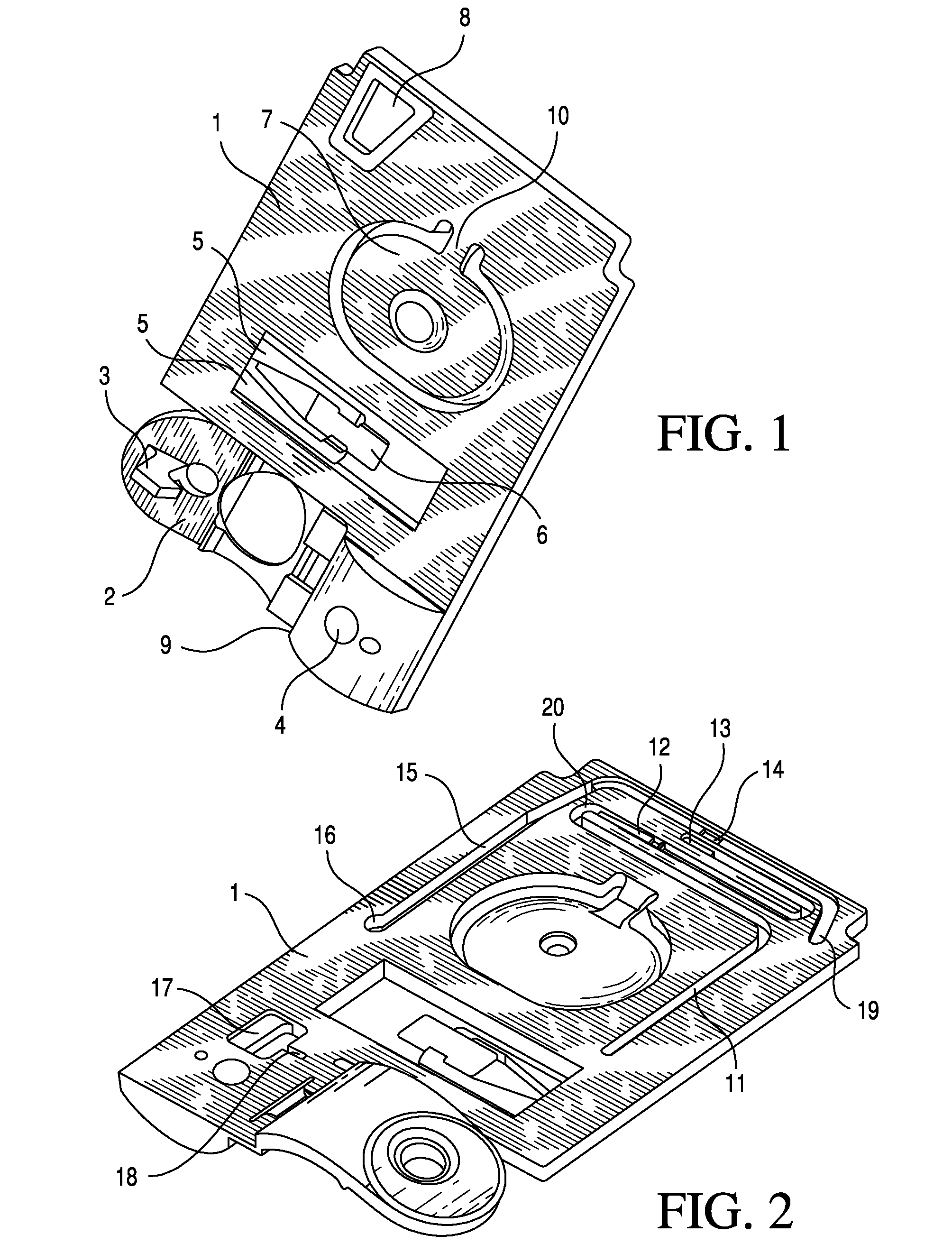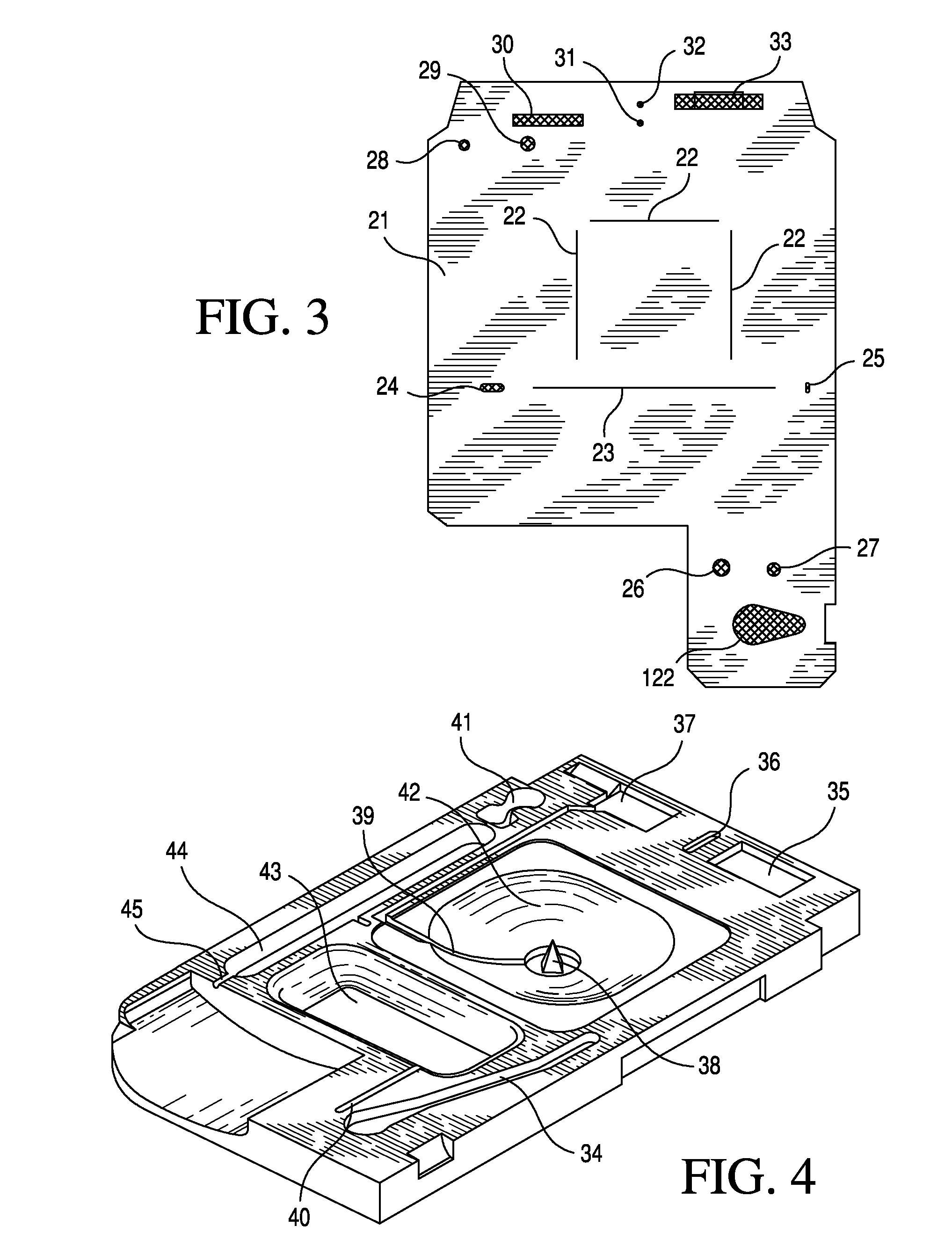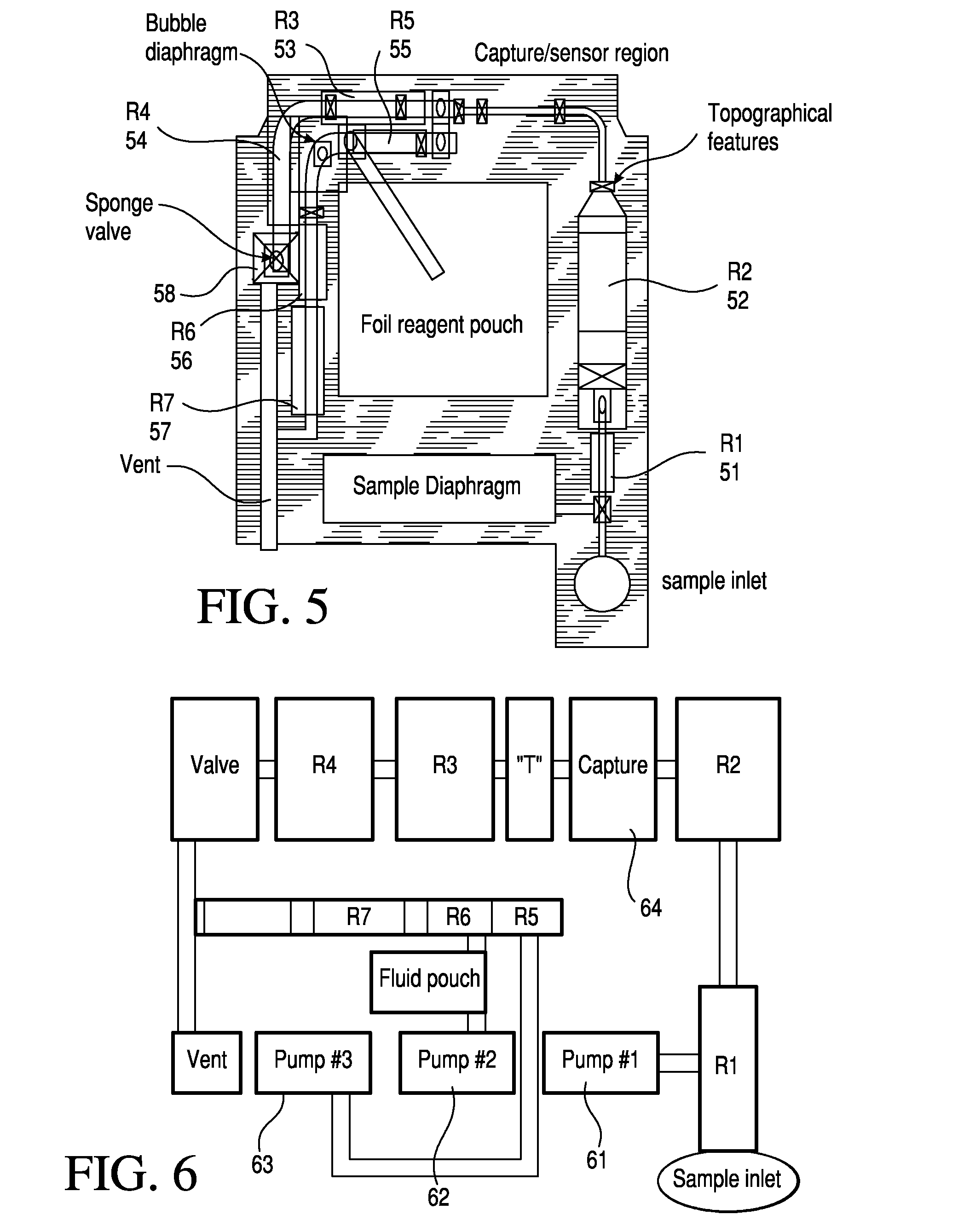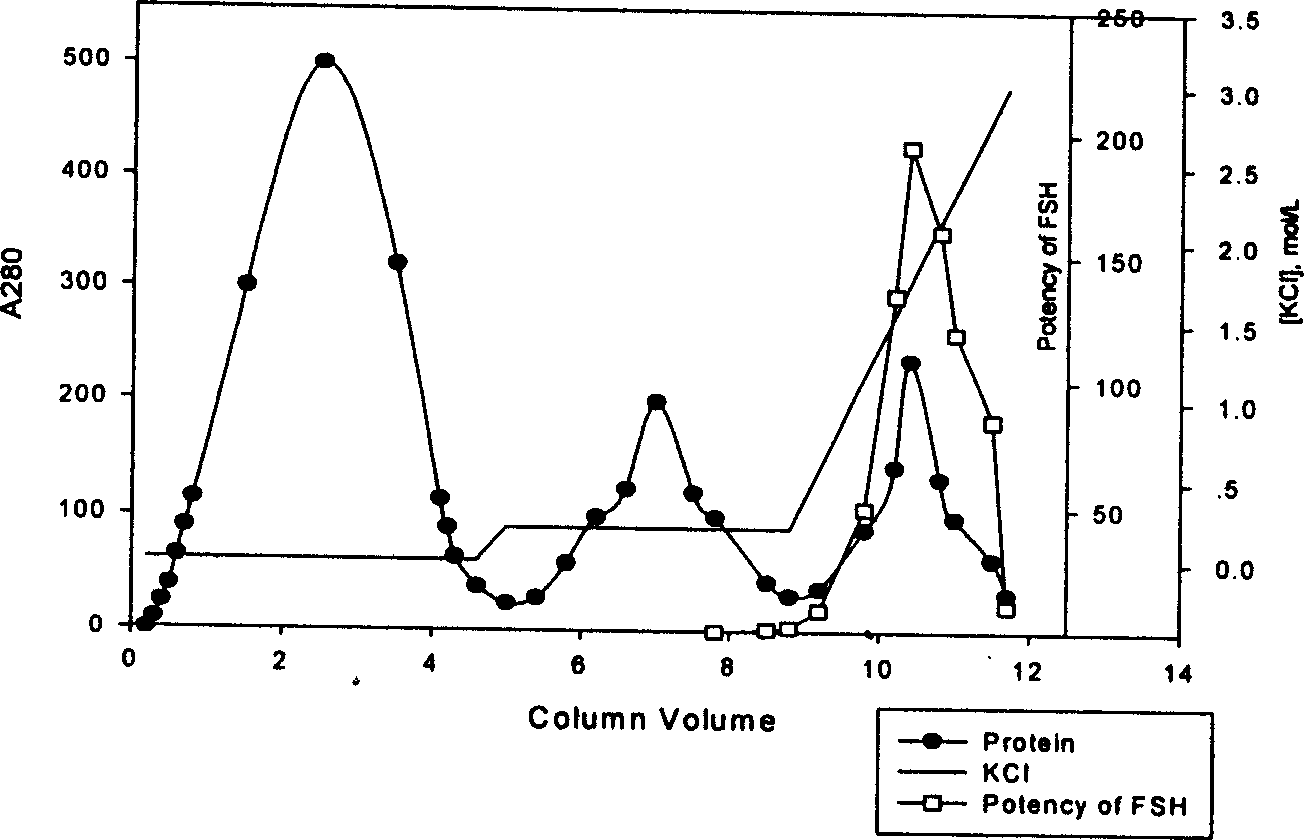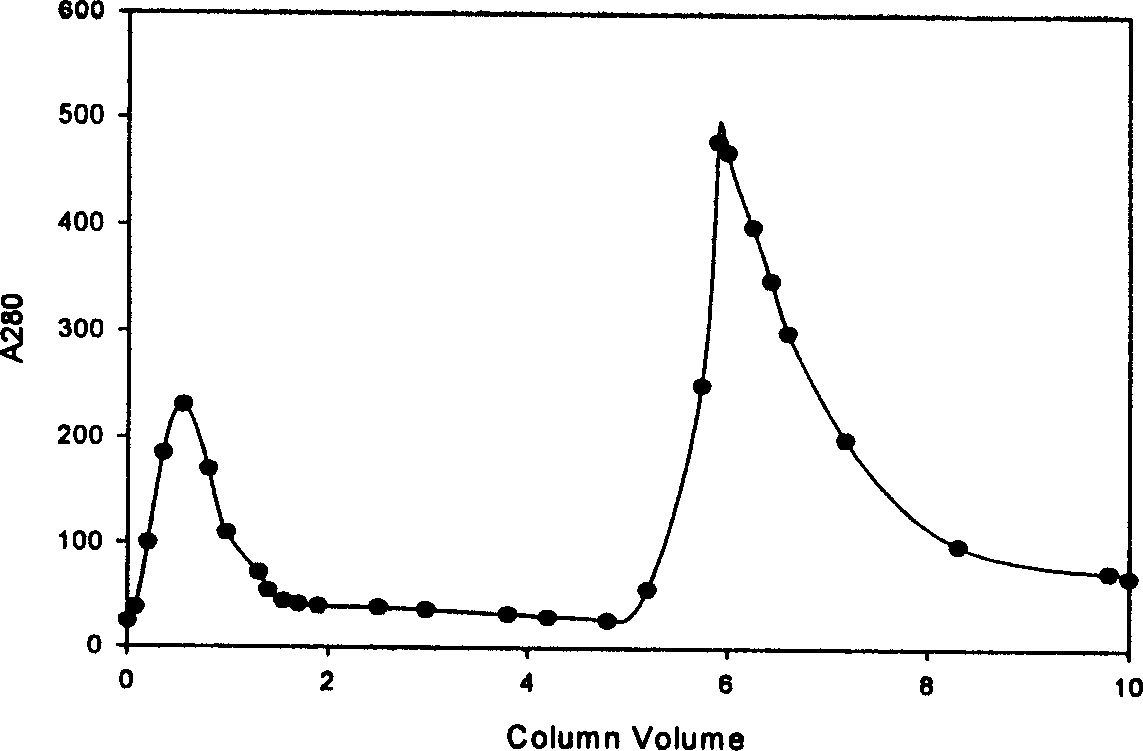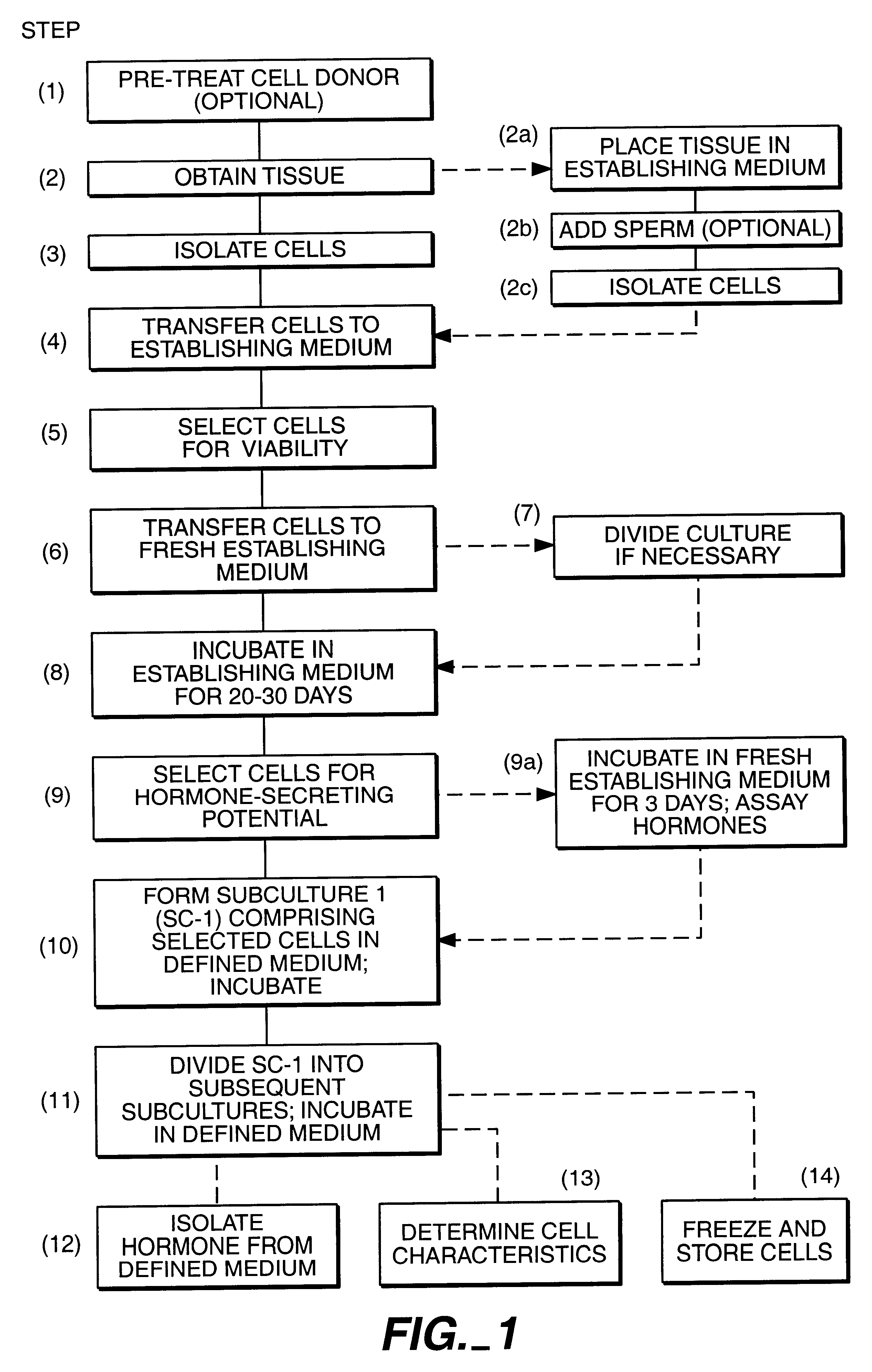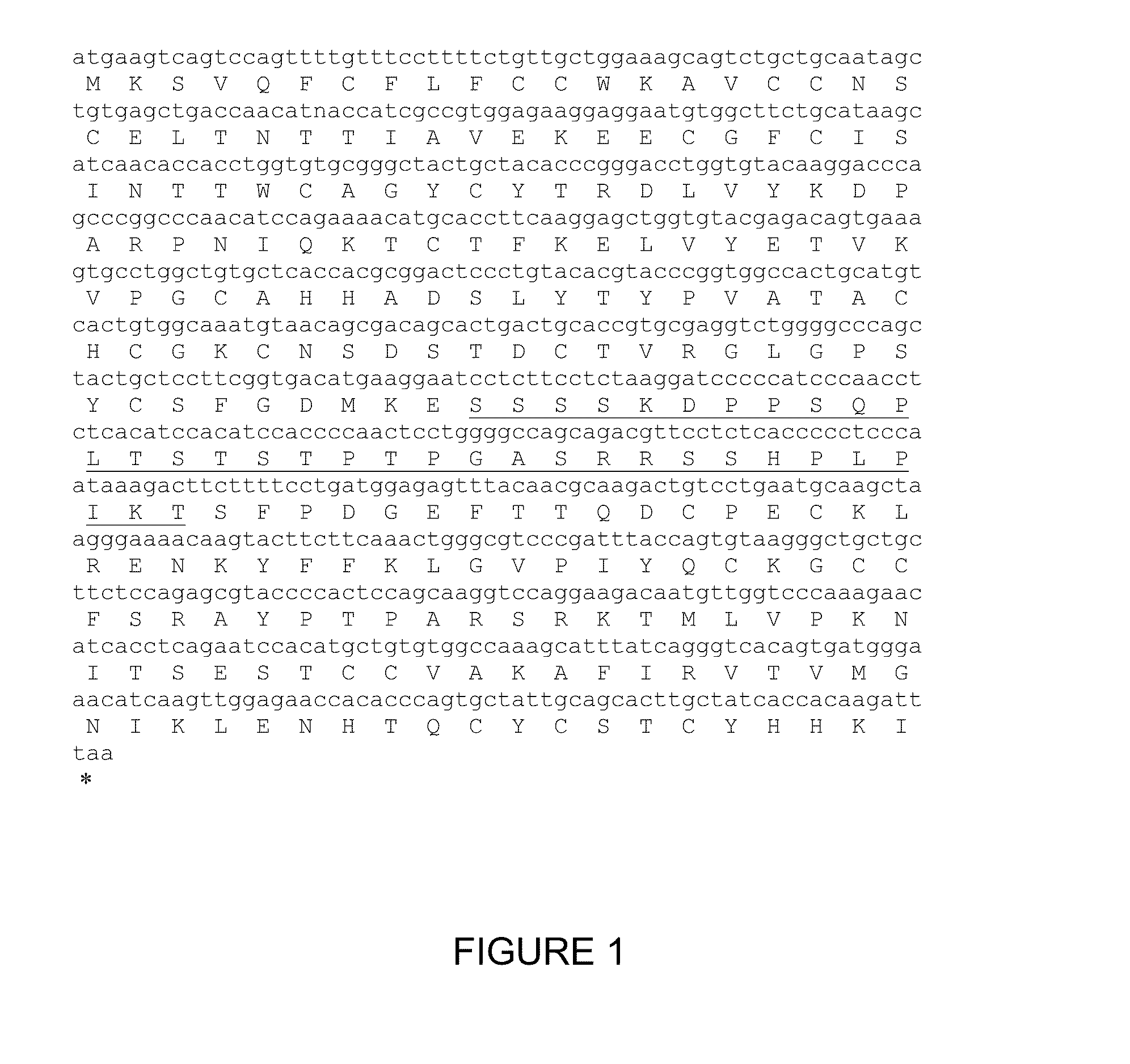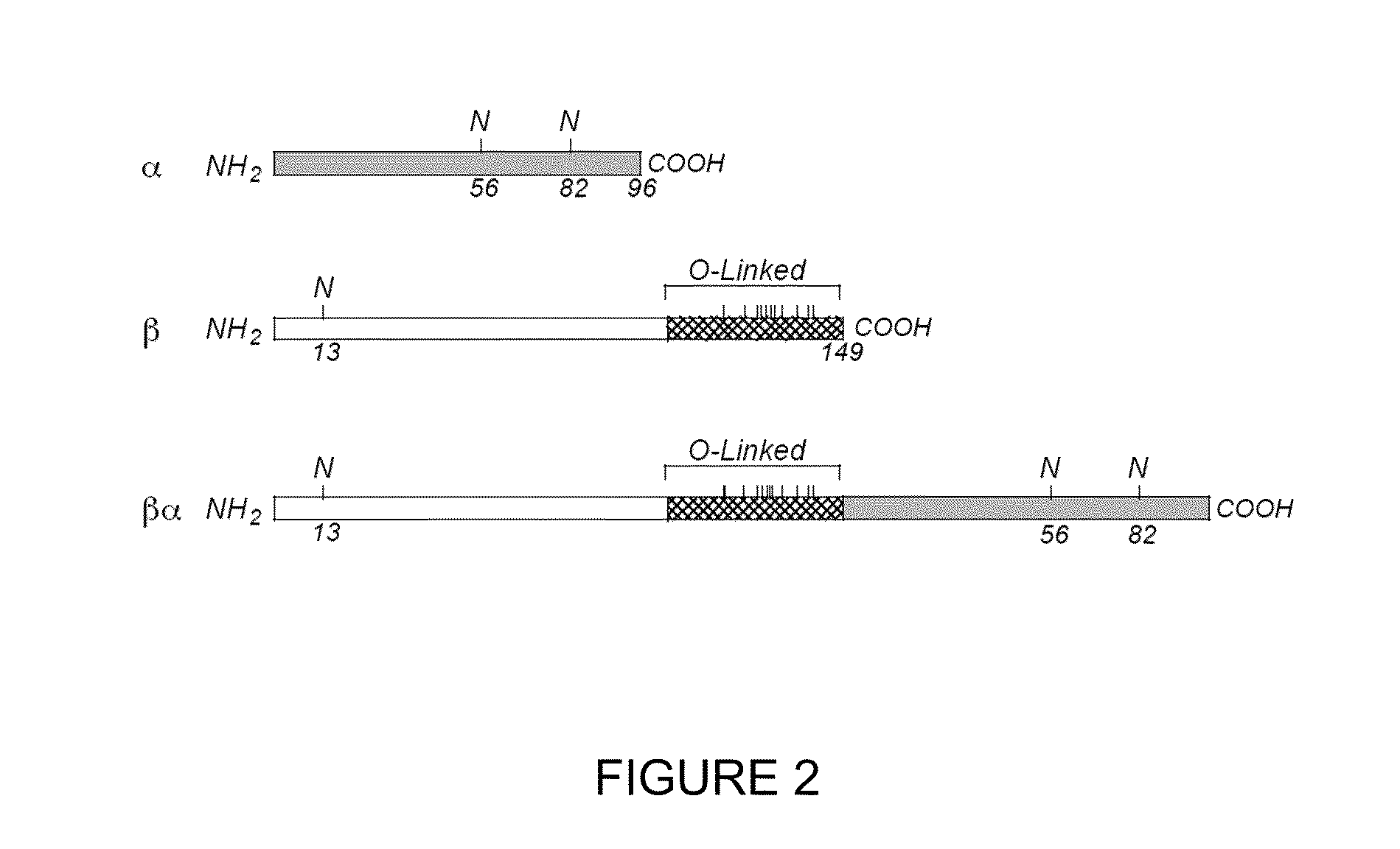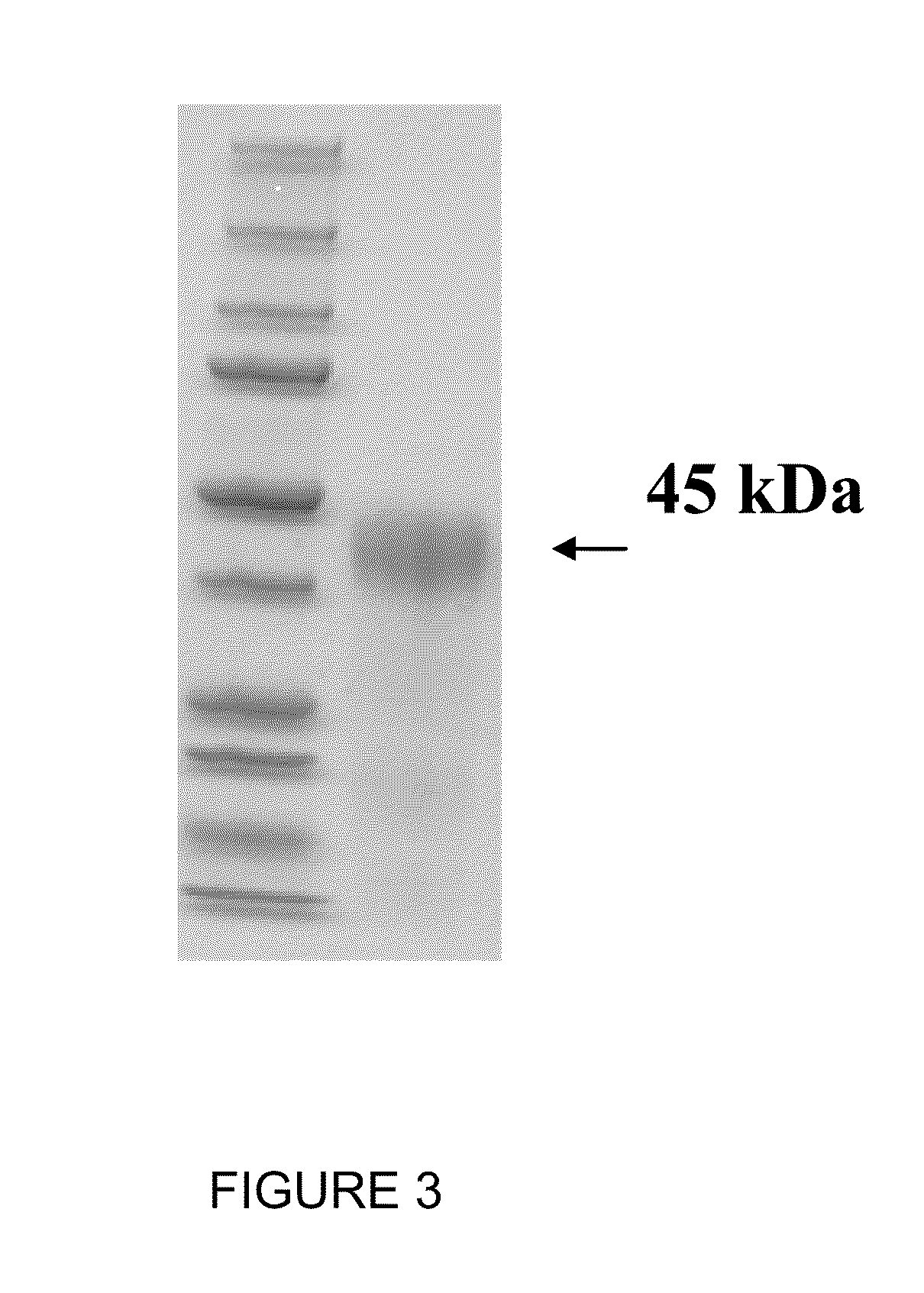Patents
Literature
150 results about "Follicle-stimulating hormone" patented technology
Efficacy Topic
Property
Owner
Technical Advancement
Application Domain
Technology Topic
Technology Field Word
Patent Country/Region
Patent Type
Patent Status
Application Year
Inventor
Follicle-stimulating hormone (FSH) is a gonadotropin, a glycoprotein polypeptide hormone. FSH is synthesized and secreted by the gonadotropic cells of the anterior pituitary gland, and regulates the development, growth, pubertal maturation, and reproductive processes of the body. FSH and luteinizing hormone (LH) work together in the reproductive system.
Glycopegylated Follicle Stimulating Hormone
InactiveUS20080015142A1BioavailabilityImproved pharmacokinetic propertiesBiocideOrganic active ingredientsFollicle-stimulating hormoneSugar moiety
The present invention provides conjugates between follicle stimulating hormone and PEG moieties. The conjugates are linked via an intact glycosyl linking group that is interposed between and covalently attached to the peptide and the modifying group. The conjugates are formed from both glycosylated and unglycosylated peptides by the action of a glycosyltransferase. The glycosyltransferase ligates a modified sugar moiety onto either an amino acid or glycosyl residue on the peptide. Also provided are pharmaceutical formulations including the conjugates. Methods for preparing the conjugates are also within the scope of the invention.
Owner:NOVO NORDISK AS
FSH mimetics for the treatment of infertility
InactiveUS6653338B2Easy to useMinimal supervisionBiocidePeptide/protein ingredientsFollicle-stimulating hormoneTreatment infertility
"The present invention provides non-peptidic amino derivatives, their therapeutic use as well as pharmaceutical compositions that possess activity as Follicle Stimulating Hormone (FSH) agonists and are useful in the treatment of infertility. In particular, the invention provides derivatives."
Owner:MERCK SERONO SA
Polymer-based compositions for sustained release
InactiveUS20040028733A1Reduced activityReduce aggregationPowder deliveryPeptide/protein ingredientsFollicle-stimulating hormoneSpermatogenesis
This invention relates to sustained release compositions, and methods of forming and using said compositions, in particular for the sustained release of Follicle Stimulating Hormone (FSH). The sustained release compositions comprise a polymeric matrix of a biodegradable biocompatible polymer and stabilized FSH. The method of the invention for forming a sustained release composition includes, dissolving a biodegradable biocompatible polymer in a polymer solvent to form a polymer solution; adding biologically active stabilized FSH; removing the solvent; and solidifying the polymer to form a polymer matrix containing stabilized FSH dispersed therein. Also described is a method for providing a therapeutically effective amount of stabilized FSH in a patient in need of for a sustained period comprising administering to the patient a dose of the sustained release compositions of the invention. The sustained release composition of FSH can be used to promote maturation of follicles, promote spermatogenesis and to treat fertility disorders.
Owner:MERCK SERONO INT
Heterodimeric follicle stimulating hormone-Fc (FSH-Fc) fusion proteins for the treatment of infertility
InactiveUS20050186662A1Extended half-lifeImprove fertilityBacteriaPeptide/protein ingredientsFollicle-stimulating hormoneIncreased fertility
The invention provides novel heterodimeric fusion proteins comprising a first polypeptide including an alpha subunit of FSH (αFSH) linked directly or indirectly to a binding partner of neonatal Fc receptor (FcRn) and a second polypeptide including a beta subunit of FSH (βFSH) linked directly or indirectly to an FcRn binding partner. In one embodiment the FcRn binding partner includes an Fc fragment of an immunoglobulin, e.g., an Fc fragment of IgG. Also provided are methods making and using the fusion proteins of the invention. The invention provides a method for increasing fertility in a subject and a method for treating a subject having a disease state responsive to treatment by FSH.
Owner:SYNTONIX PHARMA
Long-acting follicle stimulating hormone analogues and uses thereof
InactiveUS7202215B2Improve fertilityIncreasing a subject's spermatogenesisSugar derivativesPeptide/protein ingredientsFollicle-stimulating hormoneIncreased fertility
This invention provides FSH analogues having increased serum half-life relative to FSH. This invention also provides related compositions and methods for increasing fertility, egg production and spermatogenesis in a subject.
Owner:THE TRUSTEES OF COLUMBIA UNIV IN THE CITY OF NEW YORK
Process for the synchronization of ovulation for timed breeding without heat detection
InactiveUS20070197435A1Efficient methodPeptide/protein ingredientsDepsipeptidesSingle injectionBiology
A method for synchronizing ovulation in sows and gilts by a single injection of hormones is disclosed. A hormone, gonadotropin releasing hormone (GnRH), luteinizing hormone (LH), follicle stimulating hormone (FSH), human chorionic gonadotropin (hCG), analogues, derivatives, agonists or combinations thereof is administered to an open sow post weaning at a specific time to stimulate ovulation of mature responsive follicles. The sow is then bred, without heat detection, at a specific subsequent timed interval after injection with hormone, with one or two artificial or natural breedings. In gilts, the hormone is injected at a timed interval from onset of estrus or at a specific timed interval following Prostaglandin F2a for those gilts which have been held in a state of pseudopregnancy.
Owner:JBS UNITED
Long-acting follicle stimulating hormone analogues and uses thereof
InactiveUS7081446B2Improve fertilityIncreasing a subject's spermatogenesisHormone peptidesPeptide/protein ingredientsFollicle-stimulating hormoneIncreased fertility
This invention provides FSH analogues having increased serum half-life relative to FSH. This invention also provides related compositions and methods for increasing fertility, egg production and spermatogenesis in a subject.
Owner:THE TRUSTEES OF COLUMBIA UNIV IN THE CITY OF NEW YORK
Preservative-free follicle stimulating hormone solution delivery device
ActiveUS8361025B2Peptide/protein ingredientsAutomatic syringesFollicle-stimulating hormonePreservative free
A one-time use device to deliver preservative-free follicle stimulating hormone (FSH) solution is disclosed. The device includes a needle covered by a sliding needle shield, which covers the needle in all modes of the device. The device can be placed into a ready-to-use position in four or fewer user steps. The device has a knob for setting a desired dose of FSH. The knob includes longitudinally spaced elements respectively corresponding to the lock position and the seven or fewer discrete dosing positions. The device locks after one use and cannot be reused thereafter.
Owner:SHL MEDICAL AG
Preservative-Free Follicle Stimulating Hormone Solution Delivery Device
ActiveUS20120265136A1Peptide/protein ingredientsAutomatic syringesFollicle-stimulating hormonePreservative free
A one-time use device to deliver preservative-free follicle stimulating hormone (FSH) solution is disclosed. The device includes a needle covered by a sliding needle shield, which covers the needle in all modes of the device. The device can be placed into a ready-to-use position in four or fewer user steps. The device has a knob for setting a desired dose of FSH. The knob includes longitudinally spaced elements respectively corresponding to the lock position and the seven or fewer discrete dosing positions. The device locks after one use and cannot be reused thereafter.
Owner:SHL MEDICAL AG
System for assessing ovarian reserve functions in subjects
ActiveCN109602394AReasonable arrangementAccurate assessmentUltrasonic/sonic/infrasonic diagnosticsHealth-index calculationFollicle-stimulating hormonePhysiology
The present invention relates to a system for assessing ovarian reserve functions in subjects. The system for assessing the ovarian reserve functions of the subjects comprises a data acquisition module used for obtaining data of a subject's age, an anti-Mullerian hormone (AMH) level, a follicle stimulating hormone (FSH) level and antral follicle counting (AFC); and a module for calculating the ovarian reserve functions used for calculating information obtained in the data acquisition module to calculate a probability (p) of subject's ovarian hyporesponsiveness. Further, a relationship betweenthe predicted ovarian hyporesponsiveness probability and a medicine dose of an ovulation-promoting medicine is predicted to divide populations into four groups in order to group closes ovarian responsiveness into one group.
Owner:GUANGZHOU KANGRUN BIOTECHNOLOGY CO LTD
Follicle-stimulating hormone (FSH)/lytic domain fusion constructs and methods of making and using same
InactiveUS20140161767A1Reduce and inhibit spreadReduce and inhibit and disseminationBacteriaPeptide/protein ingredientsFollicle-stimulating hormoneAberrant cell
The invention relates to fusion constructs, methods of using fusion constructs and methods of treating undesirable or aberrant cell proliferation or hyperproliferative disorders, such as tumors, cancers, neoplasia and malignancies.
Owner:BOARD OF SUPERVISORS OF LOUISIANA STATE UNIV & AGRI & MECHANICAL COLLEGE +1
Process for the synchronization of ovulation for timed breeding without heat detection
ActiveUS20050130894A1Efficient methodAnimal reproductionPeptide/protein ingredientsOvulation timesSingle injection
A method for synchronizing ovulation in sows and gilts by a single injection of hormones is disclosed. A hormone, gonadotropin releasing hormone (GnRH), luteinizing hormone (LH), follicle stimulating hormone (FSH), human chorionic gonadotropin (hCG), analogues, derivatives, agonists or combinations thereof is administered to an open sow post weaning at a specific time to stimulate ovulation of mature responsive follicles. The sow is then bred, without heat detection, at a specific subsequent timed interval after injection with hormone, with one or two artificial or natural breedings. In gilts, the hormone is injected at a timed interval from onset of estrus or at a specific timed interval following Prostaglandin F2a for those gilts which have been held in a state of pseudopregnancy.
Owner:THORN BIOSCI
Process for the synchronization of ovulation for timed breeding without heat detection
A method for synchronizing ovulation in sows and gilts by a single injection of hormones is disclosed. A hormone, gonadotropin releasing hormone (GnRH), luteinizing hormone (LH), follicle stimulating hormone (FSH), human chorionic gonadotropin (hCG), analogues, derivatives, agonists or combinations thereof is administered to an open sow post weaning at a specific time to stimulate ovulation of mature responsive follicles. The sow is then bred, without heat detection, at a specific subsequent timed interval after injection with hormone, with one or two artificial or natural breedings. In gilts, the hormone is injected at a timed interval from onset of estrus or at a specific timed interval following Prostaglandin F2a for those gilts which have been held in a state of pseudopregnancy.
Owner:JBS UNITED +1
Process for the synchronization of ovulation for timed breeding without heat detection
A method for synchronizing ovulation in sows and gilts by a single injection of hormones is disclosed. A hormone, gonadotropin releasing hormone (GnRH), luteinizing hormone (LH), follicle stimulating hormone (FSH), human chorionic gonadotropin (hCG), analogues, derivatives, agonists or combinations thereof is administered to an open sow post weaning at a specific time to stimulate ovulation of mature responsive follicles. The sow is then bred, without heat detection, at a specific subsequent timed interval after injection with hormone, with one or two artificial or natural breedings. In gilts, the hormone is injected at a timed interval from onset of estrus or at a specific timed interval following Prostaglandin F2a for those gilts which have been held in a state of pseudopregnancy.
Owner:THORN BIOSCI
Purification method of follicle stimulating hormone
ActiveCN101307103AHigh yieldMild conditionsPeptide/protein ingredientsDepsipeptidesFollicle-stimulating hormonePurification methods
The invention provides a method for preparing follicle-stimulating hormone FSH. The method comprises the steps as follows: (A) a raw material containing the FSH is contacted with an antibody, wherein, the raw material contains luteinizing hormone LH and / or chorionic gonadotropin CG as impurities, and the antibody is an antibody which specifically combines the LH and / or the CG but not crossly react with the FSH basically, thereby making the antibody form an antigen-antibody compound with the LH and / or the CG; (B) the formed antigen-antibody compound is removed from the raw material, thereby obtaining purified FSH. The invention also provides a method for preparing a drug composition containing the FSH.
Owner:SHANGHAI TECHWELL BIOPHARMACEUTICALS CO LTD
System for predicting number of oocytes obtained during ovarian stimulation of object
ActiveCN110491505ARealize individualized treatmentMechanical/radiation/invasive therapiesBiostatisticsFollicle-stimulating hormoneData acquisition
The invention relates to a system for predicting the number of oocytes obtained during ovarian stimulation of an object receiving a standard GnRH antagonist solution for ovulation induction. The system comprises a data acquisition module used for obtaining data of the anti-mullerian hormone (AMH) level, basal follicle stimulating hormone (FSH) level and antrum follicle count (AFC) of the object and a module used for predicting the number of the oocytes obtained during the ovarian stimulation and calculating the information obtained in the data acquisition module to calculate the number of theoocytes (NROs) obtained by the object.
Owner:湖南康晴生物科技有限公司
Development of follicle stimulating hormone agonists and antagonists in fish
InactiveUS20070281883A1Improve metabolic activityImprove stabilitySugar derivativesPeptide/protein ingredientsBiologyDisulfide bond
The invention provides recombinant forms of piscine follicle-stimulating hormone (FSH) with characteristic intramolecular disulfide bonds and modified glycosylation patterns in the β-subunit that enhance the stability and metabolic activity of the hormone. Also provided are recombinant materials to produce the FSH β and glycoprotein α-subunits singly or in combination to obtain complete heterodimeric hormone of regulated glycosylation pattern. The piscine FSH agonists of the invention are therapeutically useful to expedite the onset of puberty in captive fish and to alleviate reproductive dysfunctions in fish. Likewise, the piscine FSH antagonists of the invention will be therapeutically useful to halt gonadal development, thereby contributing to body weight gain of the fish,
Owner:FISHBREED
Urinary follicle stimulating hormone with high purity and preparation method thereof
ActiveCN101555279AHigh puritySimple methodPeptide/protein ingredientsDepsipeptidesFollicle-stimulating hormoneImpurity
Owner:SHANGHAI TECHWELL BIOPHARMACEUTICALS CO LTD
System for predicting probability of poor ovarian response of subject under antagonist regimen, and system for guiding selection of gonadotropin starting medication dose
ActiveCN110570952AEfficient forecastingDrop reserve functionDrug referencesFollicle-stimulating hormoneRegimen
The present invention relates to a system for predicting the probability of poor ovarian response of a subject under an antagonist regimen, and a system for guiding the selection of a gonadotropin starting medication dose. The system for predicting the probability of poor ovarian response includes: a data acquisition module for acquiring the age, the anti-Mullerian hormone (AMH) level, the follicle stimulating hormone (FSH) level, the antralfollicle count (AFC) data of the subject; and a module for calculating the probability of poor ovarian response, which is used for calculating the information obtained in the data acquisition module to calculate the probability of poor ovarian response of the subject, and giving a starting dose recommendation for exogenous gonadotropin (Gn) based on thepredicted probability of poor ovarian response.
Owner:GUANGZHOU KANGRUN BIOTECHNOLOGY CO LTD
Liquid pharmaceutical formulations of fsh and lh together with a non-ionic surfactant
ActiveCN1795012APeptide/protein ingredientsPharmaceutical non-active ingredientsFollicle-stimulating hormoneNon ionic
The present invention relates to the field of pharmaceutical preparations of follicle stimulating hormone (FSH), luteinizing hormone (LH) and mixtures of FSH and LH and methods for the production of these preparations. The present invention also provides liquid or lyophilized formulations of FSH, or LH, or FSH and LH, which contain a surfactant selected from Pluronic® F77, Pluronic F87, Pluronic F88 and Pluronic F68.
Owner:ARES TRADING SA
Female fertility test
InactiveUS20100311188A1Improve the level ofAnalysis using chemical indicatorsMicrobiological testing/measurementFollicle-stimulating hormoneProficiency testing
The present invention is related to a diagnostic test kit that assesses ovarian reserve by measuring Follicle Stimulating Hormone (FSH) in a liquid sample. The sample can be deposited on a first portion of the device for transport to a second portion of the device. The device can include a release medium formed of a first material and including a detectable label thereon and a capture medium, including a test site, in fluid communication with the release medium and formed of a second, different material.
Owner:CHURCH & DWIGHT CO INC
Compositions and methods including expression and bioactivity of bovine follicle stimulating hormone
ActiveUS20080312151A1Improve reproductive activityImproving superovulationPeptide/protein ingredientsImmunoglobulinsMammalEmbryo
The present invention provides methods of producing biologically active recombinant bFSH and methods of increasing reproduction in mammals, particularly bovine, using recombinant bFSH. Also provided are methods of producing single chain recombinant bFSH. The recombinant bFSH of the present invention increases superovulation, embryo development, and reproductive efficiency in cattle and other ungulates.
Owner:ASPENBIO PHARMA
Superovulation method for goats
InactiveCN102068322AShorten production timeLow production costAnimal reproductionFollicle-stimulating hormoneProgesterones
The invention discloses a superovulation method for goats. The superovulation method comprises the following steps of: selecting female goats which can be applied to superovulation; teasing in the morning and at the night every day; counting from day zero when oestrum is observed for the first time; injecting follicle stimulating hormone once in the morning and at the night on the fourth day, the fifth day, the sixth day and the seventh day respectively; injecting cloprostenol during the injection of the follicle stimulating hormone in the morning and at the night on the seventh day; injecting luteotropin on the eighth day; performing semen deposition through a laparoscope; and recycling a pronuclear embryo on the tenth day or collecting a mulberry body on the sixteenth day. A progesterone needing process in the conventional superovulation method for goats is eliminated, production time is shortened, and production cost is reduced; simultaneously, with the method, superovulation efficiency which is the same as that of the conventional superovulation method can be achieved and an experimental result of each batch indicates that each goat can obtain 8 to 30 embryos on average.
Owner:ANHUI AGRICULTURAL UNIVERSITY
Pregnant mare serum gonadotropin (PMSG) purifying method
ActiveCN103275206AIncrease the concentrationAdded cleaning stepsHormone peptidesPeptide preparation methodsHigh concentrationPhosphoric acid
The invention discloses a PMSG purifying method. The method comprises the steps of metaphosphoric acid precipitation, ethanol cleaning, caprylic acid precipitation, salting-out precipitation, dialysis desalting, low-concentration ethanol precipitation, high-concentration ethanol precipitation and dialysis cleaning. The addition of the caprylic acid precipitation step allows difficult-precipitation albumins and other macromolecular other proteins to precipitate, the salting-out precipitation step increases the ammonium sulfate adding concentration and avoids the albumin precipitation problem, and the increase of the ammonium sulfate addition concentration improves the precipitation proportions of PMSG active substances and also improves the precipitation proportions of follicle-stimulating hormone (FSH) active substances, so the PMSG purity is increased, and the PMSG recovery rate is also increased.
Owner:CHIFENG BOEN PHARMA
Liquid formulation of follicle stimulating hormone
InactiveCN102821782AInvolves simple operationPeptide/protein ingredientsInorganic non-active ingredientsFollicle-stimulating hormoneAndrology
Owner:INTAS BIOFARMASJUTIKALS
Follicle-stimulating hormone time-resolved fluoroimmunoassay method and kit
InactiveCN101614748AHigh analytical sensitivityShort detection timeBiological testingFluorescence/phosphorescenceFollicle-stimulating hormoneImmunofluorescence
The invention discloses a follicle-stimulating hormone (FSH) time-resolved fluoroimmunoassay method and a kit. The method comprises the following steps: selecting and using a monoclonal antibody against FSH as a coating antibody, and diluting sodium carbonate buffer solution to 1 to 10mu g / ml as coating liquid; matching FSH monoclonal antibody, labeling the FSH monoclonal antibody with a lanthanide iron, and taking the labeled FSH monoclonal antibody as a labeled antibody; diluting and using the reaction buffer solution according to a ratio of 1 to 20 during experiment; and on a reaction plate of the coating antibody, adding 25mu l of standard substance of FSH or sample to be detected and the diluted labeled antibody into each hole in turn, and carrying out fluorescence detection after hatching. The invention also provides the corresponding kit. The method and the kit have the advantages of high sensitivity, specificity and stability; and the high automated assay system can improve the speed of clinical examination result, greatly reduce human error and increase the reliability of detected result.
Owner:PERKINELMER MEDICAL DIAGNOSTICS PROD SHANGHAI
Tsh antibodies for point-of-care immunoassay formats
ActiveUS20120301896A1Interference minimizationBioreactor/fermenter combinationsBiological substance pretreatmentsPoint of careFollicle-stimulating hormone
The invention relates to antibody characteristics used to design a whole blood Point of Care Thyroid Stimulating Hormone (TSH) immunoassay using an ELISA sandwich assay lacking one or more wash steps between the antigen capture, detection antibody addition and substrate introduction steps. This invention exhibits low cross reactivity with biologically similar interfering cross reacting species, such as Follicle Stimulating Hormone (FSH), Luteinizing Hormone (LH) and Chorionic Gonadotropin (CG).
Owner:ABBOTT POINT CARE
Purifying and producing process for high purity follicle stimulating hormone in urine
InactiveCN1587276AHigh purityHigh recovery rate of activityDepsipeptidesPeptide preparation methodsFollicle-stimulating hormoneIon exchange
During the purification and production of high purity uric follicle stimulating hormone, red azo dye is coupled to Sepharose 4B as the medium of affinity separating and purifying uric follicle stimulating hormone, and through dye affinity chromatography, QAE ion exchange chromatography and other technological steps, high purity uric follicle stimulating hormone product is obtained from uric gonadotropin from post-menopause. The product produced based on the said technological process has biological potency not lower than 200 IU / mg and FSH / LH higher than 100, is white and soluble, and may be used directly in producing injection.
Owner:NANCHANG WANHUA BIOCHEM PHARMA
Hormone-secreting cells maintained in long-term culture
InactiveUS6372493B1Increased insulin secretionHigh glucose concentrationPeptide/protein ingredientsDiagnosticsCulture mediumsHuman chorionic gonadotropin
Methods are provided for the establishment and maintenance in long term culture of hormone secreting cells. Cells are derived from tumorous or non-tumorous animal or human tissues, including ovary, endometrium, trophoblast, pituitary, thyroid, and pancreas. The cells secrete into the culture medium hormones such as estrogens, progestins, follicle-stimulating hormone, luteinizing hormone, human chorionic gonadotrophin, thyroxin, glucagon, and insulin, depending on the tissue of origin of individual cell cultures. Contact with an appropriate secretogogue causes the cells to respond with increased hormone secretion. For instance, ovarian follicular cells respond to follicle-stimulating hormone with increased estrogen and progesterone secretion. Pancreatic cells respond to elevated glucose with increased insulin secretion. The cells proliferate in in vitro for up to one year or longer, during which time they retain their hormone-secretion profile. The cells may be frozen for storage, and retain their hormone-secretion profile after thawing. The cell cultures are useful for the production of human hormones, for the bio-assay of drugs such as therapeutic gonadotrophin, for the testing of drug efficacy and design, and for toxicity testing of drugs and chemicals. The cells may also be implanted in an individual to replace deficient hormone secretion. For instance, insulin secreting pancreatic cells may be implanted in a diabetic individual as an adjunct or replacement therapy for exogenously administered insulin.
Owner:PACIFIC BIOMEDICAL RES INC
Activity of recombinant equine follicle stimulating hormone
ActiveUS20100120677A1Improve reproductive efficiencyPromote reproductionPeptide/protein ingredientsImmunoglobulinsMammalEmbryo
The present invention provides methods of producing biologically active recombinant eFSH analogs and methods of increasing reproduction in mammals, particularly equine, using recombinant eFSH analogs. Also provided are methods of producing biologically active single chain recombinant eFSH. The recombinant eFSH analogs of the present invention increase superovulation, follicular development, embryo development, and reproductive efficiency in horses, cattle and other ungulates.
Owner:RGT UNIV OF CALIFORNIA +2
Features
- R&D
- Intellectual Property
- Life Sciences
- Materials
- Tech Scout
Why Patsnap Eureka
- Unparalleled Data Quality
- Higher Quality Content
- 60% Fewer Hallucinations
Social media
Patsnap Eureka Blog
Learn More Browse by: Latest US Patents, China's latest patents, Technical Efficacy Thesaurus, Application Domain, Technology Topic, Popular Technical Reports.
© 2025 PatSnap. All rights reserved.Legal|Privacy policy|Modern Slavery Act Transparency Statement|Sitemap|About US| Contact US: help@patsnap.com
